


























The Olympics are here. And it’s good I told you, because most of us aren’t even aware – or even care – that they’re in progress. But for the 11,000 athletes who are in Paris for the competition, the Games are pretty important. They’ve been training and practicing and losing out on sleep and important events just to get to this moment. And it’s finally here.
But out of the thousands of competitors, only a few will go down in history books. And I wonder: are the others failures? They worked toward this goal, only to fall short at the last minute. Do they view themselves as disappointments for not managing to earn the gold?
Success is subjective. How do you define success? Do you define success as the achievement of a specific goal? Or is success the work that goes into working your way towards that goal, pushing towards it, overcoming obstacles and challenges along the way? Is success about becoming the best “you” that you can be? Or do you only define success as being the best in comparison to others?
When I look at these athletes, I see disappointment when they fail to win a match or an
event. But I also see pride. I see pride in themselves and in their country. Pride in pushing themselves to the max. Pride in their sleepless nights. Pride in overcoming the obstacles that lined the way. Pride in the achievements that they made and the strides that they attained. Pride in looking back and seeing where they came from and where they are today.
Our society has become one in which we’ve become conditioned to compare ourselves to others when we want to view our successes. But true success is your own, personal success. It’s success in the things that you did – and not defined by the successes of those around you. It’s about celebrating the strides that you made and the obstacles that you overcome. And truly, only you know the struggles that you met and conquered. Only you know the fears that you made you doubt your goals. And only you know how much work it took to get to this point. And so, only you can truly know and feel that success once it’s come.
Even if it didn’t come with a gold medal.
Wishing you a wonderful week,
Shoshana

Yitzy Halpern, PUBLISHER publisher@fivetownsjewishhome.com
Yosef Feinerman, MANAGING EDITOR ads@fivetownsjewishhome.com
Shoshana Soroka, EDITOR editor@fivetownsjewishhome.com
Nate Davis
Editorial Assistant
Nechama Wein
Copy Editor
Rachel Bergida Shana Brecher
Lani White
Design & Production
Gabe Solomon Distribution & Logistics
P.O. BOX 266
Lawrence, NY 11559
Phone | 516-734-0858
Fax | 516-734-0857
Classified Deadline: Monday 5:00PM classifieds@fivetownsjewishhome.com text 443-929-4003
PAYMENT VIA CREDIT CARD MUST BE SUBMITTED ALONG WITH CLASSIFIED ADS
The Jewish Home is an independent weekly magazine. Opinions expressed by writers are not necessarily the opinions of the publisher or editor. The Jewish Home is not responsible for typographical errors, or for the kashrus of any product or business advertised within. The Jewish Home contains words of Torah. Please treat accordingly.











Dear Editor,
I read your outstanding newspaper on a regular basis. Although I read it cover to cover, the letters to the editor always pique my interest the most. We live in a country of free speech, and it is fair for both sides of an issue to express their opinions. I am a Trumpster and although I might not agree with everything he says, I have no doubt that he is our only hope for good outcomes of all the major problems that are currently facing the USA. I have no doubt that he is a true friend to Israel as he demonstrated during his first term as president. As a Jew and a Zionist, my primary concerns are for Israel and the Jewish people. Anybody who ignores the current dangers of antisemitism and anti-Zionism has their head in the sand. Prime Minister Netanyahu expressed these dangers loud and clear in his recent speech to Congress. Many who should have been there to hear him speak chose to be absent. They choose to ignore that the enemies of Israel are the enemies of USA. They choose to ignore that of the more than one hundred hostages still languishing in Gaza for nine months, at least six are American citizens. Where is the outrage? The silence is deafening. And furthermore, since when is it “okay” to burn the American flag without repercussions?
Since when is it “okay” to replace an American flag with a Palestinian flag in a public domain without consequences? Since when is it “okay” to deface public property with impunity?
I am waiting impatiently to hear what punishments will befall the easily identifiable individuals who carried out these
heinous actions during Prime Minister Netanyahu’s address to Congress. Where was the outrage from President Biden and/or Vice President Harris? Are these treasonous acts now considered an acceptable mode of “peaceful” protest? Please don’t wake me up until this horrific nightmare ends on November 5 when we can celebrate Trump’s victory in the presidential election. The alternative is terrifying.
Just one person’s opinion. You are entitled to yours.
L.S.
Dear Editor,
I enjoy reading The Jewish Home However, the July 18th issue featured a Veepstakes Trivia with an incorrect answer.
The answer, George W. Bush, was listed as the answer to Question 2: Who is the only vice president in the 20th century who was elected to the presidency upon the completion of his vice presidential term?
The correct answer is George H. W. Bush, our 41st President, who served as President Ronald Reagan’s Vice President. His son George W. Bush, the 43rd President, was formerly the Governor of Texas but never served as Vice President. Sincerely, David S. Sanders
Dear Editor,
After reading the responses to my factual letter that were met with lies and personal insults, I feel I must respond. First, it is obvious that fellow readers Jason Stark, Jack Brody, and especially
Continued on page 12

Continued from page 10
Daniel Feldman are either incapable of reading or have simply refused to read the link I provided in my letter from Dr. Kevin O’Connor, a duly licensed physician detailing the results of President Biden’s most recent physical. I would love to read the results of a similar physical conducted by an accredited doctor as to the physical, neurological, and mental wellbeing of the convicted felon Trump, but no such document exists. And it is Mr. Feldman who needs to apologize for his unforgivably shameful and cruel statement about President Biden’s lifelong stuttering.
The only opinion that has been given concerning the health of the clearly morbidly obese and demented Trump was by an individual who has lost the right to practice medicine because he abused alcohol and his staff.
Trump has even hidden the report of the emergency room physicians. The FBI has indicated that the wound Trump covered with what appeared to be a sanitary napkin may have been caused by shattered glass.
Now, since the clearly diminished Trump is the oldest nominee in American history, he owes the people a full medical report. However, since he has hidden his true health status as well as his tax returns, as well as refusing to testify truthfully in his own behalf at any of his many trials, I’m not holding my breath.
Nonetheless, the contrast between the unqualified ticket of Trump and Vance, who would seek to impose the antisemitic Christian Nationalist vision contained in the fascist 900 page Project 2025, and Vice President Kamala Harris could not be starker.
And before any reader dares use the phrase DEI (which stands for Diversity, Equity & Inclusion but is clearly code for
the “n” word), our MVP (Madam Vice President) wasn’t hired, she was ELECTED by 81 million Americans to be part of the most successful administration in living memory (record low unemployment for a record long time, massive economic growth that was twice the predicted GDP, the highest factory construction in almost a century and record oil extraction in world history) as well as being ELECTED by the people of California to serve as their Senator AND Attorney General AND the people of San Francisco to serve as their District Attorney. Her total experience since 2004 dwarfs the combined experience of the 78-year-old Trump (1 disastrous term, after which he was FIRED by more Americans than ever in U.S. history) and his 39-year-old mini-me Vance (only 1.5 years), who previously correctly referred to the convicted felon as an American Hitler. This experience will allow Vice President Harris to prosecute the case against Trump, For The People.
And I look forward to Vice President Harris and her husband Doug Emhoff placing a mezuzah on the doors of the White House, as they have previously done at their current home at the Naval Observatory.
Finally, Mr. Feldman irresponsibly stated that he believed I was ousted as a Vice President of the Rosedale Jewish Center. Far from that, I served honorably until the unfortunate dissolution of our congregation. I cite my service because some small-minded readers like him would deny my Jewishness and that of my sons because my name ends in a vowel.
David S Pecoraro Former Vice President Rosedale Jewish Center

Dear Editor,
I was reading this past week’s question about limiting the time length of a date and it dawned on me that while the Navidaters panel has good representation (shadchan, Zeidy, etc.) it’s missing representation from a key segment of the Jewish community...the Nebach. So now, without further ado, the Nebach will speak (unlikely anyone will listen or care).
Yes, you can limit dates to two hours, but you need to put some thought into how to do it or you might come across as weird or give off the wrong message that you’re not interested in another date. Here’s some suggestions how to do it respectfully and least nebbish way possible.
Shadchan Matched Dates: Explain the situation to the shadchan and ask if he/she can mention it to the girl in advance that the date will likely last around 2 hours because <insert excuse> (e.g., he has to go to work/yeshiva early the next day)
You can also ask the shadchan for the best excuse
If the shadchan feels it’s not best for her to relay the message, you can still discuss with the shadchan what’s the best way to tell the girl and what wording to use
Non-Shadchan Matched Dates :
Instead of limiting the date time, you can try to take the guess work out of the conversation by bringing along table topic/conversation cards and use them as the date activity during drink or dinner, etc. The cards contain random questions to ask another person to get a conversation going.
You will need to personally review and pre-vet each card before using them to make sure all the questions are parve and not inappropriate or too personal (especially if it’s a first date). Usually, ones meant for office parties are pretty safe.
Make sure the questions on the cards aren’t too long. They need to be simple and short (e.g., what’s your favorite holiday, vacation destination, etc.).
Limiting a date to 2 hours: try to coordinate the date start time to take place 2 hours before the place you are taking her starts to close. The staff will start kicking people out at that time so they can clean.
Call the place beforehand to find out what time they actually start kicking people out, which it usually earlier than their official listed close time
A date is a conversation between two people. When you ask her a ques-
tion and get a response, ask a follow-up question on the same topic or get her to expand on what she was saying. Example:
You: “What’s your favorite activity?”
Her: “I like to go skiing.”
You: “That’s awesome. How often do you go skiing? Where do you ski?”
Her: “I go four times a year and usually go upstate or Europe.”
You: “What was the best slope you ever went to?”
There are books and even videos online on how to make conversation (dating and non-dating). Some of them have good advice
Ask your friends/family/rabbi/ mentor about what type of topics they talk about on dates or have in the past.
Try to keep the car ride somewhat short. Whenever I have a first date, I always try to limit the drive time to the location to a maximum of 20 minutes. A 20-minute drive should be far enough to go to a place where you guys won’t be seen on the date.
Learn from past date conversation successes and failures. Keep a mental note or a physical note after the date of what worked and what didn’t. Maybe there was a topic you brought up that lasted 10 minutes. See if that can be reused for the future. Successful standup comedians do this all the time as they finetune their jokes.
Pray to Hashem that He helps guide you to keep the conversation going and pleasant.
In the end, don’t be too hard on yourself. Dating at any age is very challenging stressful and nerve-wracking. Odds are your date is just as nervous as you are. The good news is that I have found the conversation aspect of dating does get better if you try to work on your conversation skills. It also gets easier as you gain more dating experience over time (hopefully you won’t have a long time because you will be married).
Remember, regardless of how awkward or bad you feel the date is going, just make sure you stay polite, pleasant, respectful and appropriate. You always want to leave a date with the other person saying nice things about you even if they don’t want another date. You never know who they might know.
Sincerely,
Nebach-Adnezer King of the Nebachs





Who won this week’s election in Venezuela? That depends on who you ask.
On Monday, the National Electoral Council, loyal to President Nicolas Maduro’s party, officially declared him the winner of Sunday’s election, handing him another six-year term. But opposition candidate Edmundo Gonzalez announced on Monday that he has proof, including 70 percent of the tally sheets, that show that Gonzalez garnered more than double Maduro’s votes.
Thousands of people demonstrated across the country after the elections, although both candidates called for people to remain calm.
“I speak to you with the calmness of the truth,” González said as dozens of supporters cheered outside campaign headquarters in the capital, Caracas. “We have in our hands the tally sheets that demonstrate our categorical and mathematically irreversible victory.”
“We have never been moved by hatred. On the contrary, we have always been victims of the powerful,” Maduro said in a nationally televised ceremony. “An attempt is being made to impose a coup d’état in Venezuela again of a fascist and counterrevolutionary nature.”
He added, “We already know this movie, and this time, there will be no kind of weakness,” adding that Venezuela’s “law will be respected.”
But Gonzalez’s campaign claims that the tally sheets they obtained show Gonzalez earning 6.2 million votes, with Maduro only getting 2.7 million.
“A free people is one that is respected, and we are going to fight for our freedom,” Gonzalez said. “Dear friends, I understand your indignation, but our response from the democratic sectors is of
calmness and firmness.”
Venezuelans vote using electronic machines, which record votes and provide every voter a paper receipt that shows the candidate of their choice. Voters are supposed to deposit their receipt at ballot boxes before exiting the polls. After polls close, each machine prints a tally sheet showing the candidates’ names and the votes they received.
But the ruling party wields tight control over the voting system, both through a loyal five-member electoral council and a network of longtime local party coordinators who get near unrestricted access to voting centers. Those coordinators, some of whom are responsible for handing out government benefits including subsidized food, have blocked representatives of opposition parties from entering voting centers as allowed by law to witness the voting process, vote counting and, crucially, to obtain a copy of the machines’ final tally sheet.
Venezuela once boasted Latin America’s most advanced economy. But since Maduro has taken the helm, Venezuelans have seen hyperinflation of 130,000%.

Eighteen people were killed after a small plane skidded off the runway in Nepal’s capital Kathmandu last week. The pilot was the sole survivor of the Saurya Airlines crash. All those on board – 18 Nepalis and a Yemeni citizen – were employees of the carrier, according to police.
The aircraft crashed during takeoff from Kathmandu to the city of Pokhara around 11 a.m. local time. The plane was en route for technical maintenance. Nepal has been called one of the riskiest places to fly due to multiple factors including its mountainous terrain.
The Himalayan country, home to eight of the world’s 14 highest mountains including Everest, has an unusually high record of air accidents. Its weather can change suddenly, and airstrips are typically located in difficult-to-reach, mountainous areas. Small aircraft, with 19 seats or less are more likely to crash.
While the country has made improvements in safety standards in recent years,

challenges remain, and a lack of investment in aging aircraft only adds to the risks of flying.
Last year, Nepal saw its worst plane crash in more than 30 years when at least 68 people died when a Yeti Airlines flight went down near Pokhara.

According to Chaudhry Hussain, Pakistani Minister of Religious Affairs, 50,000 Pakistanis have disappeared in Iraq in recent years. They have gone missing after performing the Shiite religious pilgrimage during the Ashura season in Karbala.
Pakistanis and several other nationalities work in Iraq, including Bangladeshis, Indians, Nepalis, and Filipinos. They
work as waiters in restaurants, cooks, street cleaners, construction workers, or other simple professions and receive salaries ranging from $15-25 per day, depending on their profession and the area in which they work.
According to Iraqi law, non-citizens working in Iraq must obtain a work permit and a residence permit that is renewed every one or two years. This is only obtained after meeting several conditions, and there must be an employer who is responsible for submitting the application for the worker who will work for him.
But officials say many of these Pakistanis have gone missing, as they are not registered in the country. The Iraqi Ministry of Labor said in an official statement that there are one million foreign workers in Iraq, but only 71,000 of them are registered with official documents.
Abdul Amir Taqi, a director in the Iraqi Ministry of Labor, said, “We are facing a big problem with these people. They visit Iraq for religious visits, and then they leak into the labor market, work illegally and without obtaining permits, and for wages lower than those of Iraqis, and this will cause an imbalance in the labor market in Iraq.”
The month of Muharram is one of the

most important religious tourism seasons for Shiites, especially in Iraq, as it commemorates the killing of Imam Hussein. Iraq celebrates it for two months, starting from the Islamic New Year on the first of Muharram until the 20th of Safar.
During the Ashura season, millions of Shiites from around the world visit Iraq to commemorate this occasion in the cities of Karbala and Najaf, south of Baghdad – where the shrine of Imam Hussein and his father Imam Ali is located according to what the Shiites believe. According to official Iraqi statistics, during the Ashura season of 2022, 6 million Shiites from outside Iraq visited Iraq.
About a month ago, Iraq opened its doors to foreign visitors to participate in commemorating religious occasions, and among the delegations were citizens from Pakistan, Bangladesh, and other Arab and Islamic countries.
Since the announcement about “missing” Pakistanis, the Iraqi government has been arresting Pakistanis in several Iraqi regions and cities.

At least 257 individuals were killed by two landslides that hit southern Ethiopia’s isolated Gofa Zone last week. According to the region’s communication affairs department, 148 males and 81 females died, although the death toll is expected to rise.
In a statement to the Ethiopian Broadcasting Corporation, a state-controlled news agency, Habtamu Fetena, an official from the impacted region, said that many children were killed by the natural disaster.
According to authorities, the landslides were triggered by intense rain. In the first landslide, a number of Ethiopians were buried in layers of mud, prompting officials to engage in rescue operations. The second landslide subsequently killed many individuals who were trying to rescue those who were hit by the first landslide.
Dagmawi Ayele, a region administrator, said in a statement to EBC that
five individuals who were buried in the landslide were saved and are currently receiving medical attention. Ayele added that locals were working to try to rescue others who were buried and are still alive.
Ethiopia is no stranger to rain-triggered natural disasters. According to a report released last month by the U.N. Office for the Coordination of Humanitarian Affairs (OCHA), thousands of people in Ethiopia have been forced to evacuate from their homes amid floods caused by intense rainfall. In 2023, at least 43 people were killed by landslides and floods, according to OCHA.
In May 2018, two landslides that took place just hours apart from each other killed 45 people in the Southern Ethiopian zones of West Arsi, Sidama, and Gamo Gofa.

Last Wednesday, Puerto Rico governor Pedro Pierluisi signed a law banning discrimination against individuals who have hairstyles such as Afros, twists, locs, curls, and braids in the unincorporated United States territory.
Schools, employers, and others will no longer be allowed to enforce rules that ban such hairstyles.
Welmo Romero Joseph, a community facilitator who works for nonprofit organization Taller Salud, called the governor’s move a “victory for generations to come” that will enable minorities to “reach positions of power without having to change [their] identity.”
As per the Civil Rights Act’s Title VII, discrimination of all sorts is prohibited in the U.S. and its territories. However, Puerto Rico and many U.S. states have continued allowing “racebased hair discrimination” because of a U.S. Appeals Court decision in 2016 that determined that an Alabama workplace’s no-dreadlock rule was permitted under Title VII.
In early 2024, Puerto Rican lawmakers hosted a public hearing on the issue, in which many of the commonwealth’s residents discussed how they had been

20 forced to change their hairstyle in order to, for example, secure a job offer.
Romero spoke about how, in high school, his principal demanded that he change his hairstyle.
“It was a source of pride,” Romero said of his flat top. “I was a 4.0 student. What did that have to do with my hair?”
Of Puerto Rico’s 3.2 million residents, over half identify as bi-racial, while around 230,000 only identify as Black, according to statistics published by the U.S. Census.
“Unfortunately, people identified as Black or Afro descendant in Puerto Rico still face derogatory treatment, deprivation of opportunities, marginalization, exclusion and all kinds of discrimination,” the newly-signed law says.
Two dozen or more states have passed their own respective CROWN (Creating a Respectful and Open World for Natural Hair) Acts, including Texas, where a Black student was suspended from high school because his dreadlocks were apparently too long. In 2022, the U.S. House of Representatives attempted to pass a bill banning race-based hair discrimination at a federal level, although the Senate shot down the legislation. This past May, Congress proposed the bill once more.

The African National Congress announced on Monday that it had expelled from the party the country’s former president, Jacob Zuma, casting him as a traitor who formed a rival political organization and peddled dangerous rhetoric in an effort to take down the party he once led.
“His platform is dangerous, appeals to extremist instincts in our body politic, and riles up a political base that may foment social unrest,” said Fikile Mbalula, the secretary-general of the African National Congress, the country’s governing party, during a news conference on Monday.
Zuma was a celebrated anti-apartheid activist with the ANC, but has been at odds with the party since being forced to
resign as president in 2018 amid a series of corruption scandals.
He brought his populist brand of grievance politics to this year’s national election, with his new party, uMkhonto weSizwe, known as MK, running on a platform of seizing white-owned land to empower the Black majority and overhauling South Africa’s Constitution.
His party’s surprisingly strong performance helped to prevent the ANC from winning an absolute majority for the first time since the end of apartheid 30 years ago. Yet Zuma still claimed, without providing evidence, that the ANC had manipulated the results.
Zuma’s new MK party is now the leading opposition party, having won 58 out of 400 seats in Parliament. The ANC was forced to partner with other rival parties to form a coalition to govern the country.
Officials with Zuma’s party have said that it would never work with the ANC as long as it continues to be led by his successor and nemesis, President Cyril Ramaphosa.
Under the leadership of Zuma, who was twice elected as ANC president, the party lurched from scandal to scandal, and veteran freedom fighters accused him of attracting new members driven by self-interest. A years-long corruption in-
quiry found that he had allowed friends and associates to loot state-owned companies.
The ANC’s national disciplinary committee found Zuma guilty of “prejudicing the integrity or repute of the organization by acting in collaboration with” an opposing political party, Mbalula said.
Zuma will have 21 days to appeal his expulsion. The MK party released a statement saying that the former president was denied due process by being sentenced after a virtual hearing in which he was not present. (© The New York Times)

Arsonists attacked France’s highspeed rail network early Friday before the opening ceremony of the Olympic Games,


22 setting fires that paralyzed train travel to Paris for hundreds of thousands of people across Europe.
The fires were set off in remote locations far from Paris, but they endeavored to cut off essential rail routes into the city. They were predominantly set in pipes containing critical signaling cables for the system known as the TGV.
Fires were reported before dawn near the tracks on three separate lines, causing widespread disruptions. Another arson attempt, in the south in Vergigny, was thwarted by rail agents who scared off several suspects.
Prime Minister Gabriel Attal said intelligence services were mobilized to find the arsonists, whose attacks he described as “premeditated” and “calculated.” Each attack was precise, as they chose signaling stations close to where the tracks split in two directions.
Prosecutors in Paris opened a national investigation, saying the crimes included property damage threatening the nation’s “fundamental interests” and could carry prison sentences of up to 20 years.
Rail workers were rushed in to repair fiber optic cables. By Saturday morning, all trains running from Paris to the east were back on schedule, and seven of 10 trains heading north, west and south-
west were running, albeit not at their full speed, which can reach 320 kilometers per hour.
Since the attack, authorities have deployed about 1,000 railway workers, 250 railway security agents, 50 drones and several police helicopters to monitor France’s vast railway network, where traffic is expected to return to normal Monday.
In the capital, 35,000 police officers are being deployed each day for the Olympics, with a peak of 45,000 for the opening ceremony.
were already known to have passed away on the day of the Hamas massacre.
The deceased were named as Ravid Katz, Oren Goldin, Maya Goren, Sgt. Kiril Brodski, and Staff Sgt. Timer Yaakov Ahimas. Their bodies were being held in a 200-meter long and 20-meter deep tunnel beneath the southern Gazan city of Khan Younis. Combat engineers had to dig for a number of hours before being able to enter the tunnel.

In a complex operation conducted last Wednesday, the IDF and Shin Bet recovered the bodies of five Israelis that had been held in Gaza since they were killed by Hamas during the tragic October 7th attacks. Each of the deceased Israelis

The Israeli military said it knew the deceased hostages’ whereabouts because of intelligence it recently received from several sources, including Hamas terrorists who were interrogated by the Shin Bet security agency.
“The troops raided the area and reached an underground site based on accurate intelligence, from several sources…where they found the five hostages hidden behind a wall in the tunnel,” said IDF Spokesman Rear Adm. Daniel Hagari, who added that the operation was “complex” and was carried out “in the heart of Khan Younis.”
Before launching the operation, the IDF’s 98th Division restarted fighting in Khan Younis early last week and eliminated many terrorists. The IDF previously withdrew from Khan Younis after it was believed that the city was purged of Hamas terrorists.
Of the 251 individuals taken hostage by Hamas on October 7, 111 remain in captivity, 39 of whom are said to have perished since they were kidnapped. Thus far, seven abductees have been rescued alive, the remains of 24 others have been recovered, 105 were freed amid a short-lived deal in November, and four others were returned to Israel before that.
On October 7, Brodski, 19, and Ahimas, 20, were murdered while defending Kibbutz Nirim from Hamas. They had been fighting as part of Gaza Division’s Southern Brigade commander Col. Asaf Hamami’s forward command team. During the battle with the terror group, Hamami was also killed and dragged into Gaza, where his body is still likely being kept.
Goldin, 33, a mechanic who had his own shop in Kibbutz Nir Yitzchak, was killed while fighting as part of his settlement’s civilian defense team. Goren, 56, was preparing the Kibbutz Nir Oz kindergarten for the day when she was
murdered by Hamas. Katz, 51, died while fighting Hamas terrorists as part of Nir Oz’s security team.

According to a newly published study by The New England Journal of Medicine, consumption of Bamba, an Israeli-made peanut-flavored snack, could lower the risk of children developing peanut allergies by 75 percent. The study was launched by Israeli and British scientists in 2008 who sought to figure out why Jewish children in Britain have a higher chance of developing peanut allergies than Jewish children in Israel who have similar genes. Their original hypothesis – that Israeli children are generally less prone to peanut allergies because of the high-consumption of peanut snacks from a young age in the Jewish state – turned out to be correct.
Peanuts are a “hard to avoid” ingredient used in many foods, according to researchers from The New England Journal of Medicine, who added that peanut allergy prevention “would improve the children’s socialization and the quality of life of the children and their families.” When exposed to peanuts, children who are allergic could have pediatric anaphylaxis, a serious, sometimes life-threatening allergic reaction that could cause difficulty breathing, hives, swelling, and a dangerous drop in blood pressure. There are currently no peanut allergy treatments for children under the age of four, although some exist for older kids. According to Dr. Elee Shimshoni, a volunteer scientist at the Little, Big Science organization, the study included 640 babies, ages four to eleven months, with a predisposition to developing allergies. Half of the subjects already had a sensitivity to peanuts. Bamba was commonly consumed by half of the infants until age five, and half did not eat Bamba. Of those who regularly consumed Bamba, only 10% developed a peanut allergy by the age of five. On the other hand, 35% of those who did not consume Bamba regularly were allergic to peanuts by age five.

By age twelve, 15.4% of the subjects who didn’t eat Bamba or other foods with peanuts had become allergic to peanuts, while just 4.4% of those who regularly consumed Bamba had the allergy. The scientists “assume that the resistance achieved by the children will remain for their entire lives,” said Shimshoni, although a follow-up study will be conducted nonetheless.
It isn’t only Bamba that decreases the risk of peanut allergies in children; the consumption of peanuts, by themselves, or other foods that have peanut ingredients in them, can potentially prevent peanut allergies in children. For example, some of the young study participants were given peanut protein instead of Bamba. Bamba is particularly good for young children who aren’t fully able to consume solid foods, as it melts in their mouths.
Last Wednesday, Israeli Prime Minister Benjamin Netanyahu gave a speech to the U.S. Senate and the House of Representatives, marking the premier’s fourth
time addressing both bodies of Congress. In his speech, Netanyahu spoke about the evils of Iran, the ongoing war in Gaza, and his vision for peace.

With around two dozen relatives of those held captive by Hamas in attendance, including the parents of Hersh Goldberg-Polin and Omer Neutra, Netanyahu declared that he was “confident” that Israel and Hamas could arrive at a hostage and ceasefire agreement, although he didn’t provide more information about how such a deal could be reached.
Around ten other relatives of hostages had on yellow t-shirts that read “Seal the Deal Now” and stood while others sat to ensure that they were noticed by all. Three of those hostage relatives were kicked out of the room and detained by police officials.
“Iran is virtually behind all the ter-

rorism, all the turmoil, all the chaos, all the killing,” declared Netanyahu, adding that America is “the guardian of Western civilization” and the only true enemy of Tehran.
“The main war, the real war, is with America,” Netanyahu said, quoting a member of Hezbollah, a Lebanese proxy group of Iran.
“In the Middle East, Iran’s axis of terror confronts America, Israel and our Arab friends. This is not a clash of civilizations. It’s a clash between barbarism and civilization. It’s a clash between those who glorify death and those who sanctify life,” the prime minister added, declaring to applause that “America and Israel must stand together” and that “we will win.”
Netanyahu spoke in depth about the horrific day of October 7 and the unspeakable crimes of the Hamas terrorist organization, comparing the massacre to 9/11 and the Pearl Harbor bombings. At one point in his speech, Netanyahu pointed out Noa Argamani, a former hostage, who was in attendance, sitting between her father, Yaakov, and the premier’s wife, Sara.
He then went on to discuss the IDF’s success in limiting civilian casualties, highlighting that “the war in Gaza has one of the lowest ratios of combatant to non-combatants in the history of urban warfare.” Netanyahu also spoke about how there have been nearly no civilian deaths in Rafah, despite international warnings that predicted otherwise. He added that Israeli soldiers “should be commended” and not criticized for their actions in the Gaza Strip.
“If there are Palestinians in Gaza who aren’t getting enough food, it’s not because Israel is blocking it. It’s because Hamas is stealing it,” Netanyahu pointed out. “Hamas does everything in its power to put Palestinian civilians in harm’s way.”
“For Israel, every civilian death is a tragedy. For Hamas, it’s a strategy,” he said, adding that Hamas seeks to perpetrate more October 7s “again and again and again.”
He went on, declaring that the war could end immediately if Hamas “surrenders, disarms and returns all hostages.”
Netanyahu also blasted the International Criminal Court’s attempts to issue arrest warrants against him and Defense Minister Yoav Gallant and warned that the ICC would go after U.S. officials next if it succeeds in convicting Israel of war crimes.
Congress applauded the premier as he declared, “Israel will always defend itself.”
The prime minister also criticized pro-Palestinian protesters and rioters who, Netanyahu noted, are often promoted and funded by Iran.
“When the tyrants of Tehran, who hang [people] from cranes and murder women for not covering their hair, are praising, promoting and funding you, you have officially become Iran’s useful idiots,” he added, speculating that the protests going on outside the Capitol during his speech may also have been funded by Iran.
Sharing his vision for Gaza’s future, Netanyahu said that the Jewish state “does not seek to resettle Gaza,” but has to, for quite some time, exercise security control over the enclave. He said that Gaza should be controlled by Palestinian civilians who aren’t interested in eliminating Israel but are able to live peacefully with Israelis.
“That’s not too much to ask,” he said.
Rashida Tlaib, a Palestinian and staunchly anti-Israel congresswoman, sat in the audience and held a small sign that said “Guilty of Genocide” and “War criminal.”
Around seventy Democratic lawmakers from Congress chose not to attend Netanyahu’s address, including former House Speaker Nancy Pelosi, who criticized the premier’s speech. U.S. Vice President and current Democratic presumptive nominee Kamala Harris was also absent from the address, despite being the Senate’s president. Harris claimed that a trip she committed to a long time ago prevented her from going to the joint session. Senator J.D. Vance, the Republican Party’s vice presidential nominee, was also absent because he was on the campaign trail.
Netanyahu, during his address, hailed both President Joe Biden and former President Donald Trump as great friends and supporters of Israel, praising Biden for dispatching “two aircraft carriers to the Middle East to deter a wider war” and for coming “to Israel to stand with us during our darkest hour.” He also thanked Trump for moving the U.S. embassy to Jerusalem, mediating the Abraham Accords deal, and for acknowledging that the Golan Heights belongs to Israel.
“In World War II, as Britain fought on the frontlines of civilization, Winston Churchill appealed to Americans with these famous words: ‘Give us the tools and we’ll finish the job,’” Netanyahu said. “Today, as Israel fights on the frontline of civilization, I too appeal to America: ‘Give us the tools faster, and we’ll finish the job faster.’”


According to The Wall Street Journal, Mohammad Dahlan, a Palestinian politician who was exiled from Gaza in the wake of Hamas’ take-over of the territory, might be willing to return to the enclave to accept some sort of position of power in a post-war Gaza Strip. However, Dah-
lan has dismissed the Journal’s reports, insisting that he will not be accepting any leadership positions in Gaza. Dahlan was born in Khan Younis, a city in Gaza, and was once a powerful politician in the Fatah party. In 2007, he left the Strip and has been living peacefully in the United Arab Emirates for a number of years.
Although he insists that he will not be leading Gaza, some individuals with knowledge of the matter believe that he
Dahlan to become Gaza’s next leader, as the Jewish state’s leaders are against the prospect of the Palestinian Authority controlling the enclave. Additionally, the PA is unwilling to cooperate with Israel, as Hamas has promised to murder anyone who is “collaborating” with the Jewish state. The terror group is uninterested in the PA taking control of Gaza, although Hamas, Fatah, and other Palestinian groups have declared that they would each take actions to cultivate Palestinian unity. In fact, Hamas has actually expressed interest in taking control of the West Bank.
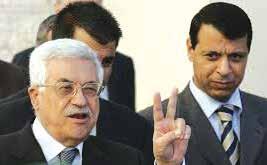
“I have repeatedly refused to accept any security, governmental or executive role,” Dahlan said on X, adding that these reports have only been circulating to “thrill audiences.” In his post, he said he would only work to bring relief to Gazans and called Israel’s actions in Gaza an “ongoing dirty genocide.”
“We strongly affirm that our highest priority now is to end the war,” Dahlan said, adding that Gaza’s future would have to be “based on Palestinian national understandings,” which would entail “rebuilding the Palestinian political system through a transparent democratic process.”
Additionally, he said that an effective postwar vision for Gaza would require the official formation of an independent Palestinian state, with its capital being Jerusalem.
might be considering it.
“He [Dahlan] has bridges with everyone but is not necessarily liked by everyone,” said a source. “But I can’t think of anyone else who has his credentials.”
Dahlan, 62, would likely be the most popular pick for leader, perhaps only second to Marwan Barghouti, an imprisoned Palestinian politician who led deadly revolts against Israel, although Barghouti’s release would be improbable.
It’s unlikely that Israel would want


Gaza broke out on October 7. According to the IDF, many of the victims of Saturday’s attack were teens, with the youngest being ten years old and the oldest being twenty.
The rocket, which was made by Iran and was a Falaq-1, hit a soccer field in the Druze neighborhood. As the rockets rained down, sirens sounded, but it was too late.
“What happened today could be the trigger we have been worried about and tried to avoid for 10 months,” said a U.S. official from President Joe Biden’s administration, voicing worries that the strike could cause a full-scale war between Israel and Hezbollah.
Four injured individuals, who were in serious condition, were treated at Tiberias’ Baruch Padeh Medical Center. Thirty-two others were brought to Safed’s Ziv Medical Center, six of whom were sent to the trauma ward, thirteen of whom sustained moderate or serious injuries, and ten who were lightly wounded. Four others were treated at Haifa’s Rambam Medical Center.
According to officials, ten victims were pronounced dead immediately; two others were brought to a hospital before being declared deceased.
“We witnessed great destruction when
we arrived at the soccer field, as well as items that were on fire. There were casualties on the grass and the scene was gruesome,” Magen David Adom medic Idan Avshalom said.
Although Hezbollah originally claimed responsibility for sending a number of rockets to an Israeli military base, the terror group immediately backpedaled following news that the strike killed a number of Druze children, claiming that it had “absolutely nothing to do with the incident.”
As per “assessments carried out by the IDF and reliable intelligence information available to us,” the Israeli military has, however, determined that the strike “was carried out by the Hezbollah terror group” from a location near Chebaa, a town in Lebanon.
“A Falaq-1 rocket struck here in the soccer field, it is an Iranian rocket, manufactured in Iran, a rocket with a warhead of over 50 kilograms of explosives,” said IDF Spokesman Rear Adm. Daniel Hagari. “The forensic findings at the scene point to this rocket. Falaq-1 is only in use by the Hezbollah terror group, which carried out this attack from Chebaa.”
The strike was ordered by Ali Muhammad Yahya, a top Hezbollah official, according to IDF’s Arabic-language spokes-

man Col. Avichay Adraee.
“We share in the grief of the families and embrace the Druze community in its difficult time,” said Hagari. “Once again the brutality of Hezbollah as a terrorist organization is exposed. This is a very grave incident, and we will act accordingly.”
Following the attack, Defense Minister Yoav Gallant met with several officials, including IDF Chief of Staff Lt. Gen. Herzi Halevi, Shin Bet head Ronen Bar, and Mossad head David Barnea to discuss Israel’s response.
Prime Minister Benjamin Netanyahu was in the United States during the attack and returned to Israel a number of hours early to deal with the incident.

Although Israel has been fighting in Gaza, the IDF has been targeting terrorists to the north. Since the start of the Gaza War, more than 500 terror operatives in Lebanon have been eliminated by the IDF, according to the chief of the military’s Northern Command.
“We have already eliminated more than 500 terrorists in Lebanon, most of them from Hezbollah, and we have destroyed thousands of infrastructures,” Maj. Gen. Ori Gordin told troops of the Golani Brigade in northern Israel.
Hezbollah has listed 337 of its operatives who have been killed by Israel in recent skirmishes. Israeli defense officials estimate that this figure is in fact higher, and Hezbollah is covering up the true number of fatalities among its ranks.
Hezbollah forces have been attacking Israeli communities and military
posts on a near daily basis. The terror group says that it is attacking the Jewish state in support of the war in Gaza.
Thousands of people in Israel have been displaced from their homes in northern Israel because of the threat emanating from the north.

Hamas political leader Ismail Haniyeh’s life came to an abrupt end early Wednesday morning when he was assassinated by a precise strike in Iran. It was just hours after Haniyeh had attended the swearing-in ceremony of Iran’s new president Masoud Pezeshkian. In response to the attack, Pezeshkian said Iran would “defend its territorial integrity, dignity, honor, and pride, and will make the terrorist occupiers regret their cowardly act.”
Haniyeh had come to Iran on Tuesday and had met with Pezeshkian and Iran’s supreme leader Ayatollah Ali Khamenei before the ceremony.
Iran and Hamas have pointed at Israel as being behind the killing.
It was the second high-profile assassination attributed to Israel in a matter of hours, coming after an airstrike in Beirut that killed Hezbollah’s top military leader, Fuad Shukr. That strike was made in retaliation of a Hezbollah missile that killed 12 children playing soccer in a Druze town in northern Israel.
Israel has yet to comment on the attack in Iran, but it had vowed to kill Haniyeh and other leaders of Hamas after the Gaza-based terror group’s devastating October 7 attack on Israel that killed 1,200 people and saw 251 taken hostage.
Hamas said Haniyeh was killed “in a treacherous Zionist strike on his residence in Tehran after he participated in
Did you know?
Women have been allowed to compete in the Olympics since 1900.

the inauguration of Iran’s new president.”
“Hamas declares to the great Palestinian people and the people of the Arab and Islamic nations and all the free people of the world, brother leader Ismail Ismail Haniyeh a martyr,” the statement added.
Haniyeh, normally based in Qatar, has been the face of the Palestinian terror group’s international diplomacy as the war triggered by the attack has raged in the Gaza Strip, where three of his sons were killed in an Israeli airstrike. He is the most senior Hamas official killed since the war started.
One of Haniyeh’s bodyguards was also killed.
In another statement, Hamas quoted Haniyeh as saying that the Palestinian cause had “costs” and “we are ready for these costs: martyrdom for the sake of Palestine, and for the sake of G-d Almighty, and for the sake of the dignity of this nation.”
Palestinian Authority President Mahmoud Abbas said the killing of Haniyeh was a “cowardly act” and urged Palestinians to remain united against Israel.
“President Mahmoud Abbas of the State of Palestine strongly condemned the assassination of Hamas leader Ismail Haniyeh, deeming it a cowardly act and
a serious escalation,” Abbas’s office said in a statement. “He urged our people and their forces to unite, remain patient, and stand firm against the Israeli occupation.”
Hamas-run Al-Aqsa TV cited senior Hamas official Moussa Abu Marzouk as saying the slaying was “a cowardly act that will not go unpunished.”
The Hamas-linked Shehab news outlet quoted another senior Hamas official, Sami Abu Zuhri, as saying that Hamas as a movement was strong enough to outlast the deaths of any of its leaders.
“We are waging an open war to liberate Jerusalem and are ready to pay any price,” Abu Zuhri was quoted as saying.
“This assassination by the Israeli occupation of Brother Haniyeh is a grave escalation that aims to break the will of Hamas and the will of our people and achieve fake goals,” he said. “We confirm that this escalation will fail to achieve its objectives.”
“Hamas is a concept and an institution and not persons. Hamas will continue on this path regardless of the sacrifices, and we are confident of victory,” Abu Zuhri said.
In response to the attack on Iranian soil, Iran’s Supreme National Security Council convened to discuss Iran’s strat-

egy on how to strike back.
Iran’s state media cited the Foreign Ministry as saying in a statement, “The martyrdom of Haniyeh in Tehran will strengthen the deep and unbreakable bond between Tehran, Palestine, and the resistance.”
Haniyeh was elected head of the Hamas political bureau in 2017 to succeed Khaled Mashaal. Haniyeh was wellknown as he had been the Palestinian prime minister in 2006. Living in exile at the time, he split his time between Turkey and Qatar. He left the Gaza Strip in 2019 to live in Qatar. Yahya Sinwar, the mastermind behind the October 7 massacre, is the Hamas leader living in Gaza.
In April, an Israeli airstrike in Gaza killed three of Haniyeh’s sons and four of his grandchildren.
Zambada along with him.
According to U.S. officials, Guzmán López convinced Zambada to join him on a private plane ride by lying to the cartel co-founder, telling him that they would be looking at northern Mexican real estate.
“U.S. law enforcement authorities were informed at approximately 2:40 p.m., once the plane was in the air, that Ismael Zambada García might also be on board the aircraft,” said Rosa Icela Rodríguez, the Mexican secretary of security and citizen protection.
The two criminals did not go to northern Mexico. Instead, Guzmán López landed close to the U.S.-Mexican border near El Paso, Texas, where they were both arrested by U.S. officials.
Mexico was not involved in the arrests, according to Rodríguez.
“The government of the United States has to give a complete report. It can’t be just general statements,” President Andrés Manuel López Obrador said the day after the arrests. “There has to be transparency.”

One of the notorious leaders and co-founder of the international Mexico-based Sinaloa cartel, Ismael Zambada, also known as “El Mayo,” was arrested last Thursday for the first time in his life, marking a major development in challenging what U.S. Drug Enforcement Administration chief Anne Milgram calls “the cartel that is responsible for the majority of the drugs, including fentanyl and methamphetamine, killing Americans from coast to coast.”
Up until now, Zambada, 76, was admired by friends and foes alike for achieving the incredible feat of never having spent a single day behind bars, despite dedicating his entire adult life to engaging in illegal cartel activities.
U.S. authorities were able to arrest Zambada thanks to a series of unusual events and cartel betrayals. Thirty-eightyear-old drug trafficker Joaquín Guzmán López, whose father is the infamous drug lord and Sinaloa cartel co-founder “El Chapo,” surrendered himself to the U.S., and, in the process, forcibly dragged
Frank Pérez, Zambada’s lawyer, claimed that his client was kidnapped.
“Joaquín Guzmán López forcibly kidnapped my client. He was ambushed, thrown to the ground, and handcuffed by six men in military uniforms and Joaquin. His legs were tied, and a black bag was placed over his head,” Pérez stated. “He was then thrown into the back of a pickup truck and taken to a landing strip. There, he was forced onto a plane, his legs tied to the seat by Joaquin, and brought to the U.S. against his will. The only people on the plane were the pilot, Joaquín and my client.”
On Friday, at El Paso’s U.S. District Court, Zambada pleaded not guilty to all charges. Guzmán López, who was indicted on narcotics, money, and firearms charges, will also appear before a federal court.

It can take many months or even years for doctors to determine that someone is suffering from Alzheimer’s disease. But now, scientists are saying that blood tests
may be able to determine if someone has the dreaded disease. Confirming a diagnosis is key in getting a patient the proper drugs needed to treat Alzheimer’s.
The new blood tests may also help drug researchers more efficiently conduct clinical trials to evaluate experimental drugs aimed at slowing the incurable disease that afflicts 6.9 million Americans.
This week, researchers at the Alzheimer’s Association International Conference will report results from a series of studies evaluating these new blood tests.
“We know that blood tests have the potential to increase (the) accuracy of early diagnosis and maximize the opportunity for patients to access potential Alzheimer’s treatments,” said Dr. Rebecca Edelmayer, senior director of scientific engagement for the Alzheimer’s Association. “The field is really moving forward with the use of these types of tests.”
Until now, doctors needed to examine the patients and conduct memory and thinking tests. Some patients needed PET scans or spinal taps to detect whether the person has a telltale buildup of amyloid-beta protein, which forms plaques in the brains of Alzheimer’s patients.
But a blood test may prove to be more accurate. A study of more than 1,200 patients with signs of the disease found the Precivity AD2 blood test, which measures ratios of the proteins tau and amyloid-beta, detected the disease more often than doctors did.
Among two large groups of patients who visited specialized memory clinics or primary-care clinics, the Precivity test accurately detected 90% of cases, even among patients with complicated medical histories including kidney disease, according to a study published on Sunday in the Journal of the American Medical Association. By comparison, specialists at the memory clinics identified 73% of cases, and primary care doctors accurately diagnosed 63% of cases.
Blood tests are more easily accessible for some patients. They are also generally cheaper and non-invasive.
Another study released on Sunday found that tau blood tests can identify people likely to be in the early stages of the disease even though they have shown no signs of memory and thinking problems.
Researchers from Lund University in Sweden analyzed samples from more than 2,700 cognitively normal people across 10 studies. The samples included both tau in blood and amyloid-beta, detected by PET scans or spinal taps. The study concluded the tau tests could predict 79 to 86% of cases in which cognitively normal people also had a buildup of amyloid-beta confirmed by PET scans or spinal taps.

If that study’s findings are confirmed, researchers said it might show that tau blood tests could reduce the need for experts to use expensive PET scans or spinal taps to screen patients for Alzheimer’s medical studies.
Drug companies are working on medications geared towards helping those suffering from Alzheimer’s.
Earlier this month, the FDA approved Eli Lilly’s Alzheimer’s drug donanemab, shown in studies to slow the early stag-
es of the disease. The drug, which will be sold under the brand name Kisunla, is an antibody that removes beta-amyloid that accumulates in the brains of patients with Alzheimer’s disease. Clinical studies showed people with a mild form of the disease reduced cognitive decline by 35% compared with those who took a placebo.
Last year, the FDA approved Eisai and Biogen’s drug Leqembi, which also slowed cognitive decline in people with early stages of the disease.
Thanks to a new U.S. Supreme Court ruling that clarifies states’ rights to clear out homeless encampments, California Gov. Gavin Newsom, last week, ordered officials to clear the state of its homeless encampments. “This executive order directs state
agencies to move urgently to address dangerous encampments while supporting and assisting the individuals living in them — and provides guidance for cities and counties to do the same,” said Newsom. “There are simply no more excuses. It’s time for everyone to do their part.”
Newsom’s order asks Californian officials to “adopt humane and dignified policies to urgently address encampments on state property.”

There are currently around 653,100 homeless people in the United States, up 12% from 2022, according to the U.S. Department of Housing and Urban Development, over 180,000 of whom reside in California, which has the most homeless people in the U.S.
Some have criticized Newsom for the executive order, with AIDS Healthcare Foundation president Michael Weinstein alleging that the governor is guilty
of “criminalizing poverty” and “doubling down on failed policies.”
“Governor Newsom, where do you expect people to go? This is a shameful moment in California history,” said Weinstein on the day the order was signed.
Chris Herring, an assistant sociology professor at the University of California Los Angeles, accused Newsom of trying to “politically clear his name of the homeless crisis, especially as he’s in the national spotlight right now amid the presidential election.”
“Newsom could have issued this order before the (Supreme Court) decision. The only difference now is that states and localities are free to confine and arrest people even when there is no shelter available,” said Herring. “Now … they will be able to carry out these encampment sweeps with the very real threat of issuing people incredibly expensive fines of which people cannot pay and often results in a warrant or an arrest or can result in incarceration.”
After Newsom issued the order, a spokesperson for San Francisco Mayor London Breed said, “Our city encampment teams and street outreach staff have been going out every day to bring people indoors and to clean and clear encampments.
“This is why we are seeing a five year
low in the City’s tent count on our streets,” the spokesperson added.
Others have cited studies that show that encampment clear-outs do little to address the root cause of the homelessness crisis but merely serve as a temporary fix for the issue. Some have criticized Newsom for issuing an order that may fail to remove homeless people from the streets but will only strip homeless individuals of their right to shelter.
The Supreme Court’s decision last month was hailed by Newsom, who noted that it “provides state and local officials the definitive authority to implement and enforce policies to clear unsafe encampments from our streets” and “removes the legal ambiguities that have tied the hands of local officials for years and limited their ability to deliver on common-sense measures to protect the safety and well-being of our communities.”
Rupert Murdoch is locked in a secret legal battle against three of his children over the future of the family’s media empire, as he moves to preserve it as a con-
servative political force after his death, according to a sealed court document obtained by The New York Times. Murdoch, 93, set the drama in motion late last year, when he made a surprise move to change the terms of the Murdochs’ irrevocable family trust to ensure that his eldest son and chosen successor, Lachlan, would remain in charge of his vast collection of television networks and newspapers.

The trust currently hands control of the family business to the four oldest children when Murdoch dies. But he is arguing in court that only by empowering Lachlan to run the company without interference from his more politically moderate siblings can he preserve its conservative editorial bent and thus protect its commercial value for all his heirs. Those three siblings — James, Elisabeth and Prudence — have united to stop


their father. Lachlan has joined on Rupert Murdoch’s side.
Last month, the Nevada probate commissioner found that Murdoch could amend the trust if he is able to show he is acting in good faith and for the sole benefit of his heirs, according to a copy of his 48-page decision.
A trial to determine whether Murdoch is in fact acting in good faith is expected to start in September. Hanging in the balance will be the future of one of the most politically influential media companies in the English-speaking world.
The Murdoch family has been divided before. James and Elisabeth at one point competed with each other and Lachlan to eventually take over the company, and at various times they have clashed with one another and their father. James, who once helped run the company with Lachlan, left it in 2019.
But given Rupert Murdoch’s advanced age, this battle has all of the makings of a final fight for control of his sprawling media conglomerates, which own Fox News, The Wall Street Journal, the New York Post and major newspapers and television outlets in Australia and Britain. (© The New York Times)

On Monday, President Joe Biden called for major Supreme Court reforms.
“I have great respect for our institutions and the separation of powers laid out in our Constitution,” Biden said. “But what’s happening now is not consistent with that doctrine of separation of powers.”
Biden is proposing a constitutional amendment stripping the president of immunity for crimes committed while in office, term limits for Supreme Court justices, and a binding code of conduct for the high court. Although he has set his sights high, there is little chance of his proposal passing through a divided Congress. Still, they serve as a message to the left-wing part of the Democrat Party. Vice President Kamala Harris, now the presumptive Democratic presidential

nominee, quickly endorsed the proposed changes, which come at a time of deep unpopularity for the high court.
Earlier this month, a Supreme Court decision granted presidents full immunity for some actions taken while in office.
Democrats have frequently pointed to the Supreme Court’s conservative majority – solidified by former President Donald Trump – to underscore what they see as the high stakes of the 2024 election.
Biden continued that argument on Monday, also praising his vice president and her ability to carry on the fight.
“In recent years, extreme opinions that the Supreme Court has handed down have undermined long-established civil rights principles and protections,” Biden said, listing a litany of recent cases, including the 2022 decision overturning Roe v. Wade and this month’s immunity decision.
“No one is above the law,” Biden said, adding that for “all practical purposes” the recent ruling would allow a president to “flout” the law and “face no consequences.”
Biden is calling for an amendment dubbed the “No One Is Above the Law Amendment,” which will state the Constitution “does not confer any immunity from federal criminal indictment, trial, conviction, or sentencing by virtue of previously serving as President.”
“I share our Founders’ belief that the president must answer to the law,” Biden said.
Biden also called for term limits for Supreme Court justices, who serve lifetime appointments. That move, Biden said, would make the timing for the nomination process “more predictable and less arbitrary.”
House Speaker Mike Johnson said, “It is telling that Democrats want to change the system that has guided our nation since its founding simply because they disagree with some of the court’s recent decisions. This dangerous gambit of the Biden-Harris administration is dead on arrival in the House.”
Democrats have sought to use public disapproval of the court – particularly its 2022 ruling overturning Roe v. Wade – to drive voters. Biden and Harris have made that decision a central part of their campaign arguments, hoping the issue of abortion rights will galvanize voters heading into November.
The entire California mining town of Havilah, aside from a few buildings, com-
pletely burned down by the Borel Fire. The community, whose residents were forced to evacuate, was home to around 250 people.
“We lost everything – it’s all gone,” Sean Rains, a resident of the town, said. “This whole town burned down. Multiple people, friends that I know – everybody lost everything.”

In just 24 hours, the Borel Fire, aided by strong winds and high temperatures, burned down 30,000 acres. As of Sunday, 50,000 acres were destroyed and none of the wildfire was under the control of 1,200 fire officials deployed to the area.
“Some of those edges of the fire, with rapid growth, we’re having to chase down rather than stand in front of it,” incident commander Jim Snow said. “We have had some light injuries on the incident –a lot of heat-related injuries.”
The Park Fire, which is another wildfire consuming California, has burned down 360,000 acres and is currently the U.S.’s largest active wildfire. As of Monday morning, 12% of the blaze was under control, and evacuation orders and warnings were still in effect in the counties of Butte, Tehama, Plumas, and Shasta. California has been receiving federal assistance to deal with the disastrous fire, which is the seventh biggest wildfire in the state’s history.
According to officials, Ronnie Dean Stout II, 42, started the Park Fire by pushing a car that was on fire 60-feet into a ravine. Stout has since been arrested and accused of arson.
Burning in Butte County, the Park Fire started last Wednesday near the Californian city of Chico and obliterated everything in its path, including houses, cars, and trees. Each hour, thousands more acres were burned down by the wildfire.
America’s gross national debt topped $35 trillion for the first time Monday, a reminder of the nation’s grim fiscal predicament as legislative fights over taxes and spending initiatives loom in Washington.

The Treasury Department noted the milestone in its daily report detailing the nation’s balance sheet. The red ink is mounting in the United States more quickly than many economists had predicted as the costs of federal programs enacted in recent years have exceeded initial projections.

The leading presidential candidates, Vice President Kamala Harris and former President Donald Trump, have said little about the nation’s deficits on the campaign trail, suggesting that the economic problem will only worsen in the coming years. Deep differences between Republicans and Democrats on policy priorities and resistance within both parties to enacting cuts to the biggest drivers of the national debt – Social Security and Medicare – have made it difficult to reduce America’s borrowing.
The Congressional Budget Office said
last month that the U.S. national debt is poised to top $56 trillion by 2034, as rising spending and interest expenses outpace tax revenue.
High interest rates have made it harder for the United States to manage its debt burden. Some federal programs created during the pandemic, such as the Employee Retention Tax Credit, have been more costly than budget experts predicted because of fraud and abuse. There has also been stronger-than-expected demand for tax credits that have been offered through the Inflation Reduction Act of 2022, inflaming annual deficits.
The Treasury Department said Monday that it borrowed $234 billion from April to June, which was less than it anticipated, and that it expects to borrow $740 billion from July through September.
Treasury Secretary Janet Yellen said in June that the U.S. debt load remained reasonable given the size of the economy and that she was focused on keeping interest costs stable. The Biden administration in its most recent budget proposed $3 trillion in deficit reduction over a decade, largely from raising taxes on high earners and corporations.
“If the debt is stabilized relative to the size of the economy, we’re in a reasonable

place,” Yellen told CNBC last month.
The budget office predicts that annual interest costs will rise to $1.7 trillion in 2034 from $892 billion this year. At that point, the United States would be spending about as much on interest payments as it does on Medicare. (© The New York Times)
help in the woods. Once they reached the voice, it turned out to be Hern, the missing man.
The moment the good news came over the radio was “exhilarating,” Wolfe County Search and Rescue Chief John May said.
“An inexperienced hiker in a wilderness area for 14 days without food or water, nobody really expected to find him alive like we did,” he said. “It’s really just a miracle that he survived.”

Scott Hern had been lost in the wilderness for 14 days. Rescue teams were combing the Kentucky forest for him for days and were about to give up hope. Finally, on the last day of the search mission, the rescuers found a sign of life.
A team of five rescuers heard a yell for
The 48-year-old was last seen on July 6. Hern is from Ironton, Ohio, and his family had reported him missing there. But rangers didn’t know where he was, until they found his truck and ran his plates.
“When he ran his license plate, that’s what kind of triggered this whole event because there was a missing persons report filed in Ohio where he was actually missing from,” a forest ranger said.
On July 20, the team spotted footprints and then one of the rescuers heard a faint noise.
“Help,” said the voice.
As the team got closer, they asked for the person’s name. “Scott Hern,” he said. Hern looked at Eric Wolterman, his rescuer, and thanked him before asking for a hug.



“I think it was the best hug of both of our lives,” Wolterman said.
Hern was “extremely dehydrated” and “his feet were in really bad shape” from blisters and bug bites. Hern couldn’t walk when they discovered him.
Now, he’s lost and found.

Flying Southwest? Beware of exploding sodas.
At least 20 flight attendants onboard Southwest flights have been injured by exploding soda cans this summer, including one who required stitches. The extreme heat in certain areas are creating problems with the caffeinated beverages at cruising altitudes, causing them to burst midair.
Many of the airports where Southwest has a large presence — such as Phoenix, Las Vegas, Austin, Dallas, Houston and Sacramento — are located in cities that have already broken temperature records this year.
“We’re aware of the issue and have been taking steps to keep onboard beverages cooler, especially in our airports experiencing extreme temperatures,” spokesperson Chris Perry.
Other airlines don’t have this issue, as Southwest does not serve meals during its flights. As such, the beverages are not kept in cooler areas and are susceptible to these issues. The company is now testing out trucks with air-conditioned cargo areas in Phoenix and Las Vegas.
It’s also telling airport teams to use digital thermometers to take the temperature of cans before loading up each plane and to hold back any cans that read above 98 degrees Fahrenheit. Flight attendants are also told not to open any cans that look misshapen or feel hot to the touch.
Blast off!
Some people go to church to pray. Other people go to church to get guns.
River Church in Kansas City has some eyebrow-raising incentives for followers.
On Father’s Day, the church gave an AR15 rifle to one of its members.
The pastor, Christopher Zehner, explained, “I was thinking about Father’s Day because we’ve got a lot of men in the church, they like to shoot guns. I thought, ‘Let’s give away a gun to the church and let some of the men get involved, and let’s make it a big, fun event.’”

Well, it seems like many people liked the idea. Before the Father’s Day gun giveaway, the church had less than 100 members. Since then, hundreds more have signed up.
“A gun is a blessing because here in America, we have what’s called the Second Amendment, and we’re free Americans,” Zehner added. “We have the right to bear arms.”
For the Fourth of July week service, the church gave three more members of the congregation guns — a shotgun and two handguns.
“Our attendance doubled after this whole thing happened,” Zehner said. “So I think people were looking at this like, ‘Wow, there’s somebody that stood up for our rights and freedoms and actually has a backbone.’”
The church has given away items before but never guns.
Each recipient of the firearms was a member of the church and had to complete a background check before taking ownership.
“I know some people would maybe question, ‘Is a gun a blessing?’” Zehner said. “But in the context of protecting your family, standing up for the Second Amendment right, I believe it’d be a great blessing.”
Ironically, since the gun giveaway, the church has received threats and has had to hire a security guard to stand outside the building during services. Members need to sign a waiver acknowledging the building had been threatened.
River Church is planning a gun safety course in the future for its members, where they’ll learn how to properly load, fire, clean and store a firearm.
And maybe pray for everyone’s safety.





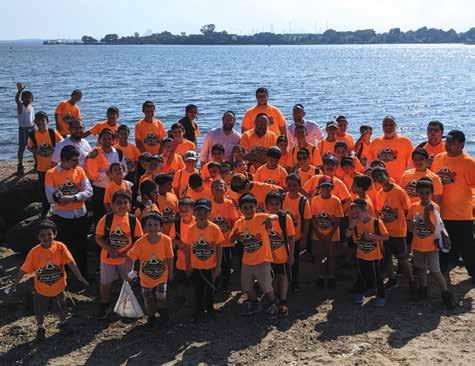
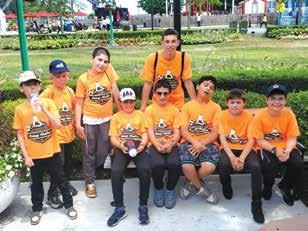



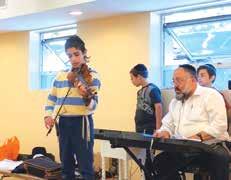





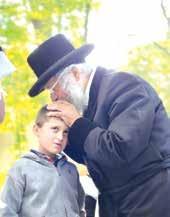


At Camp Kaylie, where the spirit of camaraderie and growth thrives year-round, Color War stands out as one of the most exhilarating and memorable events. This year’s Color War saw the fierce and vibrant battle between two teams, Achdus (Blue) and Emunah (Yellow), a spectacle of passion, teamwork, and friendly rivalry. Yet, amidst the colorful chaos and competitive spirit, a profound sense of unity and respect underscored the entire experience, leaving a lasting impact on everyone involved. From the moment Color War commenced, the camp was abuzz with excitement. Each day was filled with spirited activities that tested the campers’ skills and fostered teamwork. The teams competed in a variety of events, from high-energy sports matches to creative arts and the ultimate test of endurance and strategy in the Apache Relay. Teams Achdus and Emunah gave their all in each event. The competition was fierce, but the essence of the games was about more than just winning; it was about pushing through, showing dedication, and most importantly, working together. Despite the competitive nature of the Color War, one of the most heartwarming
aspects of the event was the underlying unity between the teams. Camp Kaylie’s values of respect and inclusion shone through as both Achdus and Emunah embraced the spirit of the camp’s community.
As the Color War drew to a close, the culmination of the teams’ efforts was revealed in a touching gesture of unity at the Grand Finale. Both teams Achdus and Emunah worked together to create a special gift for the Airley family who lost their beloved son Binyamin, z”l, in Gaza. The gift was a beautifully crafted picture designed to be displayed in Beit Binyamin, a retreat center for IDF soldiers built in memory of Binyamin, z”l. The image was a heart that became whole only when the two sides came together. This poignant representation was more than just a visual piece; it was a metaphor for the strength found in unity amid the chaos of competition.
Mrs. Jen Airley, who was deeply moved by this heartfelt gift, expressed her gratitude and emotional response. She shared a profound insight from the Kotzker Rebbe with the campers: “There is nothing more whole than a broken heart,” she said, highlighting how the fractured image, when unified, symbolized the idea that coming together in times of turmoil creates something greater than the sum



of its parts.
In the closing moments of the Color War, the campers from both teams came together for a Grand Sing ceremony, where the air was filled with voices raised in song and camaraderie. The Yellow team’s song encapsulated the spirit of the camp and the week’s events: “We say Tehillim every day for our chayalim together we pray. Our Emunah we show. Only together we grow.
A Jew is never alone. Hashem please
BRING THEM HOME.”
The song spoke to the heart of what Color War represents—a celebration of shared faith and hope. In the end, Color War at Camp Kaylie was more than just a series of events and competitions; it was a celebration of the connections we make and the strength we find in each other. It was a reminder that even when faced with challenges and differences, the true essence of klal Yisroel lies in our ability to come together, support one another, and grow as one.
































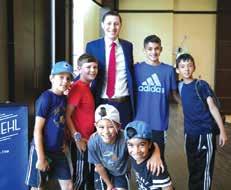







As we wrap up another wonderful week at Hillel Day Camp, we are filled with pride and joy reflecting on the incredible experiences and accomplishments of our campers and staff. This week was jam-packed with excitement, entertainment, and learning including trips to Top Golf, Urban Air, United Skates of America, Once Upon a Treetop and more, and in camp entertainment with a petting zoo and school spirit day!
This week was particularly meaningful as we dedicated a special day to chesed, commemorating the 17th of Tammuz. Our campers were given opportunities to express generosity and compassion in supporting Israeli soldiers and various communities in Israel. Chesed Day was a truly beautiful occasion, bringing out the best in our campers as they participated in various activities to help those in need. Our campers designed colorful cards and artwork for different communities in Israel, spreading joy and positivity. These creative projects allowed the campers to express their artistic talents
while making a meaningful impact on others.
Hillel Day Camp’s older campers visited The Israel Chesed Center for Chesed Day. Under the guidance of special events coordinator, Gari Ann Harris, campers in grades four to seven showed their support for the IDF and their families. With the collective effort, the campers and staff wrote letters, designed and filled beef jerky bags for Chayalim, made beautiful bracelets and packed hundreds of pairs of shoes for displaced families. At the Chesed Center, located right in Hewlett, campers were reminded of the importance of having Israel forever in our hearts and minds. Many campers shared what they’ve already done, and most importantly what they hope to continue to do, to show our ongoing support for our nation, a true testament to their heartfelt dedication. It was a privilege to share in this inspiring day!
As always, we are grateful for the support of our wonderful camp families. Your encouragement and involvement help make Hillel


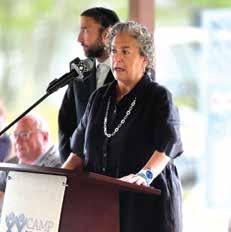

Day Camp a place where experiences create lasting memories. We look forward to another week of fun, learning,

and growth next week. Follow the action throughout the week on Instagram @hillel_day_camp

Camp Kaylie has always been a place where unforgettable memories are made, and this year’s opening was no exception. Camp Kaylie has had an amazingly successful start to Girls’ month. Our staff orientation was filled with team building, learning, and important staff training. We welcomed over 500 campers with dancing and music, and after ensuring they were settled and ready to go, they jumped right into their awesome activities. Opening night was tremendous, with the ruach in the camp off the charts! It started with an interactive video introducing the head staff of Camp Kaylie and
highlighting all the exciting upcoming events of the summer, followed by an incredible performance by the Chicago Boyz and an amazing DJ. Friday was a meaningful and busy day with a full range of activities and bunk bonding. Campers enjoyed a meaningful Shabbos, meeting new friends and hearing inspiring divrei chizuk from Mrs. Chavah Kolakowski. After an amazing Shabbos, our campers got dressed up for a concert with Shaindy Plotsker, with some campers donning “We love Shaindy” t-shirts. Shaindy led us in a meaningful, fun and uplifting Melave Malka! We can’t wait to see what Week #2 has in store!

Resilience Counselor Esther Marcus knows about emotional trauma firsthand.
On October 7, the London expat who lives on Kibbutz Alumim in Israel’s Gaza Envelope hid in a safe room with her husband Stevie and six family members for 27 hours as Hamas terrorists infiltrated the kibbutz and carried out their heinous atrocities, including torching her husband’s cowshed and destroying nearby chicken coops, fields, and orchards.
Marcus is the founder of a resilience center in Sdot Negev Regional Council, which serves 5,000 evacuees and 8,000 citizens currently residing in the region. On that horrific Simchat Torah morning, while praying for her life, Marcus fielded frantic calls to her center’s hotline from people in distress, and tried to be of comfort and assistance as best she could.
Marcus was recently a featured speaker at a unique two-day seminar at the Sheraton Edison in New Jersey, which marked the culmination of the Orthodox Union’s Women’s Initiative annual Foundations of Community Mental Health Support Fellowship. The 10-week program geared towards rebbetzins, kallah teachers, kiruv and chinuch professionals trains them to identify and support community members struggling with mental health issues. As those who regularly interact with community members, these women largely serve as “first responders” when it comes to spotting and addressing personal, marital, and familial crises which often necessitate referrals to mental health professionals.
Thirty-five women from across North America participated in this year’s fellowship, which introduces general mental health concepts and encourages fellows to develop their intuition, recognize when and how to support community members alongside referrals to field professionals, and create a network to consult with one another long-term. The transformative program provides fellows with a framework, a vocabulary, and a safe space to navigate personal issues with professionals. It does not, however, train participants to practice as clinicians or coaches.
Each week, fellows attend a two-hour, virtual course facilitated by licensed clinical social workers, therapists, psychologists, and psychotherapists, many of whom are university professors and directors of mental health programs who
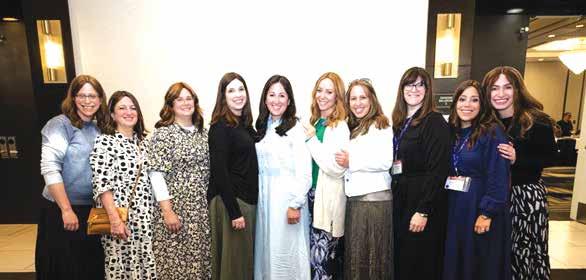
also serve as community rebbetzins. Following an hour-long presentation on a mental health-related subject, the professionals moderated small group discussions centered on unpacking the presentation or tackling issues of relevance to fellows’ respective communities.
The fellowship culminates with a seminar where participants meet in person for the first time, exchange ideas, and consolidate their learning and newly-acquired skills. Nineteen women from previous cohorts joined the current fellows at this year’s conference.
As communities worldwide are still reeling from the pain and fallout of October 7, OU Women’s Initiative Founding Director Rebbetzin Dr. Adina Shmidman felt that it was imperative to incorporate sessions dedicated to communal trauma both in Israel and North America.
“Mental health takes into account not only personal experiences, but collective experiences as well,” she says. “On October 7, we experienced a national trauma of epic proportions, and it was critical in the design of the conference to create this space to share the collective grief as well as nurture healing as a community of women leaders.”
In addition to sharing her personal story on October 7 in a session entitled Struggles and Strength: Life in the Gaza Envelope and Paths to Resilience, Marcus presented a session for seminar speakers and fellowship facilitators entitled The Frontline of Support: Psychologists’ Experiences and Challenges in Israel. Communal leaders were also provided a space to share their thoughts in From the Heart: An Open Conversation About Israel.
Rebbetzin Dr. Adina Shmidman opened and closed the seminar, which featured presenters including Rebbetz-
in Dr. Jessica Kalmar, Dr. Rona Novick, Rachel Hercman, Debbie Fox, Cheryl Epstein, Dr. Rachel Wilensky, Sarah Robinson, Dr. Shira Donath, Dr. Bea Hollander-Goldfein, Dr. Aliza Frohlich, Dr. Tamar Perlman, Yael Muskat, and Toby Carrey.
Sessions included Smoothing the Edges: Beliefs, Blends and Boundaries; Anxiety and Stress in Students: The Educator’s Role; Destigmatizing Mental Illness in Our Communities: A Path Forward; Understanding Couple Relationships; and Smart Referrals: Empowering Leaders to Connect with Care, among many others.
OU Chief Legal Officer Rachel Sims and attorney Debra Shreck led a session on Spotting and Navigating Issues of Confidentiality and Disclosure – and Understanding Their Implications. Participants also enjoyed divrei Torah and chizuk, Torat Imecha Nach Yomi, a kumsitz, and art and Zumba activities.
Rebbetzin Michal Schonbrun is a campus rebbetzin, kallah teacher, and adjunct professor at Stern College for Women in New York. In the coming academic year, she will teach a Tehillim class and a course exploring diverse leadership roles through the lens of Chazal. Rebbetzin Schonbrun frequently supports students who approach her about various issues including mental health struggles, and knew immediately that she wanted to participate in the fellowship.
“When I saw the fellowship advertised, it was a no-brainer to apply,” she says. “The opportunity to learn from the top clinicians in our community, many of whom are rebbetzins themselves, has been tremendous. Not only did the program educate me about different elements of mental health, but it also helped facilitate relationships with expert mental

health mentors and resources that I can consult with, bounce ideas off of, and of course, refer students to. Having relationships with licensed mental health professionals who understand the relevant cultural sensitivities and considerations means I can better guide my community as our students navigate mental health challenges and everyday life.”
Rebbetzin Schonbrun was particularly touched by Marcus’ presentations.
“Esther’s sessions were unbelievably powerful,” she reflects. “Esther vividly described her experience of that dreadful Simchat Torah morning while showing us non-graphic video footage of the kibbutz, pausing throughout to narrate and explain…She took us there with her and showed us the layout of the kibbutz, including the barn that was torched, and spoke about her friends, their personalities and interests. She told us about her friends’ children who were killed and about her neighbors who fought for hours defending the Kibbutz and its people… It was deeply moving. Astoundingly, in her role as a licensed mental health professional, Esther arranged support for others as she was living through the experience herself. Listening to her reenergized my mission to serve the community, spiritually and emotionally, as a rebbetzin.”
Rebbetzin Dr. Adina Shmidman adds, “What was personally shocking was to hear that her husband suffered a fatal heart attack when he returned to the kibbutz weeks later and tried to address the needs of the dairy farm. The stress and pain of loss of people and animals took a terrible toll. Esther is remarkable in her resilience despite her own personal loss and pain.”
by Rabbi Yechiel Spero
Kinnah 28: Eich Tinachmuni
How can you comfort me when my harp, which used to play happy songs, only plays songs of mourning...
Introduction
This Kinnah speaks about the great tragedy of the Churban and how hard it is to find true comfort. It goes through the four kingdoms that ruled over the Jews: (1) Bavel, who destroyed the first Beis HaMikdash; (2) Paras and Madai, who ruled around the time of Purim; (3) Yavan, who ruled around the time of Chanukah; and (4) Edom/Rome, who destroyed the second Beis HaMikdash. Galus Edom is not yet over.
Background
We still suffer from the Churban today, even though it happened two thousand years ago. Our land isn’t fully rebuilt and it’s not ruled by the type of king the Torah speaks about. In galus, we’re surrounded by non-Jews who don’t like us. We are in a very sad situation, even nowadays.
In this Kinnah, we ask: How can we be comforted?
And the answer is: Hashem is the only One Who can bring proper hope and comfort. He is the One Who can and will bring the geulah. He is the One Who will
help us rebuild.
There is a plant named the Rose of Jericho, which can survive seven years without any moisture. Hashem made it in a way that in times of dry weather, it curls up, forming a little ball, in which it protects itself until the rainy season. Then it opens itself up to the rain, blossoming and growing again.
The Rose of Jericho teaches us a lesson. Sometimes, we find ourselves in a situation where we feel all dried up, like we have no more strength. But Hashem can come along and sprinkle a little moisture — send a little chizuk, a little hope, a little encouragement — upon us, and we find that our strength is renewed.
It’s Hashem Who can and will comfort us. And until that day, He’s the One Who gives us strength to make it through the hard times.
Rav Yosef Chaim Sonnenfeld, the great gaon (genius) and tzaddik, lived in Yerushalayim in the late 1800s and early 1900s. In those days, there were some serious diseases that had no cure or treatment. Many children died from these illnesses, including several of Rav Yosef Chaim’s sons and daughters. As he sat shivah for his children, he mourned and he cried, but he didn’t give up. He remained strong in his emunah. When shivah was over, he returned to his routine.
Tug of war was an Olympic sport from 1900 to 1920.

Someone asked Rav Yosef Chaim how he was able to keep going, and he explained, “A person standing on firm, solid ground expects the ground to hold him. But when the earth begins to shake and there is an earthquake, it’s normal to become worried. However, if a person doesn’t expect the ground to hold him up, but instead holds onto a rope that comes from above, then even an earthquake cannot make him lose his balance.
“The reason I’m able to stand on the ground is not because the ground is firm. It’s because Hashem holds me up. As we say in the morning brachos, Hashem is ‘roka ha’aretz al hamayim — He spreads out the earth upon the waters.’ He’s the One Who holds up the earth, whether it’s firm or shaky. He’s the One I hold onto. He is my rope.
“There may be times in which I feel as if my world is shaking. This is what it feels like when my beloved children pass away. Even during these tough times, I hold onto the rope that reaches up to Hashem in Shamayim. And I hold onto Him. That’s how I am able to keep going.”

A Lesson
Even if you are, chas v’shalom, going through tough times, hold onto Hashem. He is the One Who will give you strength to handle whatever comes your way. And He is the One Who will bring you nechama
Reprinted from A Most Meaningful Tishah B’Av by Rabbi Yechiel Spero with permission from the copyright holder, ArtScroll Mesorah Publications.













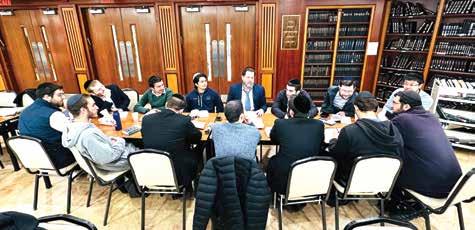
By Mordechai Kastlebaum
The Shaar is legendary.
What began as a nascent dream to reach out to secular young professionals and college students has now blossomed into a full-time, full-service, full-schedule Yeshiva program for young Baalei Teshuva and aspiring Baalei Teshuva. Students from across the country converge on the Sh’or Yoshuv campus in Far Rockaway – gracious hosts of the Shaar’s learning programs – to participate in the unique experience that is The Shaar. Around 20 of the Shaar members learn a full day, while the remaining 45 guys work, continuing to build their careers, and join the Shaar’s daily robust 3-4 hour evening learning program. The Shaar rents 13 houses and apartments locally, where Shaar members from across the U.S. and around the world live while they build themselves on their spiritual journeys.
The learning is intense, the davening is refreshingly sincere, and the ruach is so indescribably uplifting that countless local community members are eager to take part in Shaar activities. Baruch Hashem, the staff of rebbeim and lay leaders have been zocheh to build a program that is literally one-of-a-kind in America.
To date, hundreds of college-aged students and young professionals have spent time at The Shaar and grown from the experience. In fact, many arrive at The Shaar expecting to stay for just a few days but end up staying for months, being drawn so strongly to the new exposure to a world a ruchnius and meaning.
The Shaar believes that to teach Torah, you need to be immersed in Torah. Starting from the very basics, young men are taught the foundations of Gemara, Chumash, halacha, machshava, Jewish lifecycle and much more, all within the walls of the Sh’or Yoshuv’s vibrant Bais Medrash and classrooms, and through


many of the experiential trips and outings The Shaar staff so expertly prepares. Students are swept up by the resounding Kol Torah, the strong sense of achdus and brotherhood, and the immersive experiences. They build solid learning skills and an eye-opening appreciation for the wisdom and foresight of Chazal.
The Shaar chevra strongly integrates into the Five Towns and Far Rockaway community via Shabbos meals, shul events and community learning programs. As powerful as it is for The Shaar members to integrate into the community socially, spiritually and professionally, it is equally as impactful for the participating community members and families, who are incredibly moved by the mesiras nefesh of the Shaar guys. In fact, community members often remark how their own family dynamics and Shabbos tables have significantly changed for the better since starting to host and mentor Shaar chevra.
The Shaar just celebrated Shaar wedding #29 in four years! Young men who arrived with little to no knowledge of their rich mesorah have grown on every level and are now building their own homes steeped in Torah, mitzvos, chessed and tradition. More than half of the married Shaar couples have stayed on and settled in the local community.

The Shaar is now embarking on its annual Neshama Campaign to raise $850K for the coming year’s operations. Everyone is asked to contribute $395 (gematria of “neshama”) to help The Shaar continue to engage and inspire these amazing and thirsty neshamos, right here in our very own Five Towns.
The campaign launches during the 9 days, this Monday, August 5, through August 7, which is a most fitting time to demonstrate our ahavas chinam for all Jews and our hope to bring Torah and mitzvos into their lives.
You can contribute today at CauseMatch.com/Shaar
Did you know?


Camp Avnet, also known as Avnet Country Day School, gives hundreds of campers the time of their lives each summer. With two campuses, three pools, and thousands of activities each week, each day at Avnet is always rocking!
This week, we spoke with Daniel Stroock, camp director, to hear more about the energy, excitement, and nonstop fun that takes place at Camp Avnet every day of the summer.
By Michelle ZiMMerM an
Daniel, everyone knows you as the Director of Avnet Country Day School, but is it true that you actually started as a camper?
Thanks for opening this interview by making me feel old! Yes, my experience at Avnet began as a camper on the Long Beach campus in the ‘80s. I have so many amazing memories of those times. Every year at staff orientation, I actually show a picture of one of the vintage Avnet swim certificates I received as a camper. Memories made at camp truly last a lifetime, and the confidence, skills and friendships children gain from camp can’t be underestimated. I loved being at camp so much that I actually came back to Avnet as an Assistant Head Counselor and worked on the Dix Hills campus for three years before moving over to the Long Beach campus. I worked on many aspects of camp planning over years, including Transportation and Programming, before becoming an Assistant Director to my dear friend Jack Tarzik, a”h. When Jack retired after the summer of 2015, I moved into the director’s chair for 2016. Avnet has been a major part of my life, but my story is really one of thousands of families in the community. Since Avnet was founded over 60 years ago, it’s not unusual for the parents and

grandparents of current campers to be alumni as well. It’s very gratifying to hear from parents who are excitedly signing up their children for the first time, while telling me about their own experiences as Avnet campers. There are many wonderful camps in the area, but we’re proud that Avnet has been an integral part of memorable summers for generations.
That’s an amazing history. What is special at Avnet for summer ’24?
We try to raise the bar with meaningful programming every summer, but this year, the situation in Israel has inspired us to create special opportunities for chessed so our campers can play an active role as part of Am Yisrael. Everything we do is dedicated to the merit of our brothers and sisters in Israel. We’ve been setting the tone in Chinuch by discussing the concept of “ahavat chinam” spreading unconditional love to counteract the “sinat chinam” baseless hatred that exists in the world. Agamim girls in grades 8-6 have also started keeping “Gratitude Journals” in Chinuch so they can be mindful to continuously thank Hashem. As part of our initiatives, many campers have been drawing pictures


and writing letters to our chayalim. Boys in the Harim division have been tying tzitzit to send to Israel to be distributed by the IDF. In response to the parents of hostage Hersh Goldberg-Polin who asked everyone to participate in “A Week of Goodness,” we started our “Chains of Goodness” program. Anyone who visits our campus will see paper chains hanging in the main hallway. Campers are encouraging one another to show good middot on a daily basis, and for every individual act of kindness, we add a paper “link” to build the chain. The chain is spreading quickly throughout our halls, and the goal is to demonstrate our unity as a camp and as a nation. We’re really looking forward to visiting the Israel Chesed Center in Hewlett on the evening of August 7 for our first-ever “Night of Chesed,” for campers and their parents. Avnet will be sponsoring a pizza dinner for all those who come out to help with the special mission of the Center!
We also hope to celebrate the families in our midst who are planning on making Aliyah this summer. There are several within our camp community, and we intend to let them know how special we think that is!





Tell us about your two Woodmere campuses?
Avnet has extensive facilities that include both HALB’s Hirt Family Campus (elementary school) and the Lev Shlomo Campus (DRS). This enables us to double our programming. The elementary school hosts the youngest Tipot through the oldest Agamim girls. The DRS building hosts the G’vaot and Harim boys in grades 3-8. Many of our campers, regardless of where they are based, participate in activities on both campuses during their day. There is constant activity across our baseball fields, basketball courts, hockey rink, heated pools, gym and in our spectacular auditorium.
We see many Avnet buses rolling into camp every day. Where do your campers come from?
We’ve been fortunate that our enrollment has increased every year. Our campers really have an opportunity to grow socially and make new friends, since they represent many different communities and schools. They come from the Five Towns, Far Rockaway, Bayswater, Great Neck, Oceanside, West Hempstead, Long Beach, Atlantic Beach, Lido Beach, and Queens. Of course, many HALB students attend Avnet, but we also draw campers from YCQ, Shulamith, South Shore, HANC, HAFTR, Har Torah, MDS and some of the local public schools. Avnet is, in and of itself, a summer destination for many. We even have campers


joining us from Israel and all over the U.S. when they visit the area to see grandparents and family.
Avnet has seven divisions. How do you keep so many campers happy?
Our main priority is giving our campers a happy and safe summer. Since they range in age from 3-14, we have seven divisions to accommodate their varying needs and abilities. Our upper staff is entirely comprised of experienced educators, most of whom hold advanced degrees in special education and counseling. We also have over 300 counselors and specialty staff members. Malkie Behar is our Director of Operations. She runs our office year-round and has a phenomenal ability to connect with and remember almost every family and staff member. Jill Rosenfeld heads our “Tipot” or preschool division. Our first and second grade boys are in the Ma’ayanot division led by Moshe Spern. For girls, Ma’ayanot actually includes grades 1-3. Miriam Steiner is their Division Head. Girls in 4th through 8th grade are in our Agamim division, which is headed by Ariana Wolfson and assisted by Chani Feldman. On our Lev Shlomo Campus, we have two divisions for boys. The G’vaot division is for 3rd grade boys, while Harim is for 4th through 8th graders. Ashley Alibayof and Rabbi Asher Dworetsky head these divisions, and they are assisted by Shua Behar.



Can you share a glimpse of an Avnet day?
The truth is that behind all of the fun at Avnet is a year of planning and intricate scheduling. That preparation continues every day throughout the summer. Before the campers arrive at 9 a.m., there is a senior staff meeting so we’re ready with smiles. Camp is carefree, but all campers have a set routine that begins with davening. We have over 40 bunks and each bunk has 9 periods in a day over the course of a 5-day week. Ilana Mann, our Program Director, makes sure each group has an amazing activity to go to at any given moment. She is assisted in that tremendous endeavor by Megan Herskowitz.
Besides breaks for snacks and lunch, the day is packed with a variety of specialties, sports and trips to keep everyone busy until 4 p.m. Our specialties include Chinuch, Country Cooking, Culinary Creations, Arts & Crafts, Fine Arts, Music & Movement, Drama, Upcycling, Orienteering, Zumba and STEM. In addition to swimming, our sports include softball, soccer, basketball, hockey, tennis, volleyball, gaga and dodgeball. Shua Behar is the Sports Commissioner for the G’vaot and Harim boys. While there are competitive leagues which generate enormous excitement, we also make time for sports clinics so all our young athletes can hone their skills.
Most importantly, every bunk, including our




youngest campers, learns Torah in Chinuch. We have a dedicated Chinuch staff featuring: Morah Rivie Blum, Morah Suzi Scharf, Morah Daniella Klein, Rabbi Hillel Lichtman, Rabbi Jay Nathanson and Rabbi Shmuel Schroff.
Tell us about Avnet’s pools and aquatics program.
Swimming is a major focus at Avnet. We have three on-site, heated pools that allow for a capacity of over 250 campers at a time. Headed by Yaffa Sebag, we are fortunate to have a large, welltrained lifeguarding staff to keep the children safe and build their skills. We offer both instructional and free swim. Our youngest campers begin their aquatics careers with their attempts to swim across the pool. Once they have done so, they get an “I Learned to Swim at Avnet” shirt – for a 3-, 4- or 5-year-old, it’s quite the prize!
What visiting programs and trips are on the schedule this summer?
We like to dial up the fun at Avnet, so we plan many on-campus and off-campus adventures. So far this summer we’ve transformed our playing fields to host a carnival, petting zoo, obstacle course, game truck and laser tag. Our off-campus trips include Jump Town USA, Active Kidz, Planet Play, Topgolf, Glow Golf, Apron Masters, Beat the Bomb, Launch, Bounce! Trampoline Sports, Laser Bounce,

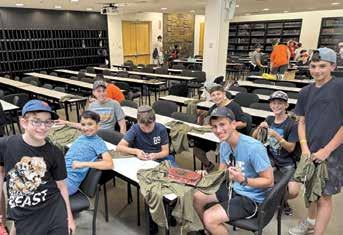
Casa De Spin, Once Upon a Tree Top, Dave & Busters, and Adventureland. We send all of our preschoolers, as well as our elementary school girls, to gymnastics each week. The boys have bowling as a regular part of their schedule.
We recently took our Tipot to a local theater for a performance of “Abracadabra,” and the Agamim girls went to “Wicked” on Broadway. The G’vaot and Harim boys enjoyed a wild Long Island Ducks game – final score 15-12 – and a day of fishing that was quite successful! The B4-B5 and G4-G5 campers went to Club Getaway for an overnight of camping and outdoor challenges. The oldest B6-8 and G6-8 had an incredibly sweet time at Hershey Park this past week with an added overnight in a local hotel.
How do you commemorate the Three Weeks and Nine Days?
We try to balance summer fun while teaching our campers to respect the importance of the Three Weeks. This starts at the preschool level. Our Chinuch groups discuss the time of the year and its significance. During the Nine Days, we convert our free swim time into a “swim-a-thon” to benefit Chai Lifeline. Our swim-a-thon is going on this week, and anyone can donate to this great cause by visiting https://chaiathon.rallybound.org/Donate and clicking on team Avnet HALB.


What is the most important thing you want our readers to know about spending the summer at Avnet?
Like I mentioned at the beginning, a summer at Avnet is about creating memories together. The most fulfilling thing for our team is seeing the pure joy and excitement on the children’s faces. There is nothing like hearing their laughter as they experience all the activities Avnet has to offer. We’re thrilled to have the campers with us, and we’re grateful to the parents who enrolled them. We always do our best to make sure that everyone has an unforgettable summer!
U 1:4 ratio of staff to campers
U 3 heated pools
U 3 generations of camping memories!
U 7 divisions
U 27 runs scored in the long island Ducks Game we attended
U 45 periods in a week per group
U 64 years of camping fun and experience
U More than 1,800 activity periods happening Per WeeK!!!
U 9,000 towels handed out each week

U 36,000 ice cream/ice pops enjoyed per summer!!!
U 66,000 8 oz. water bottles handed out per summer to keep our campers hydrated throughout the day!





During the 1904 games in St. Louis, American runner Fred Lorz quit the marathon and hitched a ride in a car to the finish line. But the car broke down four miles from the finish line. So, Lorz ran to the finish line and was promptly awarded the gold medal. His shenanigans were quickly discovered, and the gold medal was rescinded.
Four-time gold medal winner Jesse Owens disclosed that the way he trained himself to run so fast was by imagining that the track was red-hot: therefore, he tried to make sure his feet touched the track as little as possible.
Oscar Swahn (1847-1927), a Swedish shooter, won his last medal at the 1920 Olympics at the age of 72, making him the oldest person to win an Olympic medal.
The gold medals awarded for the top prize are actually silver, with gold plating.
Usain Bolt, a six-time Olympic gold medalist who holds the world record for the 100-meter dash, never in his life attempted to run a full mile.
The five Olympic rings represent the five major regions of the world – Africa, the Americas, Asia, Europe and Oceana, and every national flag in the world includes one of the five colors, which are (from left to right) blue, yellow, black, green, and red.
Cassius Clay (later, Muhammad Ali) won the light heavyweight boxing gold medal at the Rome Olympics of 1960. He later threw it into the Ohio River in disgust after being refused service in a whites-only restaurant on his return to the USA.
USA swimmer Mark Spitz had a mustache in the 1972 Olympics and jokingly told the Russian swimmers that it kept the water away from his mouth. During the next summer Olympics, all of the Russian swimmers had moustaches.
Michael Phelps is the most decorated Olympic swimmer of all time with total of 23 medals.
The Beijing Olympics, 2008, began at exactly 8:08:08 PM on 8/8/08 because the number 8 is considered lucky in China.
The record for the longest name for an Olympic champion is by female Thai weightlifter Prapawadee Jaroenrattanatarakoon.
During the opening ceremony of the Olympic Games, the procession of athletes is always led by the Greek team, followed by all the other teams in alphabetical order (in the language of the hosting country), except for the last team which is always the team of the hosting country.
A gymnast walked into a bar… He got a two-point deduction and ruined his chances of a medal.

Every country rewards their Olympic winners differently. Match the reward with the corresponding country.
1. USA
2. Singapore
3. Malaysia
4. Kazakhstan
5. New Zealand
6. Russia
7. Israel

A. $1 million
B. $40,000 annually until the next Olympics
C. $61,000
D. $275,000
E. $37,000
F. An apartment—the higher the medal, the bigger the apartment
G. A foreign car

Answer: 1-E; 2- A; 3- G; 4-F; 5-B; 6-C; 7-D
Four surfers competed in the Olympic surfing finals. Each had a different issue before the competition and finished in different positions.
The surfers are: Kelly Slater, Stephanie Gilmore, Mick Fanning, and Carissa Moore
Each surfer had one of the following issues:
• Broken Board
• Wind Conditions
• Sprained Hand
• Jellyfish Sting
Here are the clues about what happened:
1. Kelly Slater did not have a broken board.
2. Stephanie Gilmore did not finish lower than second.
3. Mick Fanning had a jellyfish sting before the competition.
4. Carissa Moore did not win the gold medal.

5. Stephanie Gilmore had a sprained hand, so she did not need any other adjustments.
6. Carissa Moore narrowly edged out Kelly Slater at the finish line.
What issue did each surfer have? What place did each surfer finish in the competition?
Mick Fanning: Jellyfish Sting, 4th Place; Carissa Moore: Broken Board, 1st Place
Answer: Kelly Slater: Wind Conditions, 3rd Place; Stephanie Gilmore: Sprained Hand, 2nd Place

By Rabbi Berel Wein

The fourth book of the Torah – Bamidbar – concludes in this week’s public Torah reading. The new generation of Jews, no longer the slave generation that left Egypt hastily and constantly longed to return there when faced with problems and difficulties, stands poised to enter the Land of Israel and fulfill G-d’s covenant with Avraham. However, here again, narrow personal interests cloud the general picture and weaken the necessary national resolve.
It is no longer the so-called fleshpots of Egypt that beckon and entice. It is rather the pasture lands east of the Jordan River that force the cattle-raising tribes of Reuven and Gad to plead with Moshe that they not be compelled to cross the Jordan and enter the Land of Israel.
Moshe’s initial reaction to their request is one of shock and bitter disappointment. He reminds them that their parents’ generation was destroyed in the desert for disparaging the Land of Israel and refusing to struggle on its behalf. And he warns them that they have apparent-
ly learned little from that bitter event in Jewish history.
Here they stand making the same error in judgment and vision that the previous generation did. Moshe’s greatest frustration is that the Jewish people can’t see past their cattle, their personal gain, an imagined short term benefit and their refusal
with cost and a price. Separated from their brethren west of the Jordan, the tribes of Gad and Reuven have a difficult time defending themselves and are the first tribes to be exiled. They produce no major leaders or heroes for the Jewish people, and their dreams of prosperity and material success are only fleetingly realized.
They become the model of individual Jewish indifference to the general cause of Jewish survival and success.
to acknowledge the grandeur of the L-rd’s long term vision for themselves and their land. It is this blindness of spirit and unwillingness to appreciate the uniqueness of Israel, the people and the land that Moshe bemoans.
But all of this temporary gain comes
Criticized bitterly and eternally by the prophetess Devorah for standing aside in an hour of national Jewish peril, they become the model of individual Jewish indifference to the general cause of Jewish survival and success. In our current world, they unfortunately have many heirs and
disciples. Mordechai warned Esther not to stand away and be passive in the face of Haman and his decrees. He warned her that when the Jews would somehow escape from the troubles, she and her family would be doomed to extinction in the Jewish story if she allowed her narrow self-interest to rule over her national duty for the preservation of Israel.
Today, as well, narrow self-interests govern many Jews – even leaders who seemingly should know better – in their attitudes, policies and behavior regarding the existential problems that face the Jewish people and the Jewish state. The Talmud teaches us that Jerusalem always needs advocates for its cause. That certainly is the case in the generation and times in which we find ourselves currently. Jewish apathy and alienation are our enemies. The allure of current political correctness in policy and mindset is misleading and dangerous. We too stand on the cusp of great adventures and opportunities. We should avoid the Reuven/Gad syndrome. Shabbat shalom.


By Rav Moshe Weinberger
Adapted for publication by Binyomin Wolf

The Degel Machaneh Ephraim, zy”a, teaches, in the name of his grandfather the Baal Shem Tov, zy”a, that the forty-two journeys of the Jewish people in the desert correspond to the journeys each individual takes in his life. When a person leaves the womb, this corresponds to when the Jewish people left Egypt. And when the Jewish people entered Eretz Yisroel, this corresponds to a person’s journey into the land of eternal life after 120 years in this world.
How do we retain a sense of equanimity and centeredness when we must transition from one journey to another throughout our lives? Reb Leibele Eiger, zy”a, points out that the word “of them, bam” in the pasuk, “And you shall speak of them,” has the numerical value of forty-two. And the pasuk continues, “And you shall speak of them when you sit in your house and when you walk on the way, when you lie down, and when you rise up.” We must speak of them, words of Torah and emunah, wherever we go
and wherever we travel. We can thrive through every test and trial we face if we hold onto truth and faith. If we remain certain in our purpose, then we will succeed despite all of the contradictions and challenges of a world in which many people seem to have taken leave of basic human decency and morality.
But the Baal Shem Tov’s teaching about the 42 travels of the Jewish people does not only apply to people on an individual level. It also speaks to the travails of our nation as a whole as we journey on toward the times of Moshiach.
We know that the names of our stops during our journey in the desert (Bamidbar 33:5-49) have profound meaning. And as I read through the names of our encampments in the parsha with the upheaval in Eretz Yisroel in mind, I was struck by the contradictions implicit in those names and how they speak to the contradictions
of life today, particularly in Eretz Yisroel.
On one hand, it says we camped in Miska, from the Hebrew word meaning sweetness. Many aspects of our lives are sweet and we have much to be thankful for. But we also camped in Mara, meaning bitterness. Dozens of our brothers have been killed sanctifying G-d’s name and millions of our brothers, sisters, and friends in Eretz Yisroel are running for bomb shelters multiple times every day. Their lives are in a state of upheaval and they experience bitterness day after day.
The Jewish people camped in Har Shafer, meaning “beautiful mountain.” Sometimes are on top of the world. The view is stunning. But at other times, we camp in Tachas, meaning “low.” When we watch the parents, brothers, sisters, and wives of all of the soldiers killed protecting our people, we feel like we are living at the opening of Gehenom, at the lowest place.
We camped at Refidim, which means weakness. Our Torah, mitzvos, and emunah suffer, and we often do not do
what Hashem expects of us. But we also camped in Midbar Sinai, where we received the Torah, attaining the highest level of prophecy and connection to G-d’s will. Today too, we have seen how even people with little outward connection to Torah and mitzvos have begun saying Tehillim, lighting Shabbos candles, putting on tefillin, and doing many other mitzvos and acts of kindness in order to merit the salvation of the Jewish people. At one point, the pasuk tells us we camped in Makheilos, meaning, “community” or “congregation.” We were united. And we see how, in the past few weeks, our people have been united more than any other time in the recent past. We are united in prayer and resolve, knowing that our cause is righteous. But at other times, we stop off in a place called Chatzeiros, meaning “courtyards.” Especially when we are not besieged from the outside, every Jewish group separates itself into its own courtyard and unfortunately barely views other Jews as part of the same people.
We camped in Sukkos, a place named after temporary, rickety structures. With rockets falling all over Eretz Yisroel, with tunnels dug under our communities and neighborhoods, we feel vulnerable and frightened. We feel as if our entire existence is dependent on the protection of some flimsy walls and roof which the wind could blow away at any moment, leaving us completely exposed. But at other times, we feel we are camped in Eisam, meaning, strong. We feel grateful for how Hashem has blessed our people with the resolve, ingenuity, resources, and intelligence to build up one of the most powerful militaries in the world in just a short time.
We sometimes feel we are encamped by the Red Sea, encircled on all sides by enemies and pushed up against the sea. We feel we have no escape. But at other times, we sense that we are camped in Eilim, where the pesukim tell us there were wellsprings, date palms, and where we were able to rest from the weariness of our travels. We enjoy the prosperity and economic success with which Hashem has blessed our people.
But at other times, we feel we are camped in Dafka, meaning “stricken” or “beaten.” We feel pressed, hit, and beaten by attacks from all directions, physically, emotionally, and diplomatically. We feel we are under siege wherever we live in the world, whether it is in the U.S., Britain, Paris, Morocco, or anywhere else in the world.
We sometimes feel camped in Rimon Paretz, meaning “break through.” We break through every attempt by our enemies to attack us and put us on the run. But, sadly, too often, we are camped in Charada, meaning “trembling.” Our brothers and sisters tremble in fear in their bomb shelters and safe rooms.
We sometimes feel we are camped in Chashmonah, where we feel as mighty as the Chashmonayim, or in Etzyon Gaver, meaning “effective strategy” and “strength.” At those times, we take pride and comfort in how our military neutralizes our enemies while protecting our soldiers and minimizing the battle’s impact on civilians.
But at other times, we feel like we are in Kivros Hata’avah, buried in the desires of this world, completely helpless to use all of our might to rein in our own animalistic desires. And at other times, we camp at Kadesh, meaning “holiness.” Our connection to holiness and our desire to do Hashem’s will is often strong, and we use those times to increase our connection to Hashem and improve ourselves.
My Hero – Dovid Hamelech, King of Opposites
As the events in Eretz Yisroel swirl through my mind all day, every day, my thoughts continually return to the ultimate hero of the Jewish people: Dovid Hamelech.
The tzaddikim teach that our job at the end of days is to reveal the great soul of Dovid Hamelech, as the pasuk (Hoshea 3:5) says, “And they sought Hashem their G-d and Dovid their king.” In all of his journeys, he seemed to be full of contradic-
state of the world that necessitated war caused these souls (whose inner feeling was whole) to appear. The battle for existence, for existence of the nation, the War of G-d, was with an inner consciousness. Mighty in spirit, they knew in the depth of darkness to choose good and eschew evil. Though I go in the valley of the shadow of death I shall fear no evil. When we meditate on them, we, with all the spirituality that we so desire, long for their strength, for the solid life force that dwelled in their midst, and out of this longing our spiri-
We can thrive through every test and trial we face if we hold onto truth and faith.
tions. The Gemara (Moed Katan 16b) says that “wWhen [Dovid Hamelech] would sit and study Torah, he would be as refined as silk, and when he went out to war, he hardened himself like wood.” Chazal are not teaching us that Dovid suffered from multiple personality disorder. Rather, his personality was so great and all-encompassing that it contained everything within it. He was simultaneously composed of the might of war and the highest and most refined level of ethics and morality. These two extremes complement one another. The more perfection one has attained, the more he includes apparent opposites within himself.
That is why Reb Leibele Eiger teaches that the 42 journeys of the Jewish people in the desert, which seem to contain so many opposites within them, are hinted at in the mitzvah of “And you shall speak of them when you sit in your home and when you go on your way…” We must be prepared to cling to the Torah and the certainty of our faith in the midst of the full range of disparate experiences during our travels through this world.
The Illumination Within War
Who else but Rav Kook, zy”a, could have written a section in Oros called “Oros Hamilchama, The Illumination of War”?
Rav Kook writes, as translated by Rabbi Betzalel Noar, as follows:
We regard the early generations, recounted in Torah, Prophets, and Writings; those generations that were engaged in war – they are great people we cherish and glorify. We understand that the spark of soul is the determining factor: that
tual strength is hardened and our physical strength is softened, and those strong souls return to live in us as ever.
Rav Kook is teaching us that we cannot view the strength and might of warriors as somehow alien to our religious, Torah-based life. During our two thousand year exile, we have become accustomed to thinking of a Jew purely as the refined, pale student in the beis medrash. We began thinking that we should only be encamped in Maska, a place of sweetness. We forgot that we must sometimes set up camp in Etzyon Gaver and Rimon Paretz, places of strategy, might, and breaking through all obstacles.
Dovid Hamelech and Rav Kook teach us that while there is a time for gentleness and refinement, there is also a time to kiss our Gemaras, place them down, pick up our weapons, and go to battle against the enemies of the Jewish people who seek to destroy us. That is no less a part of Torah and Yiddishkeit than the study of Torah. Indeed, even a simple reading of Tanach reveals that most of it is comprised of how the Jewish people conducted themselves in war.
Now is the time in history when we must enclothe ourselves for battle and clean the world of the cockroaches of Hamas and their ilk. The whole world is trembling in fear as radical Islamists populate their countries. They look on helplessly. Right now, our people are the only ones making way for Hashem’s kingship in the world. We are the only ones who have taken it upon ourselves to finally clean house, ridding the terrorists of their missiles, guns, grenade launchers, and attack
tunnels. We are the only ones standing up to the evil of Hamas, which prides itself on its love of death and bloodshed.
We are like Dovid Hamelech, “redhaired with beautiful eyes” (Shmuel I 16:12); red like Eisav the warrior with the refinement and elevated spirit reflected in his beautiful eyes. Chazal say (Bereishis Raba 63:8) about Dovid Hamelech, “He killed with the consent of the Sanhedrin.”
Even when Dovid Hamelech expressed the warrior aspect of his personality, he did not do so with cruel abandon. He conducted himself in war according to halacha and morality. We also see this in our brave brothers in the IDF. While the enemies of our people stoop to lower and lower depths of cruelty both to our people and their own, the Jewish warriors in Eretz Yisroel never stoop to the level of their degraded enemies. They go above and beyond what any nation has done when defending themselves against the imminent threats we face today.
When I see how our nation is rising to the challenge against it with greater moral clarity, more davening, more mitzvos, and more resolve to use the truth to fight against the attacks, lies, and propaganda of our enemies, I feel a surge of pride in our nation. In this current conflict, I am filled with love and nachas when I think about the Israeli soldiers, commanders, political leaders, and people. I am proud to be a Jew.
The parsha is named after our “journeys,” not our encampments. Why? Because the main thing is that in life, we do not stop. We must keep moving forward, looking for how G-d’s will expresses itself in all of the various permutations of life’s challenges.
May each of us and all of our brothers and sisters in Eretz Yisroel merit to reach a level on which we can contain all of the disparate aspects of life in this world within us. May we recognize that we must serve G-d in all of the different ways the Torah demands for the vast array of differing life circumstances we encounter in our journeys. And may Hashem take vengeance upon every terrorist snake who has harmed even a single hair on the head of any Jew. May Hashem soon send Moshiach to remove every evil regime from the earth to make way for the great-grandson of the greatest king, Dovid Hamelech, soon in our days.
Rav Moshe Weinberger, shlita, is the founding Morah d’Asrah of Congregation Aish Kodesh in Woodmere, NY, and serves as leader of the new mechina Emek HaMelech.

By Rabbi Shmuel Reichman
In our previous article, we began exploring the fascinating story of Pinchas. Throughout the Torah, there are many heroes with awe-inspiring ascents to greatness. When we think of Moshe, we picture a burning bush, a dramatic confrontation with Pharaoh, and a spectacular splitting of the Yam Suf. When we consider Avraham, we imagine a man thrown into the flames, undergoing bris milah at the age of a hundred, and the willingness to sacrifice his designated son on the altar. However, when we think of Pinchas, what do we see? The image is hazy, evoking conflicting emotions and begging for explanation.
We explained that Pinchas’ zealotry was appropriate because he acted only out of love and devotion for Hashem, with absolutely no personal motivation. In explaining the Bris Kehunah that Pinchas received, we explained that by killing Zimri and putting a stop to the rampant sinning occurring within Klal Yisrael, Pinchas both prevented further sin and was mechaper for their past sins, thereby putting an end to the mageifah (plague). This is the exact role of the Kohen: to help atone for sin and maintain the Jewish People’s connection with Hashem. In doing so, Pinchas earned his right to be a Kohen. Kehunah was not an arbitrary gift; it was the positive consequence of the person Pinchas chose to become — a zealot for Hashem. Now, let us take our discussion a step further.
Bris Shalom
In addition to the bris kehunah , Pinchas was granted the bris shalom .

There are several ways to understand the meaning and significance of the bris shalom. On the most basic level, we can suggest that the bracha of shalom is meant to signify the result that Pinchas created. Hashem had brought a plague upon Klal Yisrael for their immoral behavior, and it would have killed many more Jews had Pinchas not intervened. By killing Zimri, Pinchas “pacified” Hashem’s anger and brought shalom between Hashem and Klal Yisrael. Ironically, the only way to create peace was through an act of violence.
The second approach requires a deeper understanding of shalom. Simply translated, the Hebrew word shalom means “peace.” But the deeper meaning of shalom is “harmony and balance.” Shalom is not when two parties sit next
to each other without hurting one another. True shalom is when different parties, perhaps even contradictory parties, are able to interconnect, harmonize, and unite in a way that transcends the sum of their parts.
This is the spiritual concept of tiferes — harmony of opposites. Tiferes is linked to the word pe’er, which means beauty; both words share the same shoresh. What exactly makes something beautiful? When you watch the sun set along the beach, for example, the sight is undeniably beautiful. What, though, makes this scene so beautiful? Is it the sun, the water, the different colors, or the reflection of the sun on the water?
In truth, there is no one thing that makes something beautiful. True beauty is the result of many contrasting pieces melt-
ing together into a harmonious oneness; it is from this synthesis that beauty emanates. Beauty results when different colors, shapes, ideas, and sounds melt into a single connected body, forming an indescribable transcendent fusion. Fascinatingly, this is why a doctor is called a rofei , a word comprised of the same letters as the words pe’er and tiferes. A doctor’s job is to balance all the different forces of the body — to create homeostasis and inner harmony.
This same concept applies to the principle of emes. The uneducated mind thinks of the truth as a single, factual statement. But the truth is actually the balance and harmony of opposite, seemingly contradictory ideas. This is the basis behind the principles of thesis, antithesis, and synthesis — two contradictory ideas that are resolved by a third concept. For example, if I were to tell you that the library is closed on Wednesday and then I told you that the library is open on Wednesday, you would be confused. But the emes — the balanced and holistic truth — is that the library is open in the morning on Wednesday and closed in the afternoon.
This is one of the thirteen middos (tools) that we use to darshen the Torah: “Shnei kesuvim ha’makchishim zeh es zeh ad she’yavo ha’kasuv ha’shlishi v’yachria beineihem — When two pesukim contradict each other, the third pasuk comes to clarify this contradiction.”
A corruption of the truth is taking an isolated idea, which is part of the truth,
and seeing it alone as the whole truth, rather than placing it within the larger context of the higher truth. The whole truth is when all the pieces of truth melt into a single, holistic picture. The higher truth is the wholeness and oneness of all the pieces of truth coming together. This is why the Gemara (Brachos 5b) refers to the Torah as truth (emes). The Torah is a reflection of the holistic, full truth of reality.
(The Midrash says, “Istakel b’Oraisa u’bara alma — [Hashem] looked into the Torah and used it to create the world” (Bereishis Rabbah 1:1). The Torah is the oneness from which the world of multiplicity stems from. To re-attain the oneness of truth, one must reconnect the fragmented, multiplicity of truth in this world, sourcing it back to its higher root of oneness. This is the deeper explanation of “Eilu v’eilu divrei Elokim chaim — (lit.) These and these are the words of the living G-d,” that Jewish law accepts multiple opinions as being true. Each individual opinion makes up part of the larger, holistic truth. [See Eruvin 13b; Ritva, Eruvin ad loc.; Michtav Me’Eliyahu , vol. 2, p. 245; Pri Tzaddik , Maamar Kedushas Shabbos 7; Sanhedrin 34a.])
True Shalom
This is the meaning of shalom Shalom is not a lack of conflict. It’s when conflicting ideas and pieces exist in harmony. Not only do they no longer contradict each other, but they actually complement and bring out each other’s greatness. This is why the word shalem means “completion”: harmony and shalom is when the disparate pieces melt into a single whole — a completed whole — greater than the sum of its parts. This is why we strive for shalom bayis in marriage. We don’t only strive for a peaceful house — lacking conflict and arguments. We strive for a relationship of oneness and true harmony between husband and wife where the two partners create a whole that is greater than the sum of the parts.
This is exactly what Pinchas achieved; he created a state of harmony within Klal Yisrael. Before Pinchas acted, there was absolute chaos and dysfunction; Klal Yisrael was mired in sin, and Zimri was leading them toward greater and greater levels of chaos and dysfunction. Pinchas not only reinstated equilibrium, resetting the balance, but created a stronger, deeper state of connection and oneness — both amongst the members of Klal Yisrael and between Klal Yisrael and Hashem. His actions shook Klal Yisrael
to their core and reminded them of who they were and what they stood for. He was the true embodiment of shalom. The bris shalom was a perfect description of what Pinchas had achieved.
Fundamental
for the Bris Shalom
There is one last element that requires elucidation. The bris shalom was not only a reward but a prerequisite for the bris kehunah . There is a profound psychological principle: We are affected by our actions, no matter our intentions.
In other words, regardless of our intentions, whether lishmah (for the right purposes) or not, an evil act will have internal, psychological, and existential repercussions. When Pinchas killed Zimri, he became a killer, irrespective of whether his actions were appropriate.
In order to prevent this condition of “being a killer” take hold of him, Hashem granted him a bracha of shalom , countering the violence that would have become a part of Pinchas’s very being (See Haamek Davar, Parshas Pinchas)
Additionally, Pinchas required this bracha in order to become a Kohen and perform the avodah in the Mishkan. A Kohen who kills someone is prohibited from performing the avodah . Hashem gave Pinchas the very means through which he could receive the bris kehunah. Pinchas needed the bracha of shalom to ensure that he would remain pure and deeply connected to shalom despite his violent act of zealotry.
(We find this same idea expressed regarding David HaMelech. The pesukim in Divrei Hayamim explain that David was unable build the Beis Hamikdash because he was a warrior with blood on his hands. The Beis Hamikdash was a place of shalom , connection, and oneness between Hashem and Klal Yisrael. It’s where Hashem connects to this world. Such a place could not be built by the hands of blood and war, even if those wars were milchamos mitzvah (spiritual wars) that were completely justified. This is because people are inherently affected by the things they do. Murder affects a person, regardless of its permissibility. This idea applies equally in the positive sense as well. The Rambam, Sefer Hachinuch, and Ramchal all discuss how positive actions affect your internal state, irrespective of your outer intentions. If you do something good, even if you didn’t have the right intentions, that good act will reverberate within you, have a positive impact on your internal world, and ultimately create
lasting change. True, the ideal may be to first change your inner world, your perceptions, and your beliefs, and only then externalize those internal changes outwards. However, sometimes internal change is too difficult, and we must begin with outer action in the hopes that internal change soon follows. This is the principle behind the term “fake it till you make it.” Externalize and act like the person you wish to become, because if you do, one day you will actually become that person.)
Pinchas: Zealot and Kohen
This is the incredible, multi-layered story of Pinchas. He was a zealot, a leader, and an enforcer of truth. He stood up for the truth, even when no one stood with him, even when his reputation — and very life — was on the line. He embodied the mission and purpose of a kohen, connecting Klal Yisrael back to Hashem, receiving his bris kehunah as a result. His bris shalom reflects the spiritual shalom and harmony that he created amongst Klal Yisrael, as well as the internal shalom Pinchas required after performing such a brutal, albeit necessary, act of zealotry. May we be inspired to always strive for the higher truth, to
stand up for what we know is right, and to consistently create both external and internal shalom
Rabbi Shmuel Reichman is the author of the bestselling book, “The Journey to Your Ultimate Self,” which serves as an inspiring gateway into deeper Jewish thought. He is an educator and speaker who has lectured internationally on topics of Torah thought, Jewish medical ethics, psychology, and leadership. He is also the founder and CEO of Self-Mastery Academy, the transformative online self-development course based on the principles of high-performance psychology and Torah.
After obtaining his BA from Yeshiva University, he received Semicha from Yeshiva University’s RIETS, a master’s degree in education from Azrieli Graduate School, and a master’s degree in Jewish Thought from Bernard Revel Graduate School. He then spent a year studying at Harvard as an Ivy Plus Scholar. He currently lives in Chicago with his wife and son where he is pursuing a PhD at the University of Chicago.
To invite Rabbi Reichman to speak in your community or to enjoy more of his deep and inspiring content, visit his website: ShmuelReichman.com.

By Rabbi Avrohom Sebrow
An avid Mets fan used to love to talk about the Mets at every opportunity. Back in 1997, they had a pitcher named Barry Manuel.
In his spring training debut for the Mets, Manuel faced three batters and walked them all; two of his pitches that day were strikes. In his first-ever official game for the Mets, he gave up three runs, four hits, and one walk, while recording four outs (that tallies to an ERA of 20.25).
So this frustrated Mets fan posted an online message to a group of Mets fans with the title, “Barry, read the ‘stupid’ manual.” He received a personal message back from the Manuel family, asking him how he could be so mean. (The sender’s identity was confirmed, but that’s a story for a different day.) The lesson that this friend took from this episode is that one never knows who will end up hearing his hurtful words. Of course, online words travel with lightning speed, but even spoken words can travel, as is evident from our Gemara.
The third perek in Bava Basra deals with establishing ownership of a property. After three years of tranquilly working a field, the occupant is deemed to be the owner unless proof can be brought to the contrary. However, during those three years, one can interfere with the establishment of presumed ownership by making a public protest that the occupant is not the true owner of the land. We assume that the occupant of the land will hear about the protest, because news spreads. If, in fact, he is the rightful owner, he will be careful to preserve any documents that illustrate that he is safe at home. And if the original owner allowed three years to lapse before protesting, he has struck out.
The Gemara discusses the following query: For such a protest to be valid, how many people must be present – two or three? (We need an exact number, not a ballpark figure.) If the requisite witnesses were not there, then the protester has dropped the ball.
The Gemara attempts to equate this di-

lemma with the following halacha (39b): Rabba bar Rav Huna says, “Anything that is said in front of three people is not considered lashon hara.” To pitch one explanation, one is permitted to speak lashon hara if at least three people are present to hear it. At first glance, Tosfos seems to subscribe to this interpretation. However, the Chofetz Chaim notes in his groundbreaking Sefer Chofetz Chaim that this understanding of the Gemara is way off base. It is virtually bush league.
victim is worse, as it incurs an additional lav of ona’as devarim!
The Chofetz Chaim thought that the above p’shat was so absurd as to not even merit discussion. Yet, he methodically refutes it, because he didn’t want to let the matter slide.
Among his proofs:
The classic case of motzi sheim ra (Kesubos 11a) is where a husband fabricates a story about his wife in front of a beis din of at least three people. Obviously,
If someone wants to say a statement that can possibly be misinterpreted, he can say it in front of three people.
How can it possibly be that one would be permitted to speak lashon hara if many people are listening? One causes the victim of his negative speech to suffer much more by publicizing it. Even if one would argue that speaking lashon hara in public is tantamount to speaking lashon hara to the victim’s face, that wouldn’t solve anything. Speaking lashon hara in front of the
we see from here that saying something even to three people can still be considered lashon hara. If you balk at that proof, here are two more.
The Sifri discusses the lesson we can learn from Miriam (who witnessed the daughter of Pharaoh make a basket catch). It states, “If Miriam, who spoke lashon hara privately, was punished, then someone who
speaks lashon hara publicly will most certainly receive a fitting punishment.”
If that was not enough to establish the baseline for lashon hara, here is yet another proof. The Gemara in Arachin (16a) says that the ketores atones (together with repentance) for those who spoke lashon hara privately. For lashon hara b’farhesia (publicly), the ketores is not sufficient. The Gemara in Sanhedrin says that b’farhesia refers to ten people. So it is evident that lashon hara is forbidden even when spoken to more than three people.
Three proofs, and you’re out! This foul p’shat in Tosfos doesn’t even get to first base.
So what, in fact, is the correct p’shat in Tosfos in Bava Basra? Tosfos in Arachin comes through in the clutch. Tosfos there states that if someone wants to say a statement that can possibly be misinterpreted, he can say it in front of three people. We can assume that since the speaker knows that his words will get back to the person he is speaking about, he will be careful to say it in a positive way. Likewise, the listeners will interpret the words positively.
The example offered is “the oven in their house is always on.” This can either mean that the family eats excessively or has too many parties, or it can mean that they are always doing the mitzvah of hachnasas orchim by entertaining guests. Saying that “the oven in their house is always on” will certainly be interpreted favorably when spoken in front of three people. But actual lashon hara would certainly be forbidden, regardless of how many listeners there are.
The Chofetz Chaim repeats numerous times throughout his seforim that those who are meticulous in shemiras ha’lashon will merit extra innings.
Rabbi Avrohom Sebrow is a rebbe at Yeshiva Ateres Shimon in Far Rockaway. In addition, Rabbi Sebrow leads a daf yomi chaburah at Eitz Chayim of Dogwood Park in West Hempstead, NY. He can be contacted at ASebrow@gmail.com.
By Rabbi Yair Hoffman
By now, most people have heard about the incident where Nurali Emomali, a judo competitor from Tajikistan, refused to shake the hand of his Israeli competitor, Baruch Shmailov, at the 2024 Paris Olympics. What happened subsequently was that Emomali was subjected to “immediate karma” when he was beaten and left in tears during his very next match with Japanese judo competitor, Hifumi Abe. Emomal was crying because he had dislocated his shoulder.
Newspapers across the United States and across the world reported the incident as pure karma – Emomali getting his just desserts.
The widespread reporting of the incident reflects the fact that an extremely large percentage of the world accepts the principle of “what goes around comes around,” which, in the language of Chazal, is “middah keneged middah.”
But why does Hashem do it? Why does Hashem run the world in this fashion? (It should also be noted that the American use of the word karma is technically not the original use of the notion – which reflects an idea from a foreign religion. The American use of it reflects the idea of middah keneged middah.)
Rav Michel Yehudah Lefkowitz, zt”l
One of the leading Gedolim of the past generation was Rav Michel Yehudah Lefkowitz, zt”l ,who is probably better known to the world as Rav Chaim Kanievsky zt”l’s Cheder Rebbe. He is also known as the student of Rav Shlomo Heiman, zt”l, who wrote up the three volume Chiddushei Rebbi Shlomo, a sefer that has become an absolute classic in the Torah world. Rav Michel Yehudah writes that there is a clear and determined purpose for middah keneged middah, and it is not what most people think. Every day, just before the Shema, we recite the bracha of Ahavah Rabbah which recalls the boundless love Hashem has for Klal Yisroel. But we
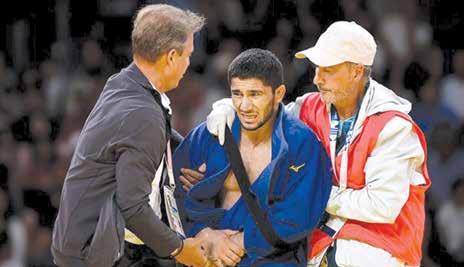
must also remember that Hashem loves all of His creations and so much wants their teshuvah. Hashem even wanted Pharoah’s teshuvah. Hashem is good to all – tov Hashem lakol “Karov Hashem lechol korav, lechol asher yikra’u’hu b’emes.”
The reason for Hashem punishing peo-
va teaches us this point in Pirkei Avos 3:14. “He (Rabbi Akiva) would say: Beloved is man, since he is created in the image [of G-d]. A deeper love – it is revealed to him that he is created in the image, as it says (Genesis 9:6): ‘For in G-d’s image He made man.’”
“Karma,” so to speak, directs the individual to the exact location and area where he had stumbled.
ple with “karma,” explains Rav Michel Yehudah, is that He wants us to know exactly what we did wrong so that we will know exactly how to do teshuvah so that we can come back to Hashem. “Karma,” so to speak, directs the individual to the exact location and area where he had stumbled. Specifically, what did Emomali do wrong? He failed to treat his opponent Baruch Shmailov as a mensch. Every human being is created in the Divine Image and reflects Hashem Himself. Rabbi Aki-
Emomali disrespected that Divine Image within his opponent and did not even give him the courtesy of a handshake. It’s possible that, k’v’yachol, Hashem said to him, “You mistreated a reflection of the Divine image, you will thus also be treated not as a reflection of the Divine Image.”
While some readers may question whether Hashem is really concerned with the Tteshuvah of Emomali, we may point out that we do find that when Avrohom Avinu was in the home of Avimel-
ech and Avimelech kidnapped Sarah his wife, Hashem had punished him with a “karma-esque” punishment in that his excretory system was not functional. This was on account of his immoral designs on Sara Imeinu, rachmana litzlan Yet, even still, we see that Hashem wanted Avimelech’s teshuvah.
Let’s also realize that in chapter 42 of Pirkei DeRebbe Eliezer we find that Hashem took Pharoah from among the dead and placed him as king of Nineveh. Eventually, Hashem sent the Navi Yonah and Pharoah did teshuvah. (Whether this was an example of Hashem employing time-travel is not relevant here – the point is Hashem’s concern for everyone’s teshuvah.)
Can a person lose his tzelem Elokim? A person can choose a life where he makes a series of horribly immoral choices in that eventually he does lose his tzelem Elokim. The Maharal implies in several places that throughout the depraved history of antisemitism, some of the nations have lost a portion of their innate tzelem Elokim. It is clear to this author that many of the Nazis ym”sh had lost their tzelem Elokim as well as many of the perpetrators of the October 7 th massacre.
On a final note, the idea of tzelem Elokim is also a means of advancing spiritual growth. Rav Yitzchok Feigelstock, zt”l, the Rosh Yeshiva of the Yeshiva of Long Beach, once took this notion a bit further. He lectured that “contemplating on the fact that we are a tzelem Elokim, that we were created in Hashem’s image (in that we have free choice – bechira), helps us realize that we are also spiritual entities – not just physical ones – and this idea keeps us on the straight path.”
By Prof. Adina Broder
To help prepare us for Tisha B’Av, we can look to some of the messages from the Kinnos. The theme of the second kinnah is about omitting a certain tefillah from our davening. Normally at the conclusion of Shabbos, we say a prayer beginning with the words “Vehi Noam.” However, when Tisha B’Av falls out on Saturday night, that tefillah is excluded. Why would that be? What is it about Vehi Noam that is inconsistent with Tisha B’Av?
One explanation is that Moshe Rabbeinu had composed the prayer of Vehi Noam as a blessing to Bnei Yisrael upon completion of the Mishkan, which was the prototype for the Beis Hamikdash. Therefore, it wouldn’t be proper to say this tefillah on the night that the Beis Hamikdash was destroyed.
But I’d like to suggest another explanation. One phrase in Vehi Noam says that “Hashem will send His angels to protect you.” This is referring to the weekday angels that join us at the conclusion of Shabbos. Normally, we greet these weekday angels on Motzei Shabbos with the Vehi Noam prayer, just as we welcome the Shabbos angels on Friday night by singing “Shalom Aleichem.” However, we can’t do this on Tisha B’Av. We can’t greet these angels when the Ninth of Av is Saturday night because there is a prohibition against offering a greeting on Tisha B’Av.
This restriction informs us as to the behavior that we should be practicing the rest of the year. The fact that we are barred from greeting people on this singular day lets us know that every other day we should acknowledge people that we encounter and address them warmly. Greeting others isn’t just a courtesy; it’s a way of telling people that you recognize their presence. You are demonstrating that you value them and affirm their worth.
The following story illustrates how

a simple greeting can be life-saving. There was a woman who worked at a meat distribution factory. One day, in the late afternoon, she went into the meat freezer to inspect something. Somehow, the door closed, and she was locked inside. Although she screamed and knocked with all her might, no one could hear her from inside the freezer.
Five hours later, after the other workers had gone and the woman was on the verge of death, the security guard of the factory opened the door. The woman was miraculously saved from dying.
She asked the guard how he had come to open the freezer door, since that wasn’t his usual routine. He explained: “I’ve been working in this factory for 35 years, where hundreds of workers come in and out every day. Most people treat me as if I’m invisible. But you’re one of the few who greet me in the morning and say goodbye to me every evening. When you came in this morning, you greeted me as you always do. But this evening, I realized that I hadn’t heard
you say ‘goodbye.’ I look forward to your morning and evening greetings every day because they remind me that I am someone worthwhile. By not hearing your farewell today, I thought that something might have happened. That’s why I went searching for you.”
In this story, the act of greeting someone literally saved a person’s life. But even if our greetings don’t have such a monumental effect, they can certainly uplift other people and increase their sense of connection to those around them. This is especially true when our greeting includes a smile and expresses genuine caring.
Rav Yochanan ben Zakkai was meticulous in this middah , making sure that every person with whom he came in contact received a warm greeting. In fact, it is said about him that no one ever managed to greet him first.
Given the importance of greeting others, one might wonder why Tisha B’Av includes a prohibition against doing so. Wouldn’t you think that on Tisha
B’Av, of all days, we should be sure to offer others a greeting?
One reason for abstaining from this social etiquette is that on Tisha B’Av, we take on the practices of an aveil, since we are mourning the loss of the Beis Hamikdash. Just as a mourner would find a cheerful greeting to be out of touch with what he is experiencing, that is how we should feel on Tisha B’Av. Another reason is that a greeting serves as an invitation to conversation. On Tisha B’Av, we should be focused on our grief, rather than engaging in small talk with those around us. Without the greeting as an opener, conversation is discouraged.
There is a side benefit to this halacha of barring greetings between people, in that it allows each of us to get a small taste of what it feels like to be ignored or excluded. Not offering a greeting fails to acknowledge the other person’s existence and strikes at the heart of the most basic of human needs: inclusion and social interaction. Perhaps this experience, however brief, can raise our sensitivity to the importance of greeting everyone we encounter. This sort of acknowledgement creates warm feelings between people, which is the essence of ahavas Yisrael.
For more inspiration during the 9 Days, please listen to my upcoming 2024 audio series: Mourning with Meaning, from the OU Women’s Initiative.
Professor Adina Broder, MS, JD, is the author of Meaningful Kinnos, Meaningful Viduy and Viduy Booklet for Kids She is a professor at Touro Graduate School of Education and a Judaic Studies teacher at the Hebrew Academy of Nassau County. Prof. Broder is a frequent presenter for the OU Women’s Initiative, where she has an upcoming series for the Nine Days.
The minute you land in Israel as an Oleh Chadash, you get an identification card that is called Teudat Zehut. I have no idea what that means. I do know that when you leave the house, you better have that card.
Get a phone wallet and keep it there. This card is your identity number that includes an unflattering picture of you. Anyone who has had any kind of legal picture taken lately – passport, driver’s license – is familiar with the protocols; no hat, no glasses and no smiles. You, at your best.
For the past several years, I have used my phone as a lifeline. It connects me with everything in my life. Like many in my circle, we mostly communicate through WhatsApp, an amazing communication tool. The phone is always with me, but I nevertheless lose or misplace it many times during the day.
On the back of my phone, I keep a small wallet that holds very little; in America, it sufficed with a license, a credit card and a AAA card. With our Aliyah, those needs have radically changed. I now need room for my Teudat Zehut, Rav Kav (bus pass), health card and who knows what else may be coming my way as I schedule the myriad of meetings and appointments needed to emigrate.
At the Ministry of Immigration today – not to be confused with the laundry list of ministries in charge of every aspect of life in Israel – Ilana, our “liaison,” took us through the steps; it was like being in a “Seinfeld” episode. When she was done looking for documents, finding the information, making and redoing copies, she left us with these words of caution: “Yes, Israel is a bureaucracy that is run by Jews who have always lived on the edge because they are physically surrounded by people in countries who act like animals.
“We have no choice.”
When I got my Israeli credit card (it is the only type of card taken by some enterprises and stores here) in the mail (a whole other adventure), I tried to register it. I have no understanding of the instructions written in fine Hebrew print, and therefore I could not activate it.

By Barbara Deutsch

No worries, our granddaughter Penina will help to figure it out when I see her.
Penina and various other friends and family, fluent Hebrew speakers, help us navigate the winding demands of everyday life.
For example, while boarding the bus on our way to a shiur, I flashed my bright green and yellow Rav Kav at the bus driver. Wrong. There is a machine that sits behind the driver’s seat, and you have to tap it like you would a credit card box. It worked for everyone but me.
After half the bus of barely-mobile dual-language passengers came to my rescue, it was determined that I had no money on the card. Three different people swiped theirs in an effort to pay for me; there are strict laws about cheating the system. Again, no way! Once a card is swiped, you can’t use it for someone else.
Never try to double-swipe an Israeli bus card machine – you can be arrested (there are stories about that, too).
Because most of the riders were “seniors” and fearing that any one of the “old” people might fall, the bus driver chose to ignore my unpaid ride. I sat down between my new friends and tried to figure out what went wrong. Why didn’t my senior card register that it was a free paid ride?
When I originally got the bus card, they
had checked my Teudat Zehut and took an extra unflattering photo. It clearly notes my birth date (you have to be over 75) and the photo of my “Snow White” hair gives away a lot of info. My card had no money because it wasn’t supposed to have any money.
As I have heard over and over again, “This is Israel” and I was given the wrong card. I was supposed to get the gold one. I got that one the next day with Penina navigating the process. But that was not until after I had already loaded the card with my friends app for the return trip.
To my surprise, when I got the new card, the clerk uploaded the money from the green and yellow card back onto my credit card. This, too, is strange, as the card used for loading was not mine but my helpful guide, mentor and friend Dora’s. She has been here for a few more months than me and, as an expert, has the Rav Kav app.
We figured that Bob’s card would also have issues as we got his at the same time and place as my old one. We went together to get him a gold one at our original place. The clerks looked at his card, figured out that everything was OK and there was no need for a replacement; the clerk had just neglected to “open” it.
No gold card for Bob. He was given his original card back, told not to worry in true “this is not an issue shrug” and sent home.
“It’s open now, use it!”
We don’t need the app; our cards are free and there is no need to load or reload. Unless they aren’t, that was told to us yesterday but not today.
We mostly walk.
That’s how it goes in Israel. Every single thing we accomplished felt really good as we checked it off our long, long list – but not so fast. In Israel, there is no doubt that you will have to do it again.
Bob and I went to our Kupah to register and get our medical card; quite simple. You join the best local one and the one every other person who has been in Israel a week more than you recommends, show your Teudah Zehut (never leave home without it!), and you are issued a fancy health card and an appointment with a doctor that you have chosen. This primary care doctor becomes your docking station for all of your medical needs.
On a different day and in a new location, you meet your doctor, a good choice and a lovely person who takes your medical history. It’s a good idea to bring any and all medical records with you. We wrongly thought that as all of our records were easily accessible online through our Northwell port we didn’t have to shlep all the paperwork. Mistake – the Kupah has zero interest in downloading them.
When Bob handed the doctor his medical card, the good doctor looked at him and smiled. “This is not your card. Was someone else getting a card at the same time that you were?”
Luckily, he got a new card on the spot. In the immortal words of “our new best friend” at the Immigration Ministry, “Nothing in Israel is easy!”
Not worried (yet)!
Barbara Deutsch is the former associate principal at HANC, middle school principal at Kushner, and Dean of Students at Yeshiva of Flatbush. A not-retired educator, she is trying to figure out life in Israel through reflections on navigating the dream of aliyah as a wife, mother, grandmother, great-grandmother and friend.

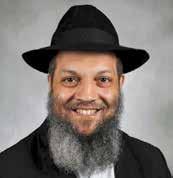
By Eliyahu RosEnBERg
rom a young age, Rabbi Yossi Kulek understood that he was unique in ways that some people couldn’t appreciate. Although he was a Jew from birth and a Lubavitcher since before he could even remember, the color of his skin would often set him apart from his peers. Yossi was Black; virtually everyone else in the Chicago neighborhood where he grew up was not. A selfless, good-natured boy, Yossi Kulek was respected and adored by most people, but
some, through their own misguided beliefs, failed to give Yossi a chance to shine.
Yossi realized early on that he had darker skin than most people, but he never thought that others saw him or thought to treat him differently because of that fact – that is, until he was around nine years old. Sukkos had just arrived, and Yossi, like many of his peers, decided to use the holiday as an opportunity to inspire non-religious Jews through
Every neshama, every one of us has infinite value. a nd we are precious, we are pure. you know, a yid is a yid. a nd as the Baal shem Tov would say, ‘ if somebody sees a flaw in someone else, that’s just a reflection of themselves.’
My parents are absolutely amazing. a s i said in the beginning, we grew up without money. in fact, we were probably one of the poorer families in the Chicago community. But my parents loved having guests, and they never said no to anyone.
That experience has stayed with me for life. it’s been a big source of strength through some of my difficult times. The Rebbe was telling me he loved me. a nd the Rebbe was telling me that i mattered. a nd i held it very dear that no matter what anyone else said to me, no matter what happened, i always said: ‘ you know what? The Rebbe loves me. The Rebbe believes in me. i ’m in this for the Rebbe.’
outreach. Thus, the nine-year-old stood in front of a local restaurant called The Bagel holding a lulav in one hand and an esrog in the other. Should a secular Jew pass by, Yossi knew what to do: he would offer them the opportunity to do the mitzvah of the day.
And so, when Yossi saw an older man walking by, he jumped into action and eagerly offered the gentleman an opportunity to shake the lulav and esrog. But the man didn’t accept the offer. Instead, he stopped and stared blankly at Yossi for a moment. The man’s expression then transformed into one of amusement, and then, he started to laugh.
“Are you kidding me? I look more Jewish than you!” the man exclaimed, laughing at the child. And with that, the man walked away, leaving nine-year-old Yossi with the unfamiliar, confusing feeling of rejection. Yossi had never previously considered the notion that the color of his skin could hinder his ability to “look” Jewish.
“That’s a moment that really stuck with me. As I got older, I processed being perceived and looked at differently,” Rabbi Kulek explained. “And when I hit adolescence, I kind of learned the hard way that it wasn’t the best idea for me to tell people that my biological father is Black.”
The issue was that some of the people in Yossi’s life held racist views about Black people, which they didn’t hesitate to voice in his presence. Unfortunately, the boy was eventually convinced of the legitimacy of the false racial stigmas and stereotypes he was bombarded with and thus began to see himself in a negative light solely because of the color of
his skin. Burdened with racial insecurities, Yossi went through his younger years, unfortunately believing that his bi-racial identity was a curse. Moreover, he sadly felt that his dark skin was a poor reflection of the type of person he was inside.
His childhood was certainly challenging, but through it all, Yossi Kulek was always able to count on his family and friends to give him the strength to persevere.
“I had some good friends who really protected me and stuck up for me. I remember, when I was twelve years old, hanging out with some boys near Brisk Yeshiva, a boy called me the N-word, and I didn’t know how to react to that,” Rabbi Kulek recalled. “My friend Shmuley couldn’t handle it, and he just immediately decked the kid. I even get a little emotional thinking about it.”
But there was one individual, in particular, whose unconditional love and warmth comforted Yossi the most through the hardest of times. That person was the Lubavitcher Rebbe.
* * *
Yossi’s mother was just seventeen years old when he was born. A secular Jewish girl and a bright student, she had befriended an African-American man named Robert in 1975. He was a charming, likable fellow who was the same age as her, and they would attend parties together. They enjoyed each other’s company and liked each other very much – so much so that they wanted to start a family and get married. But that wasn’t to be.
As soon as Yossi’s mother got preg-
nant, Robert began to show his true colors. He started to abuse her, both physically and emotionally, doing everything in his power to make her life miserable. Robert was unfaithful and cruel, an evil shell of his former self. As is the case with many victims of abuse, Yossi’s mother didn’t want to leave Robert. Instead, the girl prayed to G-d – despite the fact that she wasn’t yet religious – that the man she once adored would go back to his old, kind ways. But their relationship only went down from there, especially after Yossi’s birth in 1976. Alas, the straw that broke the camel’s back was when Robert yelled at Yossi’s maternal grandmother for holding him. In Yossi’s mother’s mind, it was one thing for the man to mistreat her; it was another thing entirely for him to hurt her loving mother.
But breaking up with Robert wouldn’t be a simple or painless process, as he would continuously harass her, often knocking incessantly at her door. She thus had no choice other than to take her six-month-old baby and run away. The only place that would take her in was a Chabad House in Cleveland. Years later, Yossi’s mother would learn that soon after she fled, Robert was arrested and sentenced to a few years in prison.
“My grandmother knew that my uncle had been going to a Chabad House in Cleveland, and she called them and asked for help. That same day, without much thought, [the shluchim in Cleveland] Rabbi Leibel and Devorah Alevsky took my mother and myself, a six-month-old, into their home,” Rabbi Kulek recounted. “They saved my mother, and they saved me. And that was the beginning of my connection [to Yiddishkeit].”
That summer, Yossi’s mother, with the encouragement of her hosts, decided to study at Machon Chana, a seminary

in New York. Her time at the Alevsky family’s home was so inspiring and spiritually uplifting that it convinced her that Orthodox Judaism was the right path for her and her son. She thus moved to New York with her baby boy to start the next chapter of their lives.
“She’s told me many times that I was really a gift from G-d for her and every decision and every choice that she made really revolved around me,” Rabbi Kulek explained. “And that’s really my mother’s personality. She’s very selfless. You know, we didn’t grow up with a lot of money, but she always put her kids first. She would wear schmattas, but she always made sure that her kids had clothing.”
When Yossi was four years old, his mother met the man whom she would marry; the only father Rabbi Kulek would ever know and love. When the two got engaged in 1981, they went to the Lubavitcher Rebbe for a bracha. The meeting took place in the middle of the night, and they decided to bring Yossi along with them.
As the meeting commenced, the couple and child stood before the Lubavitcher Rebbe, who was seated behind a wooden desk that was so big that it towered over the four-year-old. The Rebbe looked straight into Yossi’s eyes and gave the boy a big, warm smile. As Rabbi Kulek explains, although the meeting was supposed to be about the soon-to-be-married couple, it instead became about himself. The Rebbe, showering the boy with attention and love, started talking to Yossi about the mitzvah of tzitzit.
“That experience has stayed with me for life. It’s been a big source of strength through some of my difficult times,”
Rabbi Kulek explained. “The Rebbe was telling me he loved me. And the Rebbe was telling me that I mattered. And I held it very dear that no matter
what anyone else said to me, no matter what happened, I always said: ‘You know what? The Rebbe loves me. The Rebbe believes in me. I’m in this for the Rebbe.’”
If there’s one thing Rabbi Kulek’s infinitely grateful for, it’s his incredible family. When he was six years old, he was adopted by his mother’s husband, whom Yossi has always considered his one and only father.
“I have a father. He’s the only father that I have, and he’s been my hero. I haven’t lacked anything; I’ve been blessed to have a beautiful family of eleven siblings, and I’m embarrassed to say, I’ve lost track of how many nephews and nieces I have, but I think, last time I heard, it was over forty, kein ayin hara!” Rabbi Kulek said.
“Every one of my siblings looks at me the same as they look at the rest of them. I’m not a half-brother; I’ve never considered myself a half-brother. They’ve never tried to look at me that way. On the contrary, I’m the oldest brother,” Rabbi Kulek explained. “They all look up to me. My family, my siblings, have always adored me and they make me feel like I’m on top of the world.”
It is from his incredible parents, who always had guests over despite their financial challenges, that Rabbi Kulek learned the unbelievable value of doing chessed.
In 2000, Rabbi Yossi Kulek and his wife Dalia became shluchim in West Hartford, Connecticut, serving under Rabbi Joseph and Rebbetzin Miriam Gopin, the shluchim of Greater Hartford. In 2003, Rabbi Kulek became the campus Chabad rabbi of the University of Hartford. Since then, he and his wife have helped countless students grow closer to Yiddishkeit. In fact, many of Rabbi Kulek’s alumni are frum now thanks to his efforts.
“My style is one mitzvah at a time. I
don’t pressure, I don’t push, and it’s the right approach for the students at University of Hartford,” Rabbi Kulek said. “G-d willing, I have two boys, one alumni and one who’s going into his sophomore year, who are going to go with me to Israel because they’re going to yeshiva. And that’s my nachas. So, it all starts with opening your home, opening your hands, and having love.”
In fact, it is through helping others reach their spiritual potential that Rabbi Kulek has been able to make great strides in healing his emotional wounds from the past. He realizes that his childhood experiences are what shaped him into the incredible person he is today.
Among the many responsibilities he has taken upon himself, Rabbi Kulek is also a chaplain in the Department of Corrections, where he works to rehabilitate incarcerated individuals.
“Baruch Hashem, most of the incarcerated that I deal with are not Jewish. But I see human beings, I see people who have struggles, like everybody else. Some of them have horrible stories or circumstances that brought them to where they are,” he explained. “Many of them accept and acknowledge what they’ve done wrong, but I try to treat them like equals, and they feel it. I try to treat them the same way I want to be treated.”
Rabbi Yossi Kulek is a proud father of seven, a grandfather, and a testament to the importance of loving one’s fellow Jew as oneself.
“I really try to approach everyone with love. My mentor and my guide is the Rebbe, who said that it’s our job to go out there, spread love, and help Yidden, help Jews wherever they are,” Rabbi Kulek said. “If someone can’t have ahavas Yisrael and v’ahavta l’rayacha kamocha – if you can’t look at somebody else as yourself – then how are you helping others?”
Moderated by Jennifer Mann, LCSW of The Navidaters

I am a very private person. I am very close with my friends – we have all been dating for a few years – and we spend a lot of time together. My friends are super open about who they are dating and how it’s progressing. But that’s not my nature. When it comes to really personal things, I’m more of a “closed” person. My friends always make fun of me that I’m like this. They know that’s not my nature to share every detail of my dating life, which I feel is private.
I am dating someone for a few weeks now and am hoping that it will progress and eventually be the right person for me. My friends know that I’m dating someone, but they don’t know that I feel that this is “the one.” My concern is for my friends. I don’t want to tell them about who I am dating before I get engaged, but I am concerned that they will be hurt if I don’t tell them beforehand. Do I hint that I’m dating someone seriously before I get engaged? I’m hesitant to do that because I don’t want them to try to get more “info” from me because that would make me stressed that I don’t want to share it. I really love my friends and don’t want them to be hurt if they find out that I got engaged without telling them beforehand. What do you think is the best way to handle this?
Thank you!
Rachel*
Rebbetzin Faigie Horowitz, M.S.
Don’t stress about this now. When the two of you are ready to close the deal and commit to one another, discuss this with the young man or young woman.
S/he will be your life partner. S/ he should understand you by then and know that you have kept things private. S/he will appreciate that aspect of your personality and that the relationship was not publicized. S/he will be sensitive to your needs and your desire not to hurt your friends. Use this opportunity to work on a challenge together.
Michelle Mond
Iam so happy for you that you are dating someone whom you see a future with! In my experience, it is a mistake for singles to share their dating lives with friends. While friends are well-meaning, there are many instances I’ve seen where friends end up sabotaging a relationship.
I was just talking to someone this week about this exact scenario! An amazing young woman approached me to set her up with a guy she had dated two years ago. At the time, she said no to him because two of her friends fed into her insecurities by speaking about his presentation. “Are you sure you want to settle with HIM? Didn’t you always say you wanted taller?” She started feeling self-conscious and couldn’t look at him in the same way. She ended the relationship, and now, years later, she has terrible remorse and he has yet to agree to date her again. This is just one example of the many scenarios I have seen play out.
Especially since you are a more private person and don’t usually disclose personal things, my advice is to stick with what you are comfortable with. When these friends find out you are
engaged, they will be just as happy and excited for you!
I will end with an important disclosure: it is important to have your “people,” whether it is parents or a wise mentor, who are not nagoya b’davar, to help you navigate bumps in the road. Choose your close circle wisely!
Tzipora Grodko
Iso appreciate your sensitivity, and your friends are lucky to have you. I’m going to share a very important lesson that I live by: just because someone got hurt, doesn’t mean you did something wrong.
If it’s in the best interest of your relationship and wellbeing to keep this PERSONAL part of your life, well… personal, then you don’t need anyone’s permission to do so. If you still feel nervous, you can choose to make a personal, intimate announcement with individual friends before going public. It’s tough, but you need to do what’s best for you, even if other people might not like it.
Firstly, I think it’s very considerate and sensitive of you to think of your friends.
You shouldn’t feel obligated to tell them everything. Maybe you would consider telling your friends closer to leading up to the engagement – might sound crazy, but maybe even on the way to the engagement.
In this case, if you’re a private person by nature in general, I’m sure they will understand.
The right friend will be happy for you no matter what.
Dating is beautiful, but at the same time, it can take a toll and open up all these different emotions. Having time
for yourself and not having to worry about what others think, updating everyone and hearing all these different opinions, may be what you need. It can be good sometimes to keep things private and take the time to focus on the two of you.
You shouldn’t feel guilty!
Yonah
This is a valid question, and I had similar feelings throughout dating. Initially, for me, my hesitancy in sharing details and giving updates on my dating life came from the angle to avoid unnecessary stressors to myself. I didn’t want to be asked questions about my dates, even from close friends and family. I didn’t want unsolicited advice or opinions. I just wanted to date, feel how I felt about the girl and not be influenced one way or the other by people whose remarks were based on assumptions or limited knowledge, so I kept
It’s tough, but you need to do what’s best for you, even if other people might not like it.
dating between me and myself. This mentality concerned people close to me; they felt left out of an important stage of my life. Additionally, I later recognized that I was missing out on valuable support from people who genuinely cared about me and had constructive advice to share.
After dating for a few years, I real-

ized that, like most things, a healthy balance could be achieved. I began sharing some dating experiences with my family and close friends. I was surprised to find that their feedback was usually reassuring to how I already felt, which helped me through my decisions. Equally as important, their concerns and worries about me dissipated.
My advice would be to share thoughtfully. There may be those who are asking simply to “hock,” and you definitely don’t have to get into details with them. Those close to you, who genuinely care about you, will however be thrilled to know that you are doing well in this area of your life. Their excitement will reflect back to you, and I believe you will find that sharing good times and positive feelings with those around you will encourage and elevate your experience as well.
Wishing much hatzlacha!
Dr. Jeffrey Galler
My internal alarms scream, “Do not share this very personal aspect of your private life with your friends!”
Perhaps maliciously, or perhaps inadvertently, your friends could easily ruin your relationship with your boyfriend. I’ve heard of too many situations where “helpful” friends can sabotage a potentially wonderful relationship.
Sometimes, “friends” might say something like, “I know about this guy. He is definitely not for you. You can do much better.”
Why would a single girl’s friends ruin a nascent romance? Perhaps they genuinely mean well and are trying to be helpful. Perhaps they are jealous. Perhaps they don’t want to lose a single friend to married life.
The Navidaters
Dating and Relationship Coaches and Therapists
Thank you for writing! I can certainly appreciate that you are a private person. I can also appreciate that you are 1,000 percent entitled to your privacy. It seems (and I could be wrong) that you might be having some difficulty putting your needs before the needs of your friends and you are worried more about their feelings, i.e., them being hurt than your own needs and feelings. If I’m wrong about that, scratch this entire response. If this is feeling right, or in the neighborhood of “Yeah, that resonates,” keep reading.
I don’t believe that any of us “owe”
anyone any information. If we feel that being asked questions is an invasion, and that gives rise to anger, or we are just don’t feel comfortable with sharing because we don’t want to let anyone in because we are scared of vulnerability, this is different issue. Keeping things on the down-low is a choice. Just like sharing about dating is a different choice. And we are all entitled to our choices. If your friends are angry at you or hurt with you for your choice, there is nothing you can do about that, nor should you have to
It doesn’t matter what their motivations might be. My instincts are to beware of sharing such personal information prematurely.
But, then, I shared my opinion about this issue with my wife, who besides being my best friend is also my harshest critic. She accused me of thinking like a man and failing to realize that even very introverted, “closed” women share things with their deepest and closest friends. She explained, “Her friends will be an important part of her life, and she shouldn’t risk harming solid friendships with women who have been there for her through thick and thin.”
So, what should you do?
Since your friends already know that you’re dating someone, and since they already know that it’s not your nature to share dating details, you can say something like, “I’m really happy with how things are going, but I want to keep the details private until things are more settled.”
I’ve heard of too many situations where “helpful” friends can sabotage a potentially wonderful relationship.
Let your friends know that even though you won’t be revealing details, it does not reflect how much you value their friendship. You can say, “My privacy might seem unusual, but please know that I care deeply about our friendship, and I’m excited to share more with you when the time is right.”
do about that.
I can give you some advice to your questions about what to say and how much to reveal, but I think that wouldn’t be touching upon what may be driving this question: how to be comfortable making your needs a priority and not worrying about or feeling responsible for what others think or how they will feel. So, I think the best way to handle it is to ask yourself, “What do I need?” and “What is coming up for me around making myself a priority?” “What comes up for me when I have acted kindly and in my best interest, at the thought of someone being upset with me?”
It’s worth mentioning that it might be worth exploring your need for this privacy with close friends. I’m wondering if you have anyone that you talk to, bounce ideas off of, or confide in when it comes
to your private matters. I’m wondering if privacy feels sacred or if what feels private is what causes you anxiety, shame, worry, guilt or any other uncomfortable emotion. In other words, is the privacy serving you or guarding you?
If you’re ready and/or would like to make a boundary (and remember, boundaries are kind and they are the path that allows others safe entry into our lives) with your friends, because you want to, you could say something like, “You guys know I am a private person when it comes to my dating life. I wanted to let you know that I am dating someone. I cherish our friendships and want to include you in my life, and I also need some privacy around it as that’s my style and way.”
Wishing you all the best!
Warmly, Jennifer

By Sara Rayvych, MSEd
Iwoke up Erev Shabbos, opened my mouth to say something, and I couldn’t speak. I was only mildly surprised to have lost my voice. I had been sick for a few days with a virus I was sure I had picked up from one of my kids. That child’s last days of being sick came with losing her voice, too.
I have noticed an interesting phenomenon whenever I’ve lost my voice. As my voice gets quieter, the children’s follow. As I could barely speak above a whisper, my children, too, were speak-
ing to me in hushed tones. The children didn’t even realize they were speaking quietly, until another one would say, “Why are you whispering, too?” This happened multiple times throughout the day, and my house was, overall, a little quieter than usual.
This unintended social experiment was a further reminder of the importance of tone of voice within a family. We naturally raise our voice the louder the children do, but that’s not always the best course. Yes, we may have to speak


loudly to be heard in a crowded park, but trying to out-scream a misbehaving child is rarely the best option.
Tone of voice is an important part of communication. We can convey anger, warmth, happiness or longing simply with the tone we use. For example, let’s take the phrase, “What are you doing here?” It could be said with surprise or excitement, and they’ll know we are thrilled to see them. It can also be said with anger or disappointment, and they’ll realize we are sorry they arrived. It’s the same words, but the meaning is worlds apart.
I’ve been able to appreciate the role of tone of voice since getting married. While many may joke they don’t speak the same language as their in-laws, I truly do not share a common language with my in-law. I’ve been pleasantly surprised how well we can communicate despite this hindrance. It may have taken a while to understand each other, but these methods of communication are unexpectedly effective. Beyond words – which are certainly important – is an entire realm of nonverbal cues. Tone is just one of these, but it’s a major part of communication.
I’m using the simple word “tone” to describe the many different aspects of our voice that are beyond words. This includes pitch, volume, word emphasis and rate of speech. It’s a miracle from Above that we have so many ways to convey meaning – and we often don’t even need to think about it.
While holding a friend’s baby, a woman sternly told her own six-yearold to stop what he was doing. The baby became very upset and began to cry, quickly rushing towards safer arms. She had not yelled, nor had she been addressing the baby, but the little one still felt unsafe.
Tone plays an even more prominent role with babies, children and anyone who may not fully understand our language. When we don’t have words, we have to use facial expressions, behavior and tone to make sense of the world around us. Babies are especially sensitive to the way we speak and will judge the safety of their environment based on the volume and tone of the adults around them. It’s when we are speaking to the youngest of people that we need to be especially careful with our tone. Children very much care how their parents view them and want to feel loved. As parents, we want our tone to convey warmth and affection. We can make even our everyday, mundane conversation meaningful when we keep our tone warm and friendly. We can also maintain eye contact with our children while they speak with us, showing them how much we value them.
At times, our tone may conflict with our words, causing confusion. We could mean one thing, but the opposite meaning is conveyed. We want our intentions to be clear, and appropriately controlling our voice provides clarity
and accurate meaning to our words. While it may sound silly, it can be very helpful to practice the way we speak. This can be done in private, or with someone else listening. Mirrors are optional. This gives us the opportunity to get our tone to match our meaning when we’re not under stress or distracted.
It’s not uncommon for parents to raise their voice over and above that of their screaming child. This is instinctive, but rarely effective. This can quickly escalate, and nobody wins.
When adults yell at kids, it’s often a sign the parent has lost control. The adult feels more out-of-control as they yell, and a vicious cycle begins. I want to stress that adults cannot win under these circumstances. Even if the adult “wins” that battle, they’ve still lost because of the resulting damage to their child and their relationship.
It’s often the calm tone of a parent that can deescalate an emotionally charged child. This will more quickly restore peace and allow the parent to be mechanech their child effectively. Additionally, maintaining an even tone
keeps the parent calmer, too.
To be most effective, our tone should not be aggressive, but emotionally even. We should speak in a normal volume, not raising our voices. We can sound firm, we can sound serious, but we want to appear
Additionally, children know if a parent frequently screams, and they may quickly tune out that adult’s yelling. In contrast, they will respond quickly when they hear a generally calm-speaking adult raise their voice. They under -
It’s often the calm tone of a parent that can deescalate an emotionally charged child.
in control of ourselves and the situation.
In general, adults should try to not get angry or lose control. I know this is asking a lot, and this is more of a goal than something I expect anyone to magically acquire from reading an article. It takes practice and working on oneself, but knowing how much this can make a difference can be the impetus for change. This isn’t an allor-none, and parents should appreciate the improvement they can make just by remaining calmer longer or in circumstances they couldn’t previously.
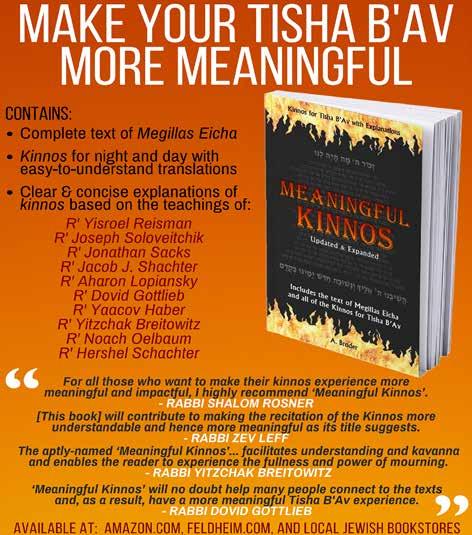
stand that if a calm-speaking parent yells, it’s important or an emergency.
We are our child’s main teacher, and they learn to communicate from watching us. We are setting these precious children on the path for their future relationships. It’s we who teach them how to behave and what is appropriate to expect from others.
We certainly want them to learn to develop healthy and positive relation-
ships as they get older and reach adulthood. As they observe how we speak to them, they will learn how to parent. When they see us address our spouse, they will learn how to talk to their own spouse. And, most importantly, from seeing how we talk to our loved ones, they will absorb what they should expect from those around them. What should they expect from their close friends and future spouse: love and respect or yelling and anger?
Modulating our voice is one technique we can use to make every word we say more meaningful and effective. It takes practice and intention, but we can use the nuances of our voice to build a generation that is emotionally healthy and loved.
May Hashem help us to make every word we say bring bracha into the lives of those around us.
Sara Rayvych, MSEd, has her master’s in general and special education. She has been homeschooling for over 10 years in Far Rockaway. She can be contacted at RayvychHomeschool@gmail.com.

By Yeshaya Kraus, LCSW
That first argument is always the worst. Maybe not qualitatively, but it’s the worst in that it shatters the illusion that “our relationship is different.” Everyone has that illusion. “Yes, people argue, but not us. We’re going to be fine. We’re going to be in line with each other, we’re never going to disagree, and if for some odd reason one of us is ever inclined to be on a different page as the other, well, one of us will just give in to the other gracefully. It’ll be easy, because we love each other.”
And then, reality hits: we’re just like everyone else.
It may be something small, something mundane. It doesn’t really matter what it is. What does matter is the idea of it. “We’re now people who can argue. We’re not perfect anymore. What else might not be perfect?” Depending on your personality, it may not be hard to turn a mildly snippy conversation about replacing the toilet paper roll into a general commentary on the vitality of your relationship.


The truth is that disagreements are a natural part of any relationship. Research has shown that even in the most successful couples – the ones who communicate respectfully and caringly and really trust each other – up to 69 percent of the disagreements they have won’t be resolved. The difference between them and the less successful couples is all in how they approach those disagreements. Differences of opinion are facts of life; they’re always going to be there.
Granted, disagreements are a fact of life, but who says they have to hurt as much as we assume they will? There are tools and concepts we can use to reduce both the intensity of the disagreements and the natural feeling of hurt that comes along with it. Let’s take these ideas apart. In order to do that, we need to understand where disagreements and the resulting conflict come from.
Where do disagreements come from?
Let’s consider an average young couple. He’s 23; she’s 20. He’s currently in kollel, though he’s got some ideas of going into business on the backburner. They’ve been in that “cute young couple” space since they got engaged. They’ve been married for maybe five months. Point number one for both of them to acknowledge is that before they even met each other, they’ve each got more than two decades of life experience that has nothing to do with committed relationships in general, and each other specifically. Our opinions, values, wants and needs, and likes and dislikes are all direct products of our lived experiences. Two people enter a relationship with such a wealth of differences. It makes
complete sense that the way they’d approach any given situation would be at least somewhat different. It’s a given that there will be at least some situations in which they’d want completely opposite things.
These differing expectations come from assumptions we have about what would make us feel safe. For example, let’s say the matter under discussion is which school to send our kids to, or where to go for Shabbos, or even what to have for dinner. My opinion in any of these, what I want to happen, is based on what I think will make me feel good, or emotionally safer, in the situation. Not getting what I want means I don’t have what I’ve decided I need in order to be safe. As humans, we have an instinctive need to do that which makes us feel better, safer, or less threatened in any given situation. When there’s something stopping me from being able to do that, we perceive that as a threat and react accordingly.
Unfortunately, this instinct doesn’t stop just because two people are married. That’s where conflict comes from. Yes, we care about each other. Yes, we have a deep emotional bond. Yes, there’s shared life experience and what we’re trying to build together. When there’s even a small part of one of us that says that this issue is a matter of safety and self-preservation, though, all that doesn’t make much of a difference. If I don’t get what I want, I feel hurt and threatened. Even if I do get what I want, if it’s done in a way that makes me feel bad for wanting it, I still feel hurt. So what do we do about it? How can we balance out the opposing assump -
tions, experiences and viewpoints leading to expectations with the need to build mutual respect and support for each other? There are a number of possibilities.
Step one is to acknowledge whatever expectations you have in a given situation, along with any assumptions you’re making that may lead to the expectation. “If we go to your parents, I’m going to be miserable” is an expectation formed by the assumption that “this time will be no different than the last three times we went.” The expectation, along with what it’s based on, has now been communicated. Now we can start to actually work together to figure out how to navigate it as a couple.
This is not a one-sided deal. Any time we share something of ourselves that hasn’t been shared before, we’re exercising vulnerability and trust that it will be taken the right way. The only way I’m willing to take a chance and share something about myself is if I trust that it won’t be taken advantage of, and that it will be respected, regardless of whether or not you agree with it. Whoever I’m sharing with has to be aware of that and take the role of supportive
listener seriously. It’s not a switch you can just turn on; it has to be consciously developed from the beginning.
The listener has to learn to be receptive. This means not just hearing the words but being able to get into a state of curiosity about what the other person is saying and really trying to understand it properly. If I’m listening, I’ll
rience. It’s not coming from you. There may be similarities, but the odds of me getting it exactly right are pretty low. That’s something I need to allow myself to acknowledge.
We mentioned before the assumption that whatever the other person is thinking or saying has something to do with me. That’s a particularly dangerous
Our opinions, values, wants and needs, and likes and dislikes are all direct products of our lived experiences.
probably have some assumptions about what you mean, why you’re saying it, and what that means about me (we’ll get back to this one), the situation, and our relationship in general. I need to notice those and walk them back. I need to understand that the one thing that’s probably not true is exactly what I’m thinking about what you mean. It’s my assumption; it’s a product of my expe -
assumption to make. Yes, we’re having a difference of opinion, but that doesn’t mean your opinion or reaction to my opinion is anything more than just that – your opinion. If I’m able, I can remind myself of that. If I need to, I can look at whatever evidence I have that it might be more than just an opinion. Odds are, though, it’s not personal. Just as any other opinion, it’s based on experience,
assumptions, and expectations. It’s not based on me.
It’s very common for young couples to learn about the importance of being mevater. This can be a beautiful idea –deciding that something is truly worth giving up on, that it’s really not necessary. It’s a great skill to have and use appropriately. Possibly a more useful skill is that of measuring our own assumptions, noticing our expectations, and learning how to appreciate and respect those of our spouse. Starting marriage with that mindset helps use the inevitable differences of opinion as grounds for growth and creating closeness.
Yeshaya Kraus, LCSW, is a therapist in private practice in Far Rockaway. He specializes in men’s mental health, parenting, relationships, and dating. He is also the creator of the Building Together workshop for engaged and newly married couples, and speaks publicly on a variety of topics, including dating and marriage. For inquiries or to register for the Building Together online workshop, email him at yykraus@ gmail.com or WhatsApp at 917-412-5824.



By Tehila Levine-Soskel, RDN, CDN
Sweet desserts, crispy snacks, and deli meats are probably what comes to mind when you hear the terms processed foods. While those all certainly are processed, processed foods mean the food product was changed from its “natural state.” Washing, freezing, baking, and adding ingredients are all considered processing. There are some benefits of processing foods such as preservation and the ability to eat healthier products. For example, vacuum-packing meat prevents spoilage, and canning or freezing fruits or vegetables help the products stay fresh for longer. Another benefit of frozen fruits and vegetables is that they are usually frozen at their peak and will help maintain their nutritional quality. More
so, bagged lettuce and packaged greens make it easier to consume as part of a meal as opposed to prepping it yourself.
Canned tuna, salmon, packaged cottage cheese and yogurts are considered minimally processed and can all be part of a well-balanced diet. The foods we want to try to limit or avoid are heavily processed foods like pizza, cold cuts, and desserts. These items and many others are filled with added ingredients that will cause more harm than good to your body. Some of the added ingredients include salt, sugar, artificial colorings, and many preservatives. These food additives are composed to keep you wanting more and more of the food item. According to one study, about 60% of the calories in

the American diet come from ultra-processed foods.
The American Heart Association recommends consuming no more than 2,300 milligrams of sodium per day. It may come as a surprise to some, but 70 percent of
sodium consumed by Americans doesn’t come from the saltshaker but comes from packaged processed foods. Familiarizing yourself with nutrition labels is extremely beneficial to be aware and mindful of how much salt you’re consuming. Common hidden names for salt include monosodium glutamate (MSG), sodium nitrate and

sodium citrate. As salt is a commonly used spice, there are many alternatives you can incorporate your food. Garlic, lemon juice/ zest, dill, smoked paprika, and onion powder can be great alternatives to add flavor to your dish without all the extra sodium.
Did you know the average amount of sugar consumed per day by American adults is 77 grams? 77 grams is more than 3 times the recommended amount of sugar intake. If you thought that is a lot, the average amount of sugar consumed by kids is 81 grams per day. Most of that sugar comes from fruit drinks and soft drinks. Try to avoid drinking your calories and consuming all the added sugars. When looking at the nutrition fact label, be sure to look for the added sugars. The added sugar is any sweetener that was added during processing or preparation. A study showed that almost 90% of added sugar in Americans’ diet comes from highly processed foods.
The unhealthiest type of fat to eat is trans-fat. This fat lowers your good cholesterol and raises your bad cholesterol which may increase the risk of diabetes and heart attacks. Trans-fat is found in foods like margarine, microwave popcorn, frozen pizza, fried foods, and salty snacks. A simple way to eat less fat is by choosing leaner meats and eating your chicken without the skin. Monounsaturated fats may have beneficial health benefits like lowering cholesterol and reducing risk of heart disease. Olive oil, avocado oil, and nuts like almonds and pecans are good choices of healthy fats. Although minimally processed foods can be included in a balanced diet, heavily processed foods should be limited or avoided. The ultra-processed foods pose many health risks including higher risks for cancers. The heavily added sugar, sodium and fat may lead to obesity, high blood pressure and other serious health issues. In addition, processed foods are composed to make our brain release dopamine, causing us to crave the food item even more.
As mentioned above, read the nutrition labels on food items. The next time you are about to buy something, read the label first. Look out for the ingredients as you should be able to recognize or pronounce most of them. The less ingredients in a food product, the better. An item labeled low-fat or less sugar is not automatically healthy. Shop smartly. While fresh and frozen fruits and vegetables may cost more than snack bags like chips or pretzels, the health
benefits that fruits and vegetables offer are endless. Try shopping in stores that sell in bulk as they are often cheaper.
Snack better. Choose your calories wisely. If you are looking for a snack to hold you over, opt for the more wholesome option. A fresh, juicy apple paired with some nuts will keep you more satiated than a fruit leather that you can finish in a matter of seconds. To help keep you more satisfied as well as better blood sugar balance, pair your carbs with protein or healthy fat. Add a string cheese or some nuts with your fruit for more protein and fiber. Get creative and try making your own veggie chips. Roast any vegetable you like in the oven until crispy. Understandably, there are times when a bar on-the-go is your best option over nothing, so opt for the one with less sugar and more protein and fiber.
Be your own chef. Preparing and cooking more meals at home allows you to have full control of what goes into your food. You are the chef in your own kitchen. You can’t always be in control of what you’re eating while you’re away, but as long as you’re home, you can. If you eat out often, there are a few things you can do to eat cleaner. First off, hold off on the fried options and the bread served on the table. More so, instead of eating the French fries, opt for a baked potato or roasted potatoes. Ask what is in the dish. Many soups and sauces in the dishes include heavy cream and flour. The creamier the soup and the more sauce on the dish are hints that the food includes cream or flour. Ordering that crispy lettuce salad sounds delicious but watch out for the dressing. Ask for the dressing on the side so you’re aware of how much goes in.
Often, people focus on all the things they are going to eliminate from their diet, but shifting your mindset on ways you can add to your diet can be more beneficial. Try to aim for at least 2-3 servings of fresh fruits and vegetables daily. Make sure you are drinking enough water and get in some exercise. The recommended amount of physical activity for adults is 150 minutes of moderate-intense exercise per week. Shifting your mindset to all the positive things you can add to your diet will make it more doable and enjoyable. What matters most is your overall diet. Stay balanced and consistent.
Tehila Soskel is a registered dietitian nutritionist with a private practice in the Five Towns. She sees clients for weight loss, diabetes, and other various diseases. Appointments can be made for in-person or virtual sessions: 516-457-8558, tehilasoskelrd@gmail.com, tehilasoskelnutrition.com.


by Renee Muller / Photography by Hudi Greenberger
By Naomi Nachman
These are my favorite ingredients all rolled up into one fantastic dairy recipe. My family loves feta cheese in salads, with pasta, or with this winning combo of spinach and mushrooms. Serve this dish with a nice, chilled Late Harvest Riesling. The saltiness of the feta and the sweetness of the wine are a perfect marriage of flavors.
Mushrooms
◦ 8 portobello mushrooms, cleaned and gills removed
◦ 1 cup cherry tomatoes on the vine
◦ 1 tablespoon olive oil
◦ Salt, to taste
◦ Pepper, to taste
◦ ¼ cup panko crumbs
◦ 1 tablespoon chopped fresh parsley
◦ 2 tablespoons parmesan cheese
Stuffing
◦ 2 tablespoons olive oil
◦ 1 medium onion, diced
◦ 1½ teaspoons kosher salt, divided
◦ 2 cloves garlic, minced or 2 cubes frozen garlic
◦ 2 tablespoons butter
◦ 1 24-oz. bag frozen chopped spinach, defrosted
◦ ½ cup heavy cream
◦ Black pepper, to taste
◦ 8 ounces feta cheese, drained and crumbled

Prepare the Mushrooms
1. Preheat oven to 400° Fahrenheit. Line a baking sheet with parchment paper and coat with cooking spray.
2. Place portobello mushroom caps and tomatoes on baking sheet; drizzle with one tablespoon olive oil and season with salt and pepper. Roast for 15 minutes. Set aside. Do not turn oven off.
3. In a small bowl, combine panko, parsley, and Parmesan cheese. Set aside.
Prepare the Stuffing
1. Heat olive oil over medium heat in a large frying pan. Add onion and ½ teaspoon salt, and sauté for five to eight minutes, until lightly browned.
2. Add garlic and butter and sauté for an additional two to three minutes. Add spinach and cook until the liquid cooks off, about five to eight minutes.
3. Add heavy cream and season with remaining one teaspoon salt and pepper. Stir in feta and roasted tomatoes.
4. Divide the stuffing among the portobello mushroom caps and top with the seasoned panko mixture. Return to oven and roast for 15 minutes.
Naomi Nachman, the owner of The Aussie Gourmet, caters weekly and Shabbat/ Yom Tov meals for families and individuals within The Five Towns and neighboring communities, with a specialty in Pesach catering. Naomi is a contributing editor to this paper and also produces and hosts her own weekly radio show on the Nachum Segal Network stream called “A Table for Two with Naomi Nachman.” Naomi gives cooking presentations for organizations and private groups throughout the New York/New Jersey Metropolitan area. In addition, Naomi has been a guest host on the QVC TV network and has been featured in cookbooks, magazines as well as other media covering topics related to cuisine preparation and personal chefs. To obtain additional recipes, join The Aussie Gourmet on Facebook or visit Naomi’s blog. Naomi can be reached through her website, www.theaussiegourmet.com or at (516) 295-9669.




◦ 2 (4- to 6-ounce) tuna steaks
◦ 2 TBS Raskin’s lemon pepper blend
◦ 2 TBS plus 1 teaspoon extra virgin olive oil
◦ 1 TBS rice vinegar
◦ 1 TBS soy sauce
◦ 2 tsp grated fresh ginger
◦ 1 tsp honey
◦ 5 ounces (5 cups) mesclun
◦ ½ onion, finely chopped
◦ ½ mango, peeled and sliced thin
◦ ½ ripe avocado, sliced thin
◦ Sesame seeds for garnish (optional)
Pat tuna dry with paper towels and sprinkle with Raskin’s lemon pepper blend. Heat
1 teaspoon oil in 10-inch nonstick skillet over medium-high heat until just smoking.
Add tuna and cook until translucent red at center, 1 to 2 minutes per side. Transfer to cutting board and immediately cut into 1-inch pieces; set aside until ready to serve.
Whisk vinegar, soy sauce, ginger, and honey together in bowl. While whisking constantly, slowly drizzle in remaining 2 tablespoons oil until combined.

mesclun and onion with half of vinaigrette to coat, then season with salt and pepper to taste.
Divide among individual serving bowls then top with tuna, mango, and avocado. Drizzle with remaining vinaigrette, sprinkle sesame seeds and serve.

This column features business insights from a recent “Mind Your Business with Yitzchok Saftlas” radio show. The weekly “Mind Your Business” show – broadcasting since 2015 –features interviews with Fortune 500 executives, business leaders and marketing gurus. Prominent guests include John Sculley, former CEO of Apple and Pepsi; Dick Schulze, founder and Chairman Emeritus of Best Buy; and Beth Comstock, former Vice Chair of GE; among over 400+ senior-level executives and business celebrities. Yitzchok Saftlas, president of Bottom Line Marketing Group, hosts the
weekly “Mind Your Business” show, which airs at 10pm every Sunday night on 710 WOR and throughout America on the iHeartRadio Network.
Since 2015, Yitzchok Saftlas has been speaking with leading industry experts on the “Mind Your Business” show, sharing insightful business and marketing strategies.
In this article, we’ve gathered five essential tips from business leaders on how to hire and retain a high performing team.

Refe R able Cultu R e
Marc b odner, e xecutive Chairperson at l &R Distributors
The key to attracting great talent is referability. Ask yourself, “Am I a referable person? Do I run a referable company? Are other employees recommending our workplace to their friends or family?” If the answer is no, then the likelihood of attracting superstar talent is low. However, if the answer is yes, then it’s not only more likely that you’ll attract great employees but also that you’ll retain them. The best way to attain that referability is through your company’s culture. Establishing a strong, positive company culture is about much more than having “Blue Jeans Fridays” or putting a ping pong table in the break room. It’s about enacting real behavioral changes, and that starts from the top. If you want your team to behave in a certain way when they’re talking to customers, vendors, or to each other, you have to set the example. Culture is not like installing a piece of software on your computer. It’s something that takes a long time, starting from the top and flowing its way down.

Hi R ing foR S C ale vS. gRowt H
ted Miller iii, Ceo o f t raining Mastery 3
People typically use the words “scale” and “growth” interchangeably. But I see them as very different. Growth is more about shortterm success. For example, let’s say, you want more new sales to increase your top-of-line revenue and cash flow. In that case, you may want to go and recruit an army of top-producing sales superstars on pure commission. That’s a great strategy to achieve short-term growth. But scalability is different. Scalability is focused more on long-term success and sustainability. If you build an infrastructure and culture around only hiring world-class achievers, that will give you a quick boost, but what happens when you run out of those one-in-a-million salespeople? After a while, you won’t be able to grow anymore, because they’re one-in-a-million to find. So, if you wanted to scale your company, you could build a model that focuses on creating good standard operating procedures around the sales process. That model is scalable, because now, instead of hiring those few one-in-a-million producers, you could hire hundreds of good salespeople, allow them to grow and succeed with those operating procedures, and continue to scale your company over time. Otherwise, you could find yourself getting stuck and stagnant.
Building a strong team is all about building an environment that fosters loyalty and makes people want to stay long-term.

aC knowle D ge an D a ppR e C iate
a llen a zoulay, p resident of a zCorp p roperties
Building a strong team is all about building an environment that fosters loyalty and makes people want to stay long-term. I had one particular person who works for me say, “I don’t ever want to work for anyone else. I’d rather get paid less and be happy than get paid more and be unhappy.” That’s the kind of mindset you want to create. An important part of building that mindset is providing consistent encouragement to employees. You have to constantly be there, pushing them, and telling them “great job” for their recent emails, spreadsheets, or whatever else it may be. Making that a part of your everyday routine can help create that natural positive environment. Just a simple “thank you” and recognition can make your team feel like they’re in a safe space. And their response to that appreciation will likely be, “I’m going to work really hard to keep receiving that positive feedback.”
I see the opposite in some companies, where the boss isn’t very good at communicating, won’t respond to emails or WhatsApp messages, and won’t acknowledge when employees perform well. You don’t always have to praise someone 24/7, but a complete lack of appreciation can be really damaging. I once did a large project for someone who never thanked me for it, and that stuck with me.

Dr. Richard Roberts, former Ceo of u R l pharma
i f employees are working 8-10 hours a day in a company, they’re spending more of their lives working there than they do anything else. They’re probably not sleeping for more than eight hours a day. They’re probably not spending that kind of time with their spouse, their children, or on hobbies that they like to do. The largest single expenditure of time that they’re spending is working for that company. So, you want to make sure that they feel a part of the company, that they identify with it as their company. Great human resource professionals know all about how to do this, whether it’s having corporate picnics or hanging signs around the lunchroom. Most people have a natural inclination to want to identify with and feel a part of their company. It’s important that you communicate that to them. Do what you can to convey that we’re all succeeding or failing together as a team.

C R eating a Dive RSe t ea M
a dam l ieberman, President of Lieberman Training
Whether you’re an organization that’s growing a team, someone who’s starting a new company, or even a salesperson that’s finding themselves stretched too thin, surrounding yourself with the right people is key. Ultimately, having the right people around you can make you or break you. No matter what your company does, make sure that you bring the right kind of people into your organization because that will allow you to focus on doing what you’re great at.
Think of it like a pizza pie with eight slices. Only one of those slices is for you. That slice represents the thing that you’re great at. G-d gave everyone a unique talent that, from birth, just comes easily and naturally to them. You’re great at that one slice, and you’ll do it for nothing, ultimately, because you love doing it so much. That something should be your passion and dictate what you spend the majority of your time geared towards. And for those other seven slices, hire the best people around you that are great in those other things you need help with. This way, everyone focuses on their own slices that come together to create a complete pie.


How can I travel for rest and vacation when we are fighting a battle on all fronts and soldiers are sacrificing their lives? They’re working hard for us, and we’re going on vacation?
- The Belzer Rebbe explaining to his chassidim why this summer he will not take his usual vacation
People who have been lifelong Democrats refuse to accept the clear reality that the Democratic Party is rapidly become openly antisemitic. This trend is accelerating, not slowing down. Knock, knock. Hello, Captain Obvious here!
- X post by Elon Musk
I’d like to ask the vice president, what has she done to question my loyalty to this country? I served in the United States Marine Corps. I went to Iraq for this country… So my question to Kamala Harris is, what [in the world]l have you done to question our loyalty to the United States of America?
- JD Vance responding to Kamala Harris questioning whether he is loyal to the U.S.
Margaret Thatcher didn’t giggle, and according to the polls, many Americans think the vice president is a little bit of a ding-dong.
- Sen. John Kennedy (R-LA), in a Fox News interview, responding to those comparing Kamala Harris to Margaret Thatcher
With respect to former President Trump, there’s some question about whether or not it’s a bullet or shrapnel that, you know, that hit his ear.
- FBI Director Christopher Wray, during congressional testimony
Donald Trump is clearly using this as part of his campaign. And if he’s lying about whether he was actually shot, that’s something that the American people should know.
- Rep Dan Goldman (D-N.Y.), according to CBS News reporter Scott MacFarlane at the hearing
I’ve waited a while to say this but the burden is now on Trump to show he was shot.
- Juliette Kayyem, former Obama undersecretary for Homeland Security, tweeting in response
What struck former President Trump in the ear was a bullet, whether whole or fragmented into smaller pieces, fired from the deceased subject’s rifle.
- Official statement by the FBI, the day after Director Wray’s obviously political statement
Skeptics claim that [Biden’s Oval Office] address wasn’t live because the time on his watch didn’t match the time of the speech… White House aides were excited that Joe outlived his watch battery.
– Greg Gutfeld, Fox News
Vice President Harris has earned the nomination from the grassroots up and not the top down.
– House Minority Leader Rep. Hakeem Jeffries (D-NY) gaslighting Americans while endorsing Kamala Harris


Exchange between a reporter and Pres. Biden about his plan to pack the Supreme Court:
Reporter: Speaker Johnson said it’s dead on arrival.
Pres. Biden: That’s what he is!
Reporter: That’s what he is?
Pres. Biden: He is dead on arrival.
Democrats will happily portray Kamala as Scottie Pippen to Joe’s Michael Jordan, when, in fact, they generally appeared less competent than Abbott and Costello.
- David Marcus, Fox News
I thanked G-d for family he gave me. I asked him to take care of my wife and kids. And I asked for forgiveness for everything I’ve done.
- Julio Cervantes Suarez, the only survivor of the Francis Scott Key Bridge collapse, who was able to roll down the window of the truck under water and grab a piece of the bridge and stay afloat until rescued, in an interview with NBC
I have learned so many times, in having to deal with law enforcement, that there usually is not a perception of a threat when it is a young White male.
- Rep. Jasmine Crockett (D-Texas) insinuating that the reason the assassination attempt against Trump happened was because the Secret Service would not consider a white male to be a threat
“We gon’ do it agin in twunny twunny fo!” Kamala seems to have developed Sudden Onset Urban Accent. A condition that the last female presidential candidate famously suffered from.
- Tweet by Matt Walsh after Kamala Harris put on a fake Southern accent at a rally in Atlanta

She has been exposed to propaganda. She’s been influenced by antisemitic people. Angie has a connection to the UN, and she’s enjoyed speaking out for refugees. But these people are not refugees.
- Actor Jon Voight, talking about his actress daughter who is part of the rabid anti-Israel movement
[Hollywood’s] way off. They have no idea what’s going on. It’s a bubble.
- Ibid.
CNN Awarded Pulitzer For Outstanding Achievements In Deleting Old Stories About Kamala Harris
- Babylon Bee headline

They might as well hold up signs saying, “Chickens for KFC.”
- Prime Minister Netanyahu during his Congressional address, talking about certain segments of radical pro-Hamas protesters who live a lifestyle that would be punishable by death in Gaza
Benjamin Netanyahu’s presentation in the House Chamber today was by far the worst presentation of any foreign dignitary invited and honored with the privilege of addressing the Congress of the United States.
- Former Democrat Speaker Nancy Pelosi tweeting moment after Prime Minister Netanyahu delivered a masterful speech in a joint session to Congress that Pelosi and many Democrats boycotted
To me, the values of diversity, equality, inclusion are literally — and this is not kidding — the core strengths of America. That’s why I’m proud to have the most diverse administration in history that taps into the full talents of our country. And it starts at the top with the Vice President.
– Pres. Biden at a rally in May referring to Kamala Harris as a DEI hire, something that if said now by the Republicans is met with outrage and condemnation
Everyone’s fretting over an “escalation” in hostilities following the Majdal Shams massacre. “Diplomats [are] scrambling to prevent a surge in fighting,” says the NYT. Too late. The surge in fighting already happened. It happened on Saturday when Israel lost 12 of its children to the rocket fire of radical Islamists. There are widespread “fears of escalation” after Saturday, says Reuters. That it printed these words next to a photo of a row of small white coffins containing the remains of the kids murdered by Hezbollah is extraordinary. There’s your “escalation,” Reuters. It has already occurred.
- Brendon O’Neill in an article titled, “Why is it only ‘escalation’ when Israel retaliates?”

Donald Trump is about to find out being the President of the United States is a Black job.
- Maryland Gov. Wes Moore (D) on X
This was a speech for the history books… This was the type of speech that will be replayed for decades to come.
- NBC’s Kristen Welker
Yes, replayed for decades—at medical schools to teach students what dementia looks like!
- Greg Gutfeld
Thank you for the trust you put in Joe—now it’s time to put that trust in Kamala.
- Tweet by Jill Biden
So the woman who lied to us about Joe’s health wants us to trust the other woman that lied to us about Joe’s health.
- Greg Gutfeld
If they do “assassinate President Trump,” which is always a possibility, I hope that America obliterates Iran, wipes it off the face of the Earth. If that does not happen, American Leaders will be considered “gutless” cowards!
- Social media post by Trump after a report was released that Iran wants to assassinate him
Donald Trump is an elderly man, who, for whatever reason, was given nine seconds to take an iconic photo op during an active shooter situation. Weird situation. We’ll figure that out one day.
– Joy Reid, MSNBC
By Bret Stephens
The last two times Democrats attempted to stage a coronation instead of a contest in choosing a presidential nominee, it did not go well. Not for Hillary Clinton in 2016. Not for Joe Biden this year.
So why would anyone think it’s a good idea when it comes to Kamala Harris — the all but anointed nominee after barely a day?
Maybe the answer is that a competitive process, either before or during the Democratic convention, would have been divisive and bruising. Or that Harris’ fundraising advantages over any potential rival were already insuperable. Or that Democratic Party big shots genuinely think the vice president is the best candidate to beat the former president.
But the one thing the Democratic Party is not supposed to be is anti-democratic — a party in which insiders select the nominee from the top down, not the bottom up, and which expects the rank and file to fall in line and clap enthusiastically. That’s the playbook of ruling parties in autocratic states.
It’s also a recipe for failure. The whole point of a competitive process, even a truncated one, is to discover unsuspected strengths, which is how Obama was able to best Clinton in 2008, and to test for hidden weakness, which is how Harris flamed out as a candidate the last time, before even reaching the Iowa caucus. If there’s evidence that she’s a better candidate now than she was then, she should be given the chance to prove it.
Or perhaps that’s what party leaders fear. They seem as determined to ignore Harris’ manifest weaknesses as they were to ignore Biden’s — right up until the fiasco of last month’s debate. Weaknesses such as:
She’s unpopular: As of July 22, only %38.3 of Americans approve of Harris, as against %51.4 who don’t, according to 538. She has not had a positive approval rate since September 2021. Why would

Democrats rush to nominate a candidate who’s been so consistently underwater with the electorate?
She’s been a bad campaigner: In her only truly competitive election victory, for California attorney general in 2010, she beat her Republican opponent by less than a percentage point while
reignited questions about why Harris churns through top-level Democratic staff, an issue that has colored her nearly 18 years in public service,” The Washington Post reported in December 2021, following a series of high-level staff exits.
“Staffers who worked for Harris before she was vice president said one consistent
How did a person who failed her first bar exam when more than 72% of her cohort reportedly passed, but cultivated powerful friends, become a DA and an AG?
Democrats won the other major statewide races by 10 points or more. In her race for the 2020 presidential nomination, she effectively appointed her sister, Maya, to run her campaign. A 2019 Politico story summed up the dysfunction: “Aides describe a bleak environment in which workers have started to openly question the judgment of managers after seeing colleagues marched out the door.”
She’s been a bad manager: “The quartet of soon-to-be-empty desks
problem was that Harris would refuse to wade into briefing materials prepared by staff members, then berate employees when she appeared unprepared.”
She has a penchant for excruciating banality: “It is time for us to do what we have been doing,” she told NBC’s Craig Melvin. “And that time is every day.”
These and her many other Jack Handeystyle Deep Thoughts are being weaponized by the Trump campaign in social media memes. They cut deep because they un-
derscore a widespread perception, quietly shared by many Democrats, that Harris is a lightweight.
She’s a blue-state Democrat who needs to win purple states: Some progressives may have once disliked Harris for the tough-on-crime reputation she gained as San Francisco’s district attorney. But to the parts of the country that will decide this election, she’s a Bay Area liberal whose convictions come from the same DEI playbook — she narrated a video making the case for equity over equality — that has become anathema to so many Americans. She’s anchored to Joe Biden’s record: Too many liberals seem to think that Biden has had a terrific presidency, hobbled only by his personal frailties. Consistent majorities of Americans beg to differ. An ABC poll this month found that %42 of Americans thought their financial situation under Biden was worse; only %17 felt it was better. Illegal immigration is another loser for the administration — underscored, not refuted, by the fact that an executive order by the president last month stemmed the tide of border crossings. If the fix was that easy, why didn’t Harris champion it three years ago?
Her career smacks of connections and favoritism: How did a person who failed her first bar exam when more than %72 of her cohort reportedly passed, but cultivated powerful friends, become a DA and an AG? When Biden came under extreme pressure to narrow his vicepresidential search to Black women, did merit become secondary to race? Progressives may hate these questions or dismiss them as Fox News talking points. But voters in the swing states that will decide November’s election will be asking them all the same.
“Decide in haste, repent at leisure” is an old expression. In the Democrats’ hurry to crown Harris, it’s also, sadly, an apt one.
©

That was fast! Last Sunday, after President Biden announced he would not run for a second term, Vice President Harris declared her intention to “earn and win” the Democratic nomination. In less than 24 hours, she had apparently secured all the delegates needed to lock up the nomination. Which raises a question: Why did no one challenge her? After all, Harris is undeniably vulnerable. She ran a catastrophic campaign for president four years ago, flaming out before even reaching the Iowa caucuses. Her public approval has hovered around that of Biden, who is himself one of the most unpopular presidents in 70 years. She is also less popular than former president Donald Trump, the man she must beat. Indeed, The Post’s recent average of 11 polls conducted since the debate found little difference between how she and Biden stack up against Trump.
She is as gaffe-prone as Biden but without the excuse of advanced age. She has a grating habit of saying simple-minded things in a profound voice (“There is great significance to the passage of time”) and of talking to voters as though they are small children (“Ukraine is a country in Europe. It exists next to another country called Russia. Russia is a bigger country. Russia is a powerful country. Russia decided to invade a smaller country called Ukraine.”). She is an episode of “Veep” come to life.
And unlike Biden, who at least had the veneer of moderation, she is an unabashed leftist. She has supported the Democratic socialist agenda, from the Green New Deal to Medicare-for-all. In her 2019 campaign, she proposed a mind-boggling $45.5 trillion in new spending, according to Manhattan Institute budget expert Brian Riedl. She
By Marc A. Thiessen

pledged to ban fracking (which won’t go over well in must-win Pennsylvania) and promised to decriminalize illegal border crossings and provide taxpayer-funded health care for illegal migrants (which might explain her catastrophic failure as Biden’s border czar). She is an abortion zealot who became the first vice president to campaign at an abortion clinic and has suggested that a Catholic who belongs to the Knights of Columbus was unfit to serve as a federal judge. She raised money for a bail fund that helped put people accused and later convicted of violent crimes back on the streets, and she supports giving former prisoners, including rapists and murderers, the right to vote.
She would be the most radical candidate ever to secure the Democratic Party’s presidential nomination. Four years ago, Democrats panicked at the prospect that Sen. Bernie Sanders (IVt.) might be their nominee and chose Biden instead. Well, Harris’s Senate vot-
ing record was to the left of Sanders – in fact, it was the furthest left of the entire U.S. Senate, according to the nonpartisan government transparency watchdog GovTrack.
And as Biden’s vice president, she maintains ownership of all the disastrous policies that dragged down his approval ratings. She cast the deciding vote for the massive spending package that unleashed the worst inflation in four decades, presided over the worst border crisis in American history, and helped lead the coverup of Biden’s cognitive decline, repeatedly assuring the American people that the president was “vibrant,” “tireless” and “absolutely authoritative in rooms around the globe” as well as in the Oval Office.
So why didn’t a more electable candidate – of which there are many – throw his or her hat in the ring and seek the Democratic nomination? Simple: If you are a White Democrat – such as Govs. Josh Shapiro (Pa.), Andy Beshear (Ky.),
Roy Cooper (N.C.), Tim Walz (Minn.) and Gretchen Whitmer (Mich.), or Sen. Mark Kelly (Ariz.) – with a seemingly bright political future in Democratic politics, why would you get crosswise with Rep. James E. Clyburn (S.C.) and the Congressional Black Caucus by trying to stop the first Black woman from leading a major party ticket? The party of identity politics is never going to pick you over her. And if you try to challenge her, she will play the race card against you – just as she did against Biden in 2019.
Maybe it’s because the Democrats have spent the three weeks since Biden’s disastrous debate in utter chaos – and don’t want another three weeks of chaos that even a “mini-primary” (whatever that is) would entail. That might be a mistake. Harris is just one cringe-inducing interview or word salad away from sending Democrats back into panic mode. And Republicans will use her farleft record to defeat not only her but also vulnerable Democrats running in swing states who will now have to defend her.
Besides, if Trump wins, he’ll be a one-term president – which means those potential challengers would be able to run for an open seat four years from now. Heck, Harris could pick one of them for vice president, which would allow them to raise their national profile with a strong debate performance, without anyone blaming them for losing the White House.
Indeed, the fact that so many electable Democrats are choosing to keep their powder dry for 2028 shows that they really don’t believe Trump is a threat to democracy. They all seem confident that if Trump wins in November, there will still be a free and fair election four years from now in which they can compete.
They’re right.
© 2024, Washington Post Writers Group

This year’s elections will decide not only the Senate’s composition, but also the institution’s character and, hence, the tenor of politics. If you think this tenor could not get worse, wait until a Democratic-controlled Senate, acting impatiently on a slender majority, at last abolishes the legislative filibuster.
Some say filibusters, which require 60-vote supermajorities to end debate on significant legislation, are unconstitutional because the Constitution mandates only five supermajorities (for ratifying treaties, endorsing constitutional amendments, convicting in impeachments, overriding vetoes and expelling members). But the Constitution does not permit only what it mandates. Besides, it empowers each chamber to set its own rules.
Quadrennial presidential elections, biennial House elections and staggered Senate elections make divided government likely: It has existed more often than not for five decades. This strengthens the case for the filibuster as a means of forcing factional compromises.
Imagine a future without the filibuster: After abolition, the first Senate controlled by a slender Republican majority might pass a national right-to-work law, a national voter ID law and much more. The next Democratic-controlled Senate might repeal all this, before enacting a $20-dollar-an-hour national minimum wage, card check unionization elections and much more. Then, a subsequent Republican-controlled Senate would continue the ping-pong legislating and repealing. The “mutable policy,” “unstable government” and “public instability” that the Founders (Federalist 62) warned against would become normal.
Barack Obama’s 2020 canard that the filibuster is a “Jim Crow relic” is refuted by the unlimited Senate debate that
By George F. Will

preceded segregation laws (and even the Civil War), and filibustering by progressives such as early-20th-century Wisconsin Sen. Robert La Follette. More recently, Democrats used the filibuster to thwart Republicans’ attempts to repeal Obamacare, block funding for Donald Trump’s border wall, force enrichment of the pandemic-era Cares Act, preserve taxpayer funding of abortion, block criminal justice reform, and for other progressive causes.
In 2005, Obama, then a member of the Senate minority, warned that “if the majority chooses to end the filibuster,” “bitterness” and “gridlock” would worsen. Such situational ethics are not uncommon:
Without the filibuster, the Senate would be “subject to the winds of shortterm electoral change.” (Democratic leader Chuck Schumer, in the minority in 2017.) Ending the filibuster would be wrong because “we have to acknowledge our respect to the minority.” (Assistant
Democratic leader Dick Durbin, when in the minority in 2018.)
The Supreme Court has long since stopped enforcing the Founders’ intention that the federal government be limited by the enumeration of Congress’s powers. So, the filibuster is increasingly important to protect federalism – the pluralism of disparate states. The filibuster is suited to the Senate, a non-majoritarian institution in which 576,000 Wyomingites have as much representation as 39 million Californians.
The 10 most-populous states have 53.173 percent of the population, the 10 smallest 0.745 percent – remarkably similar to 1970 (54 percent, and less than 3 percent). Of the 10 largest states, three are currently blue (California, New York, Illinois), three are red (Texas, Florida, Ohio), and four are purple (Georgia, North Carolina, Michigan, Pennsylvania). Had the Constitution’s framers not agreed on a Senate representing the states equally, there might not be a Constitution.
Some critics say the filibuster causes Congress’s procedures to frustrate the public’s expectations of swift-acting government. But by forcing the legislative process to take time to “refine and enlarge the public views” (James Madison, Federalist 10), the filibuster encourages more judicious expectations.
The filibuster implements the Constitution’s premise that minorities shall not be at the mercy of “the wantonness of power” (Thomas Jefferson) wielded by majorities. The filibuster measures and accommodates intensity of feeling concerning legislation, rather than mere numbers. It is, like the separation of powers and a bicameral Congress, a “complicated check on legislation” (Madison, Federalist 62) that prevents untrammeled, simpleminded government-by-adding-machine majoritarianism.
Allowing the expression of intensity can defuse it, thereby furthering government’s primary function: to keep the peace among people who are opinionated and egotistical (they prefer their own opinions). The 1964 Civil Rights Act that ended segregation in public accommodations passed after Southern opponents waged, over 75 days, the longest (543 hours) filibuster in Senate history.
The act was enforced with remarkable speed and remarkably little violence partly because Southerners, after the catharsis of protracted and intense resistance, felt they had suffered a dignified defeat.
This year, when you choose a senator, you might be choosing a new kind of Senate. In this season of anger, do you want a Senate that, without the filibuster, will be even more blown about by gusts of intemperate opinions and will have less need to accommodate differences?


Hours after Prime Minister Benjamin Netanyahu delivered his address before the Joint Houses of Congress, Kuwait’s Al-Jarida newspaper reported that Iran has provided Hezbollah with electromagnetic pulse weapons.
Citing a source from Iran’s Islamic Revolutionary Guards Quds Force, the newspaper reported that the devices now in Hezbollah’s hands are capable of neutralizing Israel’s radars and communications systems.
The IRGC also reportedly provided Hezbollah with drones with electromagnetic pulse warheads and EMP bombs. Some of the EMP projectiles can be launched from stationary launchers and others from drones and can reach targets deep inside Israel, according to the Kuwaiti report.
The implications of the report are stark. The destructive power of an EMP attack is equal to that of a nuclear attack. Given Iran’s nuclear advances, there is every reason to believe that Iran has developed EMP capabilities and would transfer them to Hezbollah. Iran’s now open threat of an EMP attack against Israel is nothing less than a threat to annihilate Israel. And since the threat was made in the midst of Iran’s multi-front war against Israel, it has to be taken seriously, with appropriate urgency.
During the course of his address to Congress, Netanyahu described the existential threat Iran poses to both Israel and the United States and laid out his vision for contending with it.
In his words, “America and Israel today can forge a security alliance in the Middle East to counter the growing Iranian threat.
“All countries that are in peace with Israel and all those countries who will make peace with Israel should be invited
By Caroline B. Glick
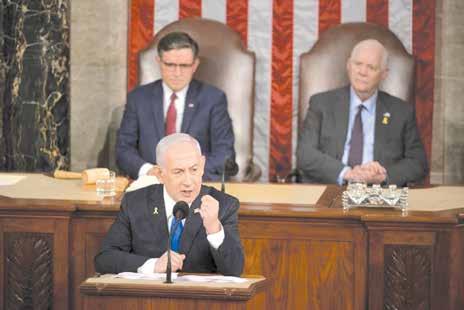
to join this alliance. We saw a glimpse of that potential alliance on April 14 . Led by the United States, more than half a dozen nations worked alongside Israel to help neutralize hundreds of missiles and drones launched by Iran against us. …
“The new alliance I envision would be a natural extension of the groundbreaking Abraham Accords. Those accords saw peace forged between Israel and four Arab countries, and they were supported by Republicans and Democrats alike.
“I have a name for this new alliance. I think we should call it: ‘The Abraham Alliance.’”
On the face of things, since both Republicans and Democrats have played a role in forging the alliance –former President Donald Trump through the 2020 Abraham Accords, and President Joe Biden by organizing the Arab states in support of intercepting Iran’s missiles and drones shot against Israel on April 14 – Netanyahu’s vision ought to attract support from both sides of the aisle. The problem is that Trump and Biden view
their regional alliance as a means to achieve opposite ends.
Biden’s actions in the region are a continuation of those initiated by former President Barack Obama, and to understand his policies, they must be viewed in the context of Obama’s policies.
Obama’s predecessors hoped to buy off Iran with a “grand bargain” that could moderate its policies. That is, they believed Iran should change. In contrast, Obama believed that the United States should change.
Obama’s foreign policy was predicated on his anti-imperialist worldview. Guided by its principles of Western culpability for the pathologies of the Middle East, Obama believed that Iran’s hostility towards America was justified. As he saw things, it was up to the United States to make amends to Iran by changing the way it operated in the Middle East.
To accomplish this goal, Obama began realigning the United States towards Iran and its Sunni allies in the Muslim Brotherhood at the expense of Israel and
America’s traditional Sunni Arab allies.
Obama’s betrayal of both Israel and the Sunni Arabs brought the long-estranged neighbors together. The Israeli-Sunni partnership was first brought to bear in the 2014 Hamas war (“Operation Protective Edge”) against Israel. Obama sided with Hamas’s state sponsors Qatar and Turkey and insisted that Israel accept the terror regime’s ceasefire demands. Supported by Egypt, Saudi Arabia and the United Arab Emirates, Netanyahu was able to withstand Obama’s pressure. The true birth of the Abraham alliance then, came without U.S. involvement, in response to the U.S.’s betrayal of Israel and the Sunni Arabs under the Obama administration.
When Trump came into office, he abandoned Obama’s realignment and sought to rebuild America’s credibility in the eyes of its allies. To this end, Trump embraced the new Israeli-Sunni partnership, using it as a means to rebuild U.S. credibility and reassert U.S. regional leadership.
Trump envisioned a regional partnership where, supported by U.S. military equipment, intelligence and diplomatic support, U.S. allies led by Israel and Saudi Arabia would combat Iran on their own. America wouldn’t fight the wars of the region for its allies, but it also wouldn’t second guess its actions in pursuit of the common goal of defeating the threat Iran posed to the region.
Trump’s defeat in 2020 blocked the full implementation of his vision. Biden for his part, used the alliance structure of the Abraham Accords that Trump created to reinstate Obama’s realignment policy. Biden returned the Palestinians to center stage and so blocked additional states including Indonesia and Saudi Arabia from normalizing relations with Israel.
Since Oct. 7, the administration has
used a combination of coercion and subversion to prevent Israel from taking decisive action against Iran and its proxies, particularly Hezbollah.
After Oct. 7, the administration denied Iran’s involvement in Hamas’s invasion of Israel despite overwhelming evidence that Tehran played a central role in planning and facilitating Hamas’s day of genocide.
On the ground, the U.S. has micromanaged, slowed, subverted and delegitimized Israel’s war in Gaza and blocked it from taking decisive action against Hezbollah, the Houthis or Iran.
The administration has embargoed and slow-walked weapons transfers to Israel to prevent it from defeating Hamas or moving to offense against Hezbollah. While preventing Israel from degrading Hezbollah’s capabilities, the administration has been working to strong-arm Israel into a deal with Iran’s terror army in Lebanon. The deal on the table would see Israel surrender its sovereign territory to Hezbollah in exchange for an unenforceable Hezbollah agreement to curtail its unprovoked attacks on Israel.
Vice President Kamala Harris has been the administration’s outspoken champion and full partner in Biden’s
pro-Iran policies. The Biden-Harris vision of a regional alliance is a consortium led by the U.S. in which the U.S. uses the Iranian threat against Israel and its Arab allies to compel them to make concessions to Iran.
Given the disparity between the purpose of a regional alliance for Trump on the one hand and Biden on the other, obviously, Israel would prefer to wait for Trump to return to office to act against Hezbollah and Iran. Unfortunately, it can’t wait. The threat is too severe and urgent. The Kuwaiti report itself would be a reason to act now. But when combined with Hezbollah’s conventional threat to northern Israel, time is of the essence.
With this in mind, Netanyahu’s call Wednesday for Washington to expedite the weapons shipments that Biden and Harris have stalled since December is noteworthy. One hopes Netanyahu’s call will be answered. But again, even if it isn’t, given the gravity of the threat, Israel will still have to take action.
Despite the magnitude of the undertaking required, there are reasons for cautious optimism. The approaching election will make it more difficult for Biden and Harris to stand in Israel’s way,

or punish Jerusalem if it acts.
Looking to his legacy, Biden may recognize that if he tries to block Israel from doing what it must, he will pay a price. Americans will not remember well a president who chose to shield Hezbollah from assault and so preserve its ability to destroy Israel.
In boycotting Netanyahu’s speech on Wednesday, Harris signaled that she remains loyal to her San Francisco base. But as the Democratic presidential nominee, if she alienates too many moderate Democrats and Independents, Trump will win.
If Israel acts – and Harris condemns it – or if the administration condemns Israel at the U.N. Security Council, the American public whose representatives in Congress gave Netanyahu 51 standing ovations will punish her.
On the other hand, Israel’s need to act largely alone won’t disappear even if Trump wins. True, Israel will likely act with U.S. support. But again, Trump’s vision of a regional alliance is one where the U.S. supports its allies as they defend themselves against Iran, not where the U.S. defends its allies from Iran for them.
So whether it is Biden, Harris or Trump in the White House, Israel will be
the primary force fighting Hezbollah and Iran. And if Israel doesn’t act now, it may find it impossible to act later.
Netanyahu spoke to Congress at a pivotal moment in regional, U.S. and world history. Hours after he spoke, as Biden was giving his speech abdicating his run for reelection and transferring the baton to Harris, the United States suffered a joint Russian-Chinese penetration of Alaskan airspace. That act of unprovoked aggression shows that months before voters go to the polls, America is facing the challenge of a new, daunting enemy alliance directed straight at U.S. power at home and abroad. More than ever, the United States requires allies capable of sharing the burden.
Netanyahu’s address was a stirring expression of Israel’s readiness to shoulder the burden of securing the Middle East from Iran and its proxies. In fact, after nine months of war, during which Israel has been demonized and criminalized for fighting what he rightly referred to as civilization’s war against barbarism, Netanyahu seized the reins of regional leadership of the war on Wednesday.
Having done so, given the threats, the time has arrived for him to lead Israel –and the free world – to victory. (JNS)

By Rafael Medoff
We’re accustomed to politicians courting the Black vote or the Jewish vote or the youth vote. But what about the antisemitic vote?
CNN correspondent John King asserted on July 21 that “there could be some risks” for Kamala Harris if she chooses Pennsylvania Governor Josh Shapiro as her running mate because “he’s Jewish.”
In other words, antisemitic voters would not cast their ballots for a Harris-Shapiro ticket. That may be true. The question is whether courting the votes of bigots should be an acceptable political strategy.
There was a time when America’s major political parties were reluctant to nominate a Catholic for president, for fear of alienating anti-Catholic voters. The Democrats shattered that taboo by nominating New York governor Al Smith for president in 1928.
But some prominent Democrats, including Franklin D. Roosevelt, continued to court the votes of other bigots. From loudly denying that he invited African-Americans to a 1929 luncheon to refusing to support anti-lynching legislation in the 1930s, FDR repeatedly sought to show white racists that he deserved their votes. So did Jimmy Carter, when he declared during the 1976 Democratic primaries that he supported the right of whites to safeguard the “ethnic purity” of their neighborhoods against the “intrusion of blacks” and other “alien groups.”
White racists were not the only bigots whose votes FDR courted. He was concerned about the antisemitic vote, too. The issue came up when FDR met privately with U.S. Senator Burton Wheeler (of Montana), one of his close political allies, on August 4, 1939. Wheeler’s confidential memo about the meeting, dictated to his secretary immediately afterwards, preserved the contents of their conversation.
The two discussed possible presidential candidates in the event that FDR decided not to run for re-election the following year. Among the names that came up

were Secretary of State Cordell Hull and Democratic Party chairman James Farley.
A Hull-Farley ticket “could not get elected,” the president claimed. The problem, Roosevelt and Wheeler agreed, was that “the Jewish-Catholic issue would be raised.” That was because Farley was Catholic and, as Wheeler put it, “Mrs. Hull is a Jewess.”
ident. It was not the first time FDR used that slur behind closed doors.
Franklin Roosevelt, like many politicians before and after him, was keenly attuned to the advantages of choosing candidates, or taking positions, that would appeal to particular segments of the voting populace – even if it meant excluding a possible candidate because
It implicitly justifies FDR’s decision to court the antisemitic vote.
FDR corrected him: “Mrs. Hull is about one-quarter Jewish.” (They were both wrong: her father was Jewish.) The president continued: “You and I, Burt, are old English and Dutch stock. We know who our ancestors are. We know there is no Jewish blood in our veins, but a lot of these people do not know whether there is Jewish blood in their veins or not.”
According to Senator Wheeler’s memo, the conversation also included a casual use of the n-word by the pres -
antisemitic voters might disapprove of his wife’s ancestry.
The prevalence of antisemitism in American society in the 1930s sometimes is cited as the reason for Roosevelt’s policy of suppressing Jewish refugee immigration far below the limits allowed by law. Ken Burns made that argument in his Holocaust film a few years ago.
But that excuse ignores the fact that if FDR had just permitted the existing immigration quotas to be filled—without
liberalizing the immigration system itself—many Jewish refugees could have been saved. More than 190,000 quota places from Germany and German-occupied countries were left unused from 1933 to 1945.
The claim that antisemitism in American society tied FDR’s hands on immigration is not merely a misunderstanding of Roosevelt’s policy options; it’s also a way of saying that the president understandably adopted a policy of reducing Jewish immigration in order to avoid alienating anti-Jewish voters. It implicitly justifies FDR’s decision to court the antisemitic vote.
The Democrats’ nomination of Sen. Joseph Lieberman for vice president in 2000 should have put an end to the old policy of courting antisemitic votes. But a new constituency of antisemitic voters has arisen during the past year – the pro-Hamas protesters who have been using “Zionist” as a codeword for Jew, who have been brandishing signs calling for a “Final Solution,” and who have been celebrating the October 7 attacks, celebrations that President Joe Biden recently characterized as antisemitic.
Those voters are the ones whom CNN’s John King evidently had in mind when he warned of the “risk” of nominating a Jew for vice president. That risk is real – but the Democrats should ignore it, because pursuing the votes of antisemites and other racists is wrong. It gives legitimacy to dangerous extremists who should be kept on the margins of society, not treated as a legitimate part of mainstream American political culture. Bigots deserve to be ostracized, not courted.
Dr. Medoff is founding director of The David S. Wyman Institute for Holocaust Studies and author of more than 20 books about Jewish history and the Holocaust. His latest is America and the Holocaust: A Documentary History, published by the Jewish Publication Society & University of Nebraska Press.
The Battles of Britain, Stalingrad and the Bulge are just a few of many battles of World War II that were close calls. Additionally, there were smaller battles in the air and on the seas in which service members were fighting for survival and somehow beat the odds. Not all battles ended in victory, though. Then there are stories of individuals who, despite the odds that they were up against, managed to survive. From a bullet or shrapnel barely missing the mark to moving out of the way just in time, these are some of their incredible stories of close calls.
In early December 1941, Jewish soldier Howard Sandler was assigned to the USS Arizona when it was docked at Pearl Harbor, Hawaii. On December 6, he was posted to shore duties. The next day, the Japanese attacked the harbor and its installations, and Sandler was hit while on shore. He almost lost his arm as it required immediate surgery to save his limb. Despite his wounds, Sandler survived the attack. Most of the sailors and service members aboard the USS Arizona were killed in the Japanese surprise attack. Sandler had just been on the ship the day before; the shore posting saved his life.
The exact origins of the saying “there are no atheists in foxholes” is debated, but it started sometime during World War II. The military phrase is used to describe someone finding a higher purpose in life while the enemy is attacking on the battlefield. There are many stories of religious articles saving soldiers’ lives.
By Avi Heiligman


Isadore Harnoff, Albert Simon and Bernard Erstein were three Jewish servicemen who were saved by carrying a siddur with them on the battlefield.
One of the many bitter battles after the D-Day landings was the Battle of the Hurtgen Forest in Germany. It took place from September to December 1944 and cost the Americans dearly in terms of men killed and wounded. Artillery strikes were particularly deadly as they sent shrapnel into the air and caused devastation when the shells hit trees. Private First Class Isadore Harnoff of Albany, New York, was hit by shrapnel. Pieces of the shell hit his breast pocket and pierced the Jewish Welfare Board calendar he had been carrying cover to cover. According to reports, he had a prayer book behind the calendar where the piece of shrapnel was found. The shrapnel was just inches away from hitting his heart, but the Jewish soldier amazingly survived the incident unscathed.
The air war over Europe and Japanese-held territory lasted for most of the duration of the war. Long-range four-engine bombers in large formation brought devastation to enemy facilities like arms factories, fuel depots and other strategic targets. Axis powers used fighters and anti-aircraft guns to bring a stop to the bombers. Flak cannons would release metal fragments at altitude that could cause major damage to Allied bombers.
Lieutenant Albert Simon from Newark, New Jersey, was the navigator on a
B-17 Flying Fortress with the 359th Bombardment Squadron. On a mission over Germany, flak came through the nose of the bomber and settled right into his abdomen. Despite being rocked from the impact, Simon continued at his post until the plane landed back at base. Upon further inspection, it was discovered that the flak fragment went through his flight jacket and heavy clothes. However, his only bodily wound was a skin bruise. The fragment had been stopped by an object just before it reached an artery that could have cost him his life. That object was a siddur.
Medics often put themselves into harm’s way while treating wounded soldiers on the battlefield. Brooklyn native Private First Class Bernard Erstein fought with the American army in North Africa and Sicily. A few weeks after the D-Day landings, he was with the army in St. Lo, France, treating a wounded soldier. A shell burst in the vicinity, and as he tried to stand up, he collapsed. Blood was coming out of his chest area, and he was immediately evacuated. During surgery, doctors removed a two-inch shell fragment along with several pieces of paper. The small pieces of paper came from a siddur that he always carried with him; he was certain that if the siddur hadn’t been there to slow down the fragment, he would have been killed.
There are many other similar stories. Jewish rifleman Louis Rublin from Rockaway Beach, New York, was with the 87 th Infantry Division. On the first day of
combat in France, he discovered that a bullet had gone through the front of his overcoat. A second bullet went through his backpack while he was standing sideways aiming his rifle. Rublin himself came through the day unscathed.
Later that day, Rublin and a buddy became separated from the rest of their unit and managed to capture two German soldiers. He explained what happened next: “All of a sudden, we were being shot at from all directions while we were exposed in a clearing on top of this hill. A second personal miracle took place when the shooting stopped after I waved bandage gauze in the air in desperation. The two of us quickly moved back towards the rear of our lines, with our two prisoners.” They then encountered one of their sergeants lying on the ground with a knee wound. Together with the German prisoners, the four of them carried the sergeant to an area where he would receive medical attention.
Throughout history, servicemen and women have had many close calls while in battle. These Forgotten Heroes stories are just some of the many of those who fought some of the toughest battles in military history and survived in miraculous ways.
Avi Heiligman is a weekly contributor to The Jewish Home. He welcomes your comments and suggestions for future columns and can be reached at aviheiligman@gmail.com.
MAJOR APPLIANCE REPAIR
Servicing Washers , Dryers , Refrigerators , Dishwasher, stoves
All work guaranteed. Call 718 3762288
VACUUM SALES AND REPAIR
All areas call Max Flam 718-444-4904
THE LEATHER SHOPPE
The spot for all your custom leather Judaica. Tallis/tefillin bags, lulav and esrog bags, havdallah sets, challah covers, shtenders, pesach sets, matzah/afikomen bags. WhatsApp: (732) 523-0007 or email: theleathershoppe732@gmail.com for a full catalog. We ship.
MY MOTTO IS DON’T WAIT TO buy real estate
Buy real estate and wait Your realtor for life 516-784-0856 Alexandra at Realty Connect USA
PEACEFUL PRESENCE STUDIO
Men’s private yoga, Licensed Massage & Holistic Health Guidance 436 Central Ave, Cedarhurst Info. & free video training www.peacefulpresence.com 516-371-3715
GERBER MOVING
FULL SERVICE MOVING Packing Moving Supplies
Local Long Distance. Licensed Insured 1000’S Of Happy Customers Call Shalom 347-276-7422
HANDYMAN AVAILABLE
For big or small jobs, Sheetrock, carpentry, painting, electrical, plumbing, install & repair appliances Call Ephraim at 347-593-4691
MANAGEMENT STAFF WILL ASSIST
you with:
* Obtaining Medicaid and Pooled Income Trust
* In-home Assessments, Individual and Family Counseling
* Securing reliable home care assistance
* Case and Care Management services
Dr. S. Sasson, DSW, LCSW (718) 544- 0870 or (646) 284-6242
HAIR COURSE:
Learn how to wash & style hair & wigs. Hair and wig cutting, wedding styling Private lessons or in a group Call Chaya 718-715-9009
ZEVIZZ WOODTURNING JUDAICA Challah knifes, batei mezuzah, besamim holder, kiddish cups, havdalah candle holders, yad for sefer torah, pens, stenders, bowls and more 952-356-2228

DON’T GET STUCK WITH A TWO STORY HOUSE YA KNOW, IT’S ONE STORY BEFORE YOU BUY IT BUT A SECOND STORY AFTER YOU OWN IT! Call Dov Herman For An Accurate Unbiased Home Inspection
Infrared - Termite Inspection Full Report All Included NYC 718-INSPECT
Long Island 516-INSPECT www.nyinspect.com
750 University Street North Woodmere, NY Large 4 bedroom, 3 bath home. Large EIK, CAC, Nice property, move in condition. Mother/Daughter with proper permits. Very low taxes. Close to all.
Sunday August 4th between 12PM-2PM
Julia Stevens Realty 516-295-1454
WOODMERE
Introducing a stunning 14-side hall colonial home in the Hewlett Woodmere School District. Formal living room, formal dining room, den with a skylight. Eat in Kitchen, two sinks, a double oven, a warming draw and a microwave. First floor bedroom, a full bathroom and laundry room. Two-car garage. Upper level has four bedrooms, two full bathrooms. Finished basement with playroom, storage and utilities. Well-groomed exterior with porch adjoining the master bedroom. Hardwood floors and back patio. Central air conditioning, inground sprinkler system, alarm system. Close proximity to schools, shopping centers, restaurants, and transportation options. Mark Lipner Associate Broker Berkshire Hathaway Laffey International 516-298-8457 mlipner@bhhslaffey.com
WOODMERE
Beautiful, brick, colonial boasting 5 bdr 3.5 Bth in pristine condition. Excellent location, near all! Move right in! RCUSA 516-512-9626

CAN’T AFFORD YOUR PROPERTY TAXES?
MORTGAGE?
Must sell for any reason? Call for FREE Consultation. Call now 212-470-3856 Cash buyers available!
Spacious home within school district 14 with exquisite upgrades and central air conditioning, splendid kitchen with dual sinks, five bedrooms. Main level encompasses a spacious great room, office space, complementing the formal living and dining areas. Unfinished basement, detached garage. Expansive lot, measuring 80 x 100. Conveniently located near shopping, railroad, restaurants and places of worship.
Mark Lipner Associate Broker Berkshire Hathaway Laffey International 516-298-8457 mlipner@bhhslaffey.com
Don’t miss this opportunity!
4 Bedroom 21/2 Bathroom House Perfectly located in Cedar Bay Park, walking distance to all. Oversized property for expansion, A Must See. LOCATION, LOCATION. For More Info call (516) 881-7727 Leave Message
Entrance off gourmet glatt lot, second floor, shared bath, ideal for therapist/ office work, includes utilities, $600. Call 516-371-3715
5 TOWNS — OFFICES FOR LEASE
Attractive Pricing! 1500sf loft office (formerly SDF Architect) Cedarhurst 2&3 Office Suites Store/office; ~600sf Cedarhurst office ~100sf Also… Large Parking Lot & Storage available Utilities, Internet & Parking incl. with some Kosher kitchen — Minyan Next to LIRR — No broker fee Call/text/Whatsapp: 516-206-1100

BIG FULLY RENOVATED, Woodmere, spacious 4bedroom 2 full bath split level.2 car garage +driveway. Backyard on water SD#14. W&D. Tons of storage space. 347-517-3552
HEAD ENGLISH, AFTERNOON Teaching Position Zareinu is hiring for the 24-25 school year. Looking for a qualified teacher to teach a modified English curriculum! for a small group of 3rd grade girls in Far Rockaway. Great Pay! Warm environment! Great administrative support! Email resume: jlepolstat@zareinu.org or call 516-993-2142
SEEKING SETSS PROVIDER 2024-25 High school girls yeshiva. Experience with high school curriculum and connecting with this demographic required. FT, Forest Hills, Queens Email aklaver@aylondon.com
SEEKING ELA TEACHER
Teaching position for Gr. 6. Mon.-Thurs., afternoon hours. Far Rockaway/5T area. Great salary, warm, supportive environment. Training in our curriculum is provided. Teachersearch11@gmail.com
FULL TIME ADMINISTRATIVE
Assistant Join the Zareinu team! Seeking a detail-oriented individual Will provide support to our administration, staff and parent body. Responsibilities: managing office tasks, setting up appointments, maintaining records, and assisting with communication between our staff and with the different schools that host Zareinu. Strong communication and computer skills. Competitive salary!! RSVP: jlepolstat@zareinu.org













Assistant Teachers Needed in Lawrence for Fall, 2024
The Gural JCC Early Childhood Center is hiring Assistant Teachers for the 2024-2025 school year.
Please send resumes to JCC.Nursery@guraljcc.org or call (516) 239-1354
Tutoring regents in Algebra and Geometry A Darchei Torah instructor. Guaranteed results Text 347-491-8045 WhatsApp 347-767-1755
SEEKING ASSISTANT
teachers for elementary General Studies classes for ‘24-’25 school year. Candidates should have skills to take over for teachers if needed. M-Th, PM hours, strong support. Far Rockaway area. Send resume to teachersearch11@gmail.com
BOOKKEEPER
Excellent growth potential, Frum environment, Excellent salary & benefits. Email resume to: resumetfs1@gmail.com
DELIVERY PERSON NEEDED to deliver this Newspaper every Thursday morning to locations in Brooklyn. Must have Mini van or SUVand availability to work Consistently every week. Good pay Please email gabe@ fivetownsjewishhome.com or call (917) 299-8082

Must know how to use Mac and work on Mac. knowledgeable in Adobe, illustrator, in design, and Photoshop. Part-time job 15 to 20 hours a week. must come into our office and Flatbush for interview. Email résumé to graphicdesigner613@gmail.com. For more info, please call: 9177018012
5 Towns area Nursing Home management office seeking a Regional/Corporate level MDS Nurse to work in our office. Must be an RN. Regional experience preferred. 2-3 years MDS experience with good computer skills required. Position is Full Time but Part Time can be considered. Great Shomer Shabbos environment with some remote options as well. Email: officejob2019@gmail.com
HEAD ENGLISH, AFTERNOON Teaching Position
Zareinu is hiring for the 24-25 school year. Looking for a qualified teacher to teach a modified English curriculum! for a small group of 4th and 5th grade girls in Far Rockaway. Great Pay! Warm environment! Great administrative support! Email resume: jlepolstat@zareinu.org or call 516-993-2142
HEAD MORAH, MORNING POSITION Zareinu is hiring for the 24-25 school year. Looking for a qualified head Morah afternoon position! Looking for a qualified teacher to teach a modified Limudie Kodesh curriculum. for a small group of 4th and 5th grade girls. Great Pay! Warm environment! Great administrative support! Email resume: jlepolstat@zareinu.org or call 516-993-2142
classifieds@fivetownsjewishhome.com • text 443-929-4003
KINDERGARTEN TEACHER POSITION:
Seeking a warm and dedicated morah for the upcoming school year. Collaborative and supportive environment. Please email resume to preschool@ykli.org
ASSISTANT TEACHER, MORNING and Afternoon Positions
Join our Specialized team at Zareinu. Looking for a warm and caring teacher assistant to work with an experienced teacher in a small 3rd and 4th grade girls’ class in a Beis Yaakov in Far Rockaway. Great Pay! Great Opportunity! Warm environment with administrative support! Email resume: jlepolstat@zareinu.org or call 516-993-2142
A multi-tasker needed for general office work. The ideal candidate is someone who is detail-oriented, responsible, and can take ownership. Looking for someone who is eager to learn, and expand his/her skill set while possessing the ability to work independently and as part of a team.
Experience with Excel required. Five Towns location. In-office position only, not remote. Please send resume to 5tpart.timecareer@gmail.com
SEEKING SETSS PROVIDER 2024-25 Junior High boys yeshiva. Experience with middle school curriculum and connecting with this demographic required. FT, Forest Hills, Queens Email aklaver@aylondon.com
A YESHIVA IN QUEENS is looking for an experienced part/ full time secretary, 2-year-old morah, kindergarten morah, kindergarten morah assistant and Pre-1A English teacher for the 2022-2023 school year. Nice and timely pay. Please email resume to mshelt613@gmail.com or call/text 718-971-9799.
5 TOWNS BOYS YESHIVA
Seeking Elem Gen Ed Teachers Excellent working environment and pay. Only lic/exp need apply. Email resume to yeshivalooking@gmail.com
YESHIVAT KOL YAAKOV
In Great Neck, NY, is seeking general studies teachers for both the elementary and middle schools, for the upcoming academic year. Mon-Thur afternoons. Competitive salary, warm and supportive environment. Send resume to m.kalati@kolyaakov.org
NEFESH MATCHMAKING
(Chesed) Free Shadchan service for the special needs community. We help those with Medical, Physical, Emotional or Intellectual challenges find their spouse. Strictly confidential. Email for more info. Nefesh.matchmaking@gmail.com
SHMIRAS HALASHON
Text 516-303-3868 with a time slot of your choice to be careful on lashon hara. Be a part of the 1,000 people for klal yisroel!

